
100+ Space Research Topics [Updated]

Space has always attracted humanity’s imagination. The vastness of the cosmos, with its twinkling stars, mysterious planets, and enigmatic black holes, beckons us to explore its depths. But why do we study space? What are the research topics that drive scientists to reach for the stars? In this blog, we’ll delve into the fascinating world of space research topics, exploring key topics that continue to inspire and challenge researchers around the globe.
Why Do We Study Space?
Table of Contents
Here are some key points explaining why we study space:
- Understanding our Origins: Space research helps us uncover the origins of the universe, including how galaxies, stars, and planets formed.
- Advancing Scientific Knowledge: Studying space leads to breakthroughs in physics, astronomy, and other scientific fields, expanding our understanding of the cosmos.
- Technological Innovation: Space exploration drives the development of new technologies, such as satellite communication and medical imaging, benefiting society as a whole.
- Exploration and Discovery: Humans are inherently curious, and space offers a vast frontier for exploration, fueling our desire to discover new worlds and phenomena.
- Earth Observation: Space-based observations provide valuable data on Earth’s climate, weather patterns, and environmental changes, aiding in disaster management and conservation efforts.
- Search for Life: Investigating other planets and celestial bodies helps us understand the conditions necessary for life, potentially leading to the discovery of extraterrestrial life forms.
- Inspiration and Education: Space exploration inspires future generations of scientists, engineers, and explorers, fostering innovation and curiosity about the universe.
100+ Space Research Topics: Category Wise
Astronomy and astrophysics.
- Exoplanet detection methods and recent discoveries
- The life cycle of stars: from birth to death
- Supermassive black holes and their role in galaxy formation
- Gravitational waves: detection and implications
- Dark matter and dark energy: understanding the mysteries of the universe
- Supernovae explosions: studying the aftermath of stellar deaths
- Galactic dynamics: exploring the structure and evolution of galaxies
- Cosmic microwave background radiation: insights into the early universe
- Gamma-ray bursts: uncovering the most energetic explosions in the cosmos
- The search for extrasolar planets with potential habitable conditions
Planetary Science
- Martian geology and the search for signs of past life
- Jupiter’s Great Red Spot: dynamics and longevity
- Saturn’s rings: composition, structure, and origin
- Lunar exploration: past missions and future prospects
- Venusian atmosphere: understanding the greenhouse effect and extreme conditions
- Io, Europa, Ganymede, and Callisto: Jupiter’s diverse moons
- Titan: Saturn’s moon with an Earth-like atmosphere and hydrocarbon lakes
- The Kuiper Belt and Oort Cloud: reservoirs of comets and icy bodies
- Dwarf planets: Pluto, Eris, Haumea, Makemake, and Ceres
- Planetary volcanism: processes and consequences on various celestial bodies
Space Technology and Engineering
- Satellite constellations for global internet coverage
- CubeSats: miniaturized satellites for scientific research and technology demonstration
- Space debris mitigation strategies and technologies
- Ion propulsion systems: efficient propulsion for deep space missions
- Space telescopes: next-generation observatories for astronomy and astrophysics
- Space-based solar power: harvesting solar energy in orbit
- Asteroid mining: extracting resources from near-Earth objects
- In-situ resource utilization on other planets and moons
- Additive manufacturing (3D printing) in space exploration
- Autonomous spacecraft navigation and control for long-duration missions
Astrobiology and the Search for Life
- Extremophiles: organisms thriving in extreme environments on Earth and their implications for extraterrestrial life
- Biosignatures: markers of past or present life on other planets
- Methanogenesis on Mars: potential evidence for subsurface microbial life
- Europa’s subsurface ocean: exploring the possibility of life beneath the ice
- Enceladus: hydrothermal vents and the search for life in its subsurface ocean
- The habitability of exoplanets: assessing conditions for life beyond the solar system
- Panspermia: the transfer of life between celestial bodies
- Astrobiology field research in extreme environments on Earth
- SETI: the search for extraterrestrial intelligence and communication
- The implications of discovering microbial life on Mars or other celestial bodies
Space Policy and Ethics
- International collaboration in space exploration and research
- The Outer Space Treaty: principles governing the use of outer space
- Space tourism regulations and safety considerations
- Space law and jurisdiction: legal frameworks for activities in space
- Military applications of space technology and potential arms race in space
- Space resource utilization and ownership rights
- Space environmentalism: advocating for the protection of celestial bodies and their environments
- Space colonization ethics and implications for human societies
- Space governance beyond national boundaries
- Cultural heritage preservation on the Moon and other celestial bodies
Challenges and Future Directions
- Funding challenges and opportunities in space research and exploration
- Space radiation hazards and mitigation strategies for astronauts
- Interplanetary communication and navigation for deep space missions
- Long-duration spaceflight: physiological and psychological effects on astronauts
- Terraforming Mars: engineering a habitable environment on the Red Planet
- Space elevator concept: a revolutionary approach to space access
- Next-generation space launch vehicles and propulsion technologies
- Nuclear propulsion for crewed missions to Mars and beyond
- Space settlement design and infrastructure requirements
- Advancing artificial intelligence and robotics for autonomous space exploration
Space Weather and Space Environment
- Solar flares and coronal mass ejections: impacts on Earth’s magnetosphere and technology
- Space weather forecasting and its applications in satellite operations
- Magnetospheres of Earth and other planets: comparative studies and dynamics
- Solar wind interactions with planetary atmospheres and magnetospheres
- Aurora phenomena on Earth and other planets
- Radiation belts: understanding and mitigating hazards for spacecraft and astronauts
- Cosmic rays: sources, composition, and effects on space missions
- Space climate change: long-term variations in solar activity and their consequences
- Space weather effects on satellite communications, navigation, and power systems
- Space weather monitoring and prediction networks
Space Exploration and Missions
- Mars Sample Return mission: challenges and scientific objectives
- Artemis program: NASA’s plans for returning astronauts to the Moon
- Asteroid impact mitigation strategies and planetary defense initiatives
- The James Webb Space Telescope: capabilities and scientific goals
- Europa Clipper mission: exploring Jupiter’s icy moon for signs of habitability
- China’s Chang’e lunar exploration program: past achievements and future missions
- Commercial crew and cargo transportation to the International Space Station
- Voyager and Pioneer missions: the farthest human-made objects in space
- Space missions to study near-Earth objects and potential asteroid mining targets
- International Mars exploration collaborations and missions
Space Communication and Navigation
- Deep space communication networks and relay satellites
- Laser communication technology for high-speed data transmission in space
- Satellite-based navigation systems: GPS, Galileo, and GLONASS
- Interplanetary Internet: protocols and architectures for space communications
- Radio astronomy and interferometry: probing the universe with radio waves
- Quantum communication in space: secure and ultra-fast communication channels
- Delay-tolerant networking for deep space missions
- Autonomous navigation systems for spacecraft and rovers
- Optical communications for small satellites and CubeSats
- Space-to-ground communication systems for remote sensing and Earth observation satellites
Space Medicine and Human Spaceflight
- Microgravity effects on human physiology and health
- Countermeasures for mitigating bone and muscle loss in space
- Psychological challenges of long-duration space missions
- Space food technology: nutrition and sustainability in space
- Medical emergencies in space: protocols and procedures for astronaut health care
- Radiation shielding and protection for crewed missions beyond Earth orbit
- Sleep and circadian rhythms in space: optimizing astronaut performance
- Artificial gravity concepts for maintaining crew health on long-duration missions
- Telemedicine applications for space exploration missions
- Bioastronautics research: advancing human spaceflight capabilities and safety
Space Industry and Commercialization
- NewSpace companies: the rise of private space exploration ventures
- Satellite constellation deployments for global internet coverage
- Space tourism: opportunities, challenges, and market trends
- Commercial spaceports and launch facilities around the world
- Space manufacturing and in-space assembly techniques
Tips To Write Space Research Papers
Crafting space research papers can be a thrilling and fulfilling pursuit, yet it demands meticulous planning and implementation to guarantee that your efforts effectively convey your discoveries and make meaningful contributions to the discipline. Here are some tips to help you write space research papers:
- Choose a Narrow Topic: Space is a vast field with numerous sub-disciplines. Narrow down your topic to something specific and manageable, ensuring that it aligns with your interests and expertise.
- Conduct Thorough Research: Before you start writing, immerse yourself in the existing literature on your chosen topic. Familiarize yourself with key concepts, theories, and recent discoveries to provide context for your research.
- Develop a Clear Thesis Statement: Define the central argument or hypothesis of your paper in a concise and focused thesis statement. This statement should guide your writing and serve as the foundation for your research.
- Outline Your Paper: Create a detailed outline outlining the structure of your paper, including the introduction, literature review, results, and conclusion sections. This will help you organize your thoughts and ensure that your paper flows logically.
- Write a Compelling Introduction: Begin your paper with a captivating introduction that offers context about your subject, underscores its importance, and delineates the paper’s framework . Grab the reader’s interest and inspire them to delve further into your work.
- Provide a Comprehensive Literature Review: Synthesize the existing research on your topic in a literature review section. Examine pertinent research, theories, methodologies, and results, pinpointing any disparities or deficiencies in the existing literature that your study seeks to rectify.
- Detail Your Methodology: Describe the methods you used to conduct your research, including data collection, analysis, and interpretation techniques. Provide enough detail for readers to understand how your study was conducted and to evaluate its validity and reliability.
- Present Your Results Clearly: Present your research findings in a clear, concise manner, using tables, figures, and charts to illustrate key data points. Interpret your results objectively and discuss their implications in relation to your research question or hypothesis.
- Engage in Critical Analysis: Analyze your findings in the context of existing literature, discussing their significance, strengths, limitations, and potential implications for future research. Be critical and objective in your evaluation, acknowledging any potential biases or limitations in your study.
- Craft a Strong Conclusion: Summarize the main findings of your research and reiterate their significance in the conclusion section. Discuss any implications for theory, practice, or policy and suggest avenues for future research.
- Proofread and Revise: Before submitting your paper, carefully proofread it for spelling, grammar, and punctuation errors. Edit your writing to ensure clarity, coherence, and consistency, guaranteeing that your points are adequately backed and logically organized.
- Follow Formatting Guidelines: Follow the formatting instructions provided by the journal or conference to which you intend to submit your paper. Pay attention to details such as font size, margins, citation style, and reference formatting to ensure that your paper meets the publication requirements.
Space research offers a window into the vastness of the cosmos, revealing the beauty and complexity of the universe we inhabit. From the depths of space to the surfaces of distant planets, scientists are uncovering new wonders and answering age-old questions about our place in the universe. As we look to the stars, let us be inspired by the spirit of exploration and discovery that drives humanity ever onward, towards new horizons and unknown worlds. I hope you find the best space research topics from the above list.
Related Posts

Step by Step Guide on The Best Way to Finance Car

The Best Way on How to Get Fund For Business to Grow it Efficiently
Custom Essay, Term Paper & Research paper writing services
- testimonials
Toll Free: +1 (888) 354-4744
Email: [email protected]
Writing custom essays & research papers since 2008
154 hot astronomy research topics for a-grade papers.
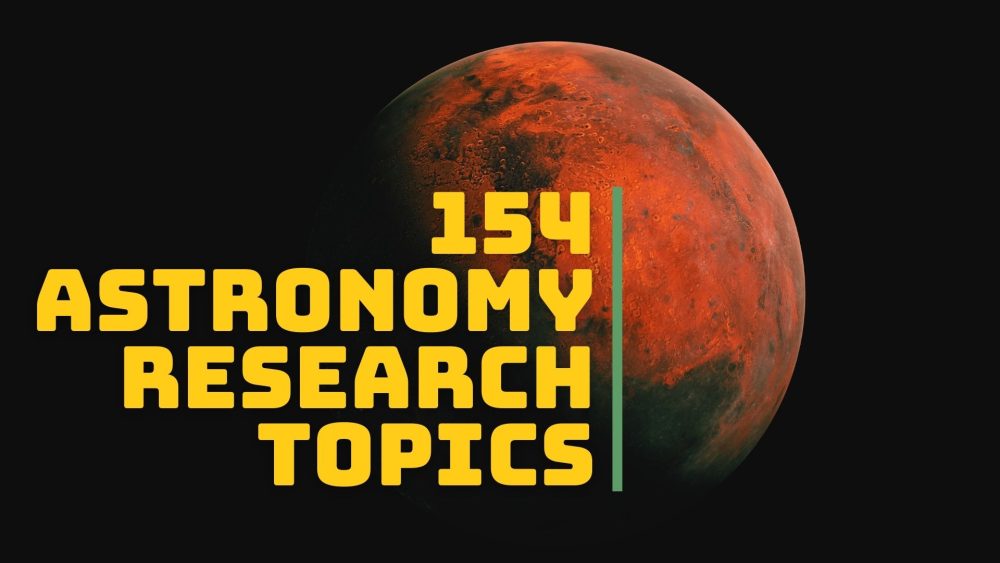
Do you have a college astronomy paper or essay and have been wondering how to get the best topic? You might also be stuck with the paper, wondering how to go about it.
The truth about astronomy is that getting interesting space topics is never easy, but how do you address the challenge? There is no need to worry anymore because we are here to help.
In this post, we list 154 astronomy paper topics and further highlight the traits of a great research paper. Why get content with standard or low-quality paper when you can get the best in your class by checking out the guide and topics, as well as getting lab report help ?
What Is Astronomy?
Before looking at the leading space science topics for your university assignment, let’s start with the definition. Astronomy is the study concerned with researching and understanding everything that takes place beyond the earth’s atmosphere. Although the advances in technology, especially on telescopes, satellites, and manned space vehicles, have helped people to peep deeper into space, this is just a scratch on the surface. There is a lot more waiting to be explored, including the controversial question, “Is there life on other planets?”
Characteristics Of A Good Astronomy Research Paper
From the definition of astronomy, it is clear that you can have a long list of astronomy project topics or ideas. Once you have picked the preferred option from our research topics in cosmology, the next step is preparing your paper. Here are the main characteristics of a good school research paper in astronomy:
- Systematic: This means that your research paper should be structured per clearly defined rules. So, students should start by reviewing requirements by their professors or teachers and think creatively of how to make their papers professional.
- Logical: This implies that the student carefully reasons all the points to ensure they support the selected topic. Although there is so much one can write on a specific topic, you must narrow it down to those points that are current and that support your topic.
- Comprehensive: Your paper also needs to be as comprehensive as possible. So, you must exhaustively identify the core points in a selected topic. It should also fit well in the current literature on the same topic, helping to advance the discipline.
- Plagiarism-Free: All universities out there have very strict rules on plagiarism. Therefore, your work must be 100% original.
- Clearly flowing points and free from errors: Finally, your paper should be arranged well to ensure that all the points flow logically from the start to the end. Again, it should be proofread to ensure it is free from errors.
Best Astronomy Essay Topics
Now that we have looked at the main characteristics of a high quality astronomy paper or essay, it is time to dig deeper into the main topics. Check out our list of the leading astronomy research topics for top grades.
Top Astronomy Research Topics
- What is the future of space exploration?
- A closer review of the big bang theory.
- Compare two theories that explain the origin of the universe.
- Stephen Hawking theories.
- Space Challenger disaster: What are the sociological impacts?
- A review of the recent space exploration breakthroughs.
- The moon landing.
- The Mars landing of space rovers.
- A deeper look at the history of astronomy.
- Reviewing the heliocentric model of the galaxy.
- Analyzing the lifecycle of a star.
- What impact does the moon have on the earth?
- Space debris and its impact on the solar system.
- What impact do humans have on the solar system?
- The rise of space tourism: What impact will it have on space exploration?
- Is space tourism a good thing?
- What could go wrong with space tourism?
- Space manufacturing: Is it a good thing?
- The mythologies associated with heavenly bodies.
- What impact do the stars have on earth?
Unique Astronomy Research Paper Topics
- A review of the Hubble telescope.
- A closer look at the Haley’s comet.
- Through the mind of early astronomers: Galileo Aristotle, and Ptolemy.
- What are the advantages of exploring space?
- The race to explore space and the cold war.
- Reviewing the first astronauts to visit the moon.
- What lessons did NASA learn from its first mission to the moon?
- Can life exist on the moon?
- What is the biggest difference between earth and moon?
- Explaining the earth’s outlook as viewed from space.
- The design of space vehicles: Are the modern models riskier compared to those used in the 20th century?
- What impact will private companies like SpaceX and Blue Origin have in astronomy?
- If we have a space station where scientists travel often, is the idea of space hotels far-fetched? A closer look at Blue Origin’s idea of a space hotel.
- Looking beyond the Milky Way.
- A review of Pluto: How does it compare to other planets?
- How does earth compare to Jupiter?
- Explain the sun’s source of heat and light for millions of years.
- Analyzing the rings of Saturn.
- A review of astronauts physical and health preparedness before setting off for space exploration.
- What effects does long stay in space have on the human body?
- What can astronauts do to reduce the danger of muscle atrophy?
- Zero gravity in space.
Awesome Astronomy Topics To Write About
- What are wormholes?
- A review of the evolution of space exploration changes in history.
- Speed of light travel: what are the implications?
- A closer look at time travel: Theory versus fiction.
- Zero gravity: What impact does it have on astronauts’ health over time?
- The interdisciplinary perspectives of space.
- Astrophysics: A review of the main controversies.
- Explore the possibility of having life on other planets.
- What implications would life on other planets have on planet earth?
- Think of yourself as an astronaut: What would be your reaction upon encounter with aliens?
- Stars and how people use them for navigation.
- Comparing different theories that explain the origin of life on planet earth.
- Space weather.
- How does space weather compare to the earth’s weather?
- Global warming: An astronaut’s view.
- The sun and its relationship with the earth.
- Comparing the sun’s relationship with Saturn and Pluto.
- Robotic space exploration: Is it a good idea?
- Constellations: A review of human interpretations.
- A review of emerging business opportunities in space.
- Space travel for non-astronauts: Is it a good idea?
- Comparing space travelling scientists to tourists: What is the difference?
Engaging Space Research Paper Topics
- What is the difference between planets and asteroids?
- How did the “northern lights” come about?
- Capture hypothesis: A review.
- What caused the Challenger to explode after take-off?
- The challenger shuttle disaster: A review of the preparations.
- What lessons did we learn from the challenger disaster?
- Was the Challenger the greatest failure in NASA’s history?
- Analyzing President Ronald Reagan’s speech after the Challenger disaster.
- Space Challenger disaster analysis: Why we are on the blink of another bigger and deadlier disaster.
- Are the current space policies ample to guide the new era of space travel?
- Dennis Tito: Looking at the experience of the first space tourists.
- Space politics: Is competition a good thing when it comes to space exploration?
- Reimagining the space: What would happen if we suddenly discovered that it was possible to inhabit the moon?
- Space will form the next generation combat zone for superpowers in competition for new resources.
- Factoring the distance and other logistics: Would mining in space be viable?
Great Space Exploration Topics
- A review of three biggest planets that orbit outside the solar system.
- Comparing the characteristics of gas planets to terrestrial planets.
- Fission Hypothesis by George Darwin.
- A review of the Giant Impact Theory.
- Exploring the theories that explain the origin of the moon.
- How long does it take for a new planet to form?
- Imagining a Marxist society living on Mars.
- Exploring the process of formation of the biggest stars in the cosmos.
- Is it possible for light to escape from the black hole?
- Determining the moon’s diameter: How accurate is the method used for calculation?
- Is the Big Bang Theory the best explanation of the origin of the universe?
- Reviewing the fate of the universe.
- Gravitational waves: Why their discovery is so important.
- Monitoring the State of the Environment using Ecologically Clean devices.
- Reviewing the doctrine of Noosphere.
- The legends of Starry Sky.
- The importance of mathematics in space explorations.
Astrophysics Research Topics For Debate
- Relativity theory and gravity.
- What is a variable star?
- Gravity and eclipse.
- Venus: Reviewing its formation.
- The mass of matter and nebulae.
- The Big Bang Theory.
- Brown Dwarf.
- Space manufacturing: What materials and products are manufactured in space?
- What happens during a solar eclipse?
- Celestial mechanics.
- Manned space shuttles.
Discussion Topics In Astronomy
- A thematic review of the heliocentric theory.
- The conflicting theories on the origin of the earth: science versus religion.
- Expecting the worst: What could go wrong with space missions?
- Is the cost and effort for space exploration worth it?
- Beyond the visible universe: What should we expect?
- How does the lunar cycle function?
- The dimensions of light in space: How does it differ after entering the earth’s atmosphere?
- What is astrophysics?
- Nonlinear, slow mode, and fast mode effects.
- Grand unification theories.
- What impact does the moon have on the oceans?
- The longitudes and latitudes of the earth.
- What are the different types of stars?
- The formation and destruction of clouds in the Galaxies.
- Meridian and transit circles: What are they?
- The galaxy cluster growth.
- A review of the molecular cloud.
Investigative Astrophysics Research Topics
- How long does it take to travel to space?
- Which is the most prominent of all planets? Is it earth?
- Survival on other planets? How to make it possible.
- Pluto should not be considered another planet: Discuss.
- Journey to Mars: Should we open it to all?
- Comparing the journeys to the International Space Station (ISS) and the Moon.
- Space keeps expanding: Explain.
- The best defense against killer asteroids.
- How to relate interplanetary matter with space activities.
- The 2012 transit of Venus: A detailed review.
- What do astronauts eat when travelling to space?
Controversial Astronomy Topics For Research Paper
- Militarization of space: Is it avoidable?
- Asteroid mining: Is it a good idea?
- A review of space exploration issues and connection to women.
- State exploration is very important: Approve or disapprove this statement.
- Colonizing other planets: Is it ethical?
- Terraforming on Mars.
- The security challenges of space explorations.
- Space exploration: Does it have any impacts on planet earth.
- Using VR and AR should replace humans for space explorations.
Other Cool Astronomy Topics
- The impact of the sun on water bodies.
- Interstellar extinction: What is the cause?
- What is the deep impact mission?
- Essential requirements for space travel.
- Preparing for space travel.
- Is there an earth-like planet that is habitable?
- Solar systems with two stars: How do they operate?
- Comparing the preparation for space tourists and astronauts.
- Where do asteroids come from?
- What is antimatter?
Seek Help From The Best Paper Writing Service
Now that we have listed the characteristics of a great research paper, are you ready to write the assignment? If you find it challenging, know that you are not alone. A lot of students find it tough because the topics are very broad and require a lot of research. “I need a paper written for me” is a thought of many, not just you. Well, no matter the reason why preparing the paper is challenging, you should seek help from online expert writers.
Our service works with professionals, and you can count on them to the best grade in your paper. They are native English writers with a lot of experience in writing custom astronomy papers. The service is also secure and trustworthy, implying that no one other than you can know that the paper was bought. The writers are also excellent in editing, cheap and fast. They will handle even your papers with very tight deadlines. All that you need is to visit our site and tell us to “ write my paper .”

185 Astronomy Research Topics & Interesting Ideas
- Icon Calendar 18 May 2024
- Icon Page 1767 words
- Icon Clock 8 min read
Astronomy research topics encompass a wide range of fascinating themes. These topics include cosmic microwave background study to explore the universe’s origins and exoplanetary research to identify potentially habitable worlds. People can also investigate dark matter and energy investigations, which attempt to explain the unobservable 95% of the universe. They can study possible extraterrestrial life forms or examine star lifecycles and behaviors. Moreover, scientists can provide new insights into celestial collisions or learn about celestial bodies through radio frequency analysis. In turn, astronomy research topics continue to shape the human understanding of the cosmos, challenging perceptions and reshaping the existing knowledge of the universe.
Best Astronomy Research Paper Topics
- Evidence Supporting the Multiverse Theory
- Black Holes: Exploring their Role in Galaxy Formation
- Life Beyond Earth: A Scientific Search for Extraterrestrial Existence
- Analyzing Cosmic Microwave Background Radiation: Insights Into the Big Bang
- Terraforming Mars: Theoretical Approaches and Practical Limitations
- Stellar Evolution: Unraveling the Life Cycles of Stars
- Space-Time Warps: Understanding the Theory of General Relativity
- Venus’ Atmosphere: A Comprehensive Study on Its Composition and Climate
- Jupiter’s Moons: Potential Habitability and Life-Sustaining Conditions
- Dark Matter: Its Inferred Presence and Theoretical Implications
- Impacts of Solar Flares on Earth’s Electromagnetic Field
- Kepler Mission Findings: A Closer Look at Exoplanets
- Pulsars: Nature’s Precise Cosmic Clocks
- Probing Into the Enigma of Quasars
- Dark Energy: Its Role in the Accelerated Expansion of the Universe
- Astrobiology: Defining the Parameters of Life in the Universe
- Significance of the Hubble Constant in Cosmology
- Cosmochemistry: Understanding the Elemental Abundance in the Universe
- Gravitational Lensing: Exploring the Mass of the Universe
- Asteroids: Evaluating the Risk and Potential Resources
- Interstellar Medium: Understanding Its Role in Star Formation
Easy Astronomy Research Paper Topics
- Dwarf Galaxies: A Key to Understanding Galaxy Formation
- Unraveling the Mystery of Fast Radio Bursts
- Theories and Evidence of Cosmic Inflation
- Habitability of Titan: A Potential Cradle for Life
- Tidal Forces: Impact on Planetary Bodies and Their Moons
- White Dwarfs: Windows Into Stellar Death
- Magnetars: Examining the Strongest Magnetic Fields in the Universe
- Comets: Probes Into the Early Solar System
- Impacts of Space Weather on Satellite Operations
- Neutrinos: Ghost Particles of the Universe
- Exploring the Dynamics of Binary Star Systems
- Red Giants: Understanding the Late Stages of Stellar Evolution
- Cosmic Rays: Origin and Implications for Earth’s Atmosphere
- Gamma-Ray Bursts: The Universe’s Most Luminous Explosions
- Active Galactic Nuclei: Powerhouses of the Universe
- Cepheid Variables: Standard Candles in Distance Measurement
- Exoplanet Atmospheres: Hints of Alien Life
- Neutron Stars: Compact Objects with Extreme Conditions
- Oort Cloud: The Outermost Boundary of the Solar System
- Supernovae: Cataclysmic Endings of Stellar Lives
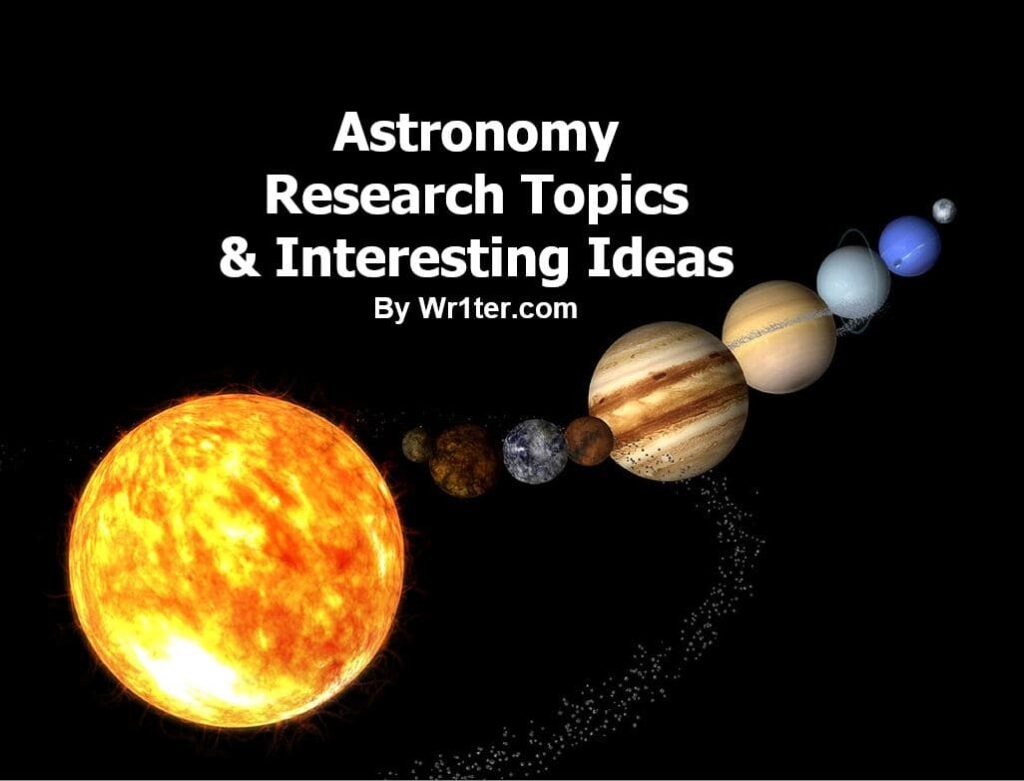
Interesting Astronomy Research Paper Topics
- Mercury’s Magnetic Field: Puzzling Aspects and Their Causes
- Radio Astronomy: Unveiling the Invisible Universe
- Spectroscopy: Decoding the Chemical Composition of Distant Stars
- Theories on the End of the Universe: Heat Death, Big Rip, or Something Else?
- Evolution of Galactic Structures in the Universe
- Roles of Dark Matter in Cosmic Structure Formation
- Enceladus: Investigating Potential Subsurface Life
- Interplay Between Cosmic Rays and Supernovae
- The James Webb Space Telescope: Anticipated Discoveries
- Theories on the Origin of the Moon
- Astrophysical Jets: High Energy Phenomena in the Universe
- Circumstellar Disks: Birthplaces of Planetary Systems
- Large Scale Structures in the Universe: Clusters and Superclusters
- Astronomical Impact on Earth’s Climate: A Long-Term View
- The Mystery of Ultra-High-Energy Cosmic Particles
- Supermassive Black Holes: Formation and Influence on Galaxy Evolution
- Quantum Gravity: Bridging the Gap Between Quantum Mechanics and General Relativity
- Investigation of Potential Life on Europa, Jupiter’s Ice Moon
- Kuiper Belt Objects: Probing the Edges of Our Solar System
- Merging Neutron Stars: Producers of Heavy Elements
- The Interplay of Gravitational Waves and Binary Black Holes
Astronomy Topics for High School
- Significance of Mars Colonization: A Comprehensive Study
- Investigating the Potential for Life on Jupiter’s Moon, Europa
- Pulsars: Lighthouses of the Universe
- Venus: The Hottest Planet’s Unique Atmosphere and Climate
- The Formation and Lifecycle of Stars
- Supermassive Black Holes: Engines of Galactic Centers
- Astrobiology: The Search for Extraterrestrial Life
- Comet Composition: Clues to the Early Solar System
- Harnessing Solar Energy: The Sun’s Role in Future Power
- Astrophotography: Capturing the Universe’s Stunning Phenomena
- Saturn’s Rings: Origin, Composition, and Evolution
- Dwarf Planets in the Solar System: An In-Depth Analysis
- Galactic Evolution: The Life and Death of Galaxies
- The Role of Telescopes in Shaping Modern Astronomy
- Supernova Explosions: Catastrophes that Shape the Universe
- The Impact of Space Debris on Earth’s Orbit
- Aurora Borealis: Unveiling the Northern Lights’ Secrets
- Exoplanets: The Hunt for Alien Worlds
- The Mystery of Fast Radio Bursts: A Cosmic Enigma
Astronomy Research Topics for College Students
- Origins of Galactic Structure: Unraveling the Formation of Spiral Galaxies
- Investigating Exoplanetary Systems: Analyzing Planetary Dynamics and Habitability
- Exploring Black Holes: Probing the Mysteries of Gravitational Singularities
- Unveiling the Secrets of Dark Matter: A Comprehensive Study on its Nature and Distribution
- Stellar Evolution: Tracing the Life Cycle of Stars From Birth to Death
- The Search for Extraterrestrial Intelligence: Examining Strategies and Technologies
- Analyzing Cosmic Microwave Background Radiation: Insights Into the Early Universe
- Solar Flares and Space Weather: Understanding the Impact on Earth and Astronauts
- The Great Attractor: Investigating the Mysterious Force Shaping the Local Universe
- Mapping the Large-Scale Structure of the Universe: Cosmological Surveys and Analysis
- Unraveling the Mystery of Fast Radio Bursts: Origins and Characteristics
- Interstellar Medium: Studying the Cosmic Material Between Stars and Its Influence
- Unveiling the Dark Energy: Constraints on its Nature and Implications for the Universe
- Stellar Archaeology: Examining Ancient Stars to Understand Galactic History
- Investigating the Kuiper Belt and Oort Cloud: Origins and Composition of Trans-Neptunian Objects
- Understanding Gamma-Ray Bursts: Probing the Most Energetic Explosions in the Cosmos
- Asteroid Mining: Assessing Feasibility and Implications for Future Space Exploration
- Proxima Centauri b: Analyzing the Exoplanet’s Potential for Habitability
- Galactic Collisions: Studying the Interactions and Mergers of Galaxies
- Quantum Cosmology: Examining the Role of Quantum Mechanics in the Early Universe
Astronomy Research Topics for University
- The Formation of Planetary Systems: Insights from Protoplanetary Disks
- Supernovae: Investigating the Explosive Deaths of Massive Stars
- Stellar Populations: Understanding the Diversity of Stars in Different Environments
- Space Telescopes: Advancements in Observation Techniques and Instrumentation
- The Transient Universe: Tracking and Analyzing Variable Celestial Objects
- Pulsars: Unraveling the Physics of Neutron Stars and Their Emissions
- Astrochemistry: Investigating the Chemical Processes in Space
- Cosmic Rays: Origins, Composition, and Effects on Astronomical Objects
- Exploring the Dynamics of Galactic Nuclei: Central Supermassive Black Holes
- The Role of Tidal Forces in Shaping Celestial Bodies: Tidal Interactions in the Solar System
- Galactic Archaeology: Tracing the Formation and Evolution of the Milky Way
- The Dark Side of the Moon: Unraveling Lunar Mysteries and Exploration Potential
- Supernova Remnants: Probing the Aftermath of Stellar Explosions
- Exoplanet Atmospheres: Characterizing Composition and Detecting Biosignatures
- Gravitational Waves: Detecting and Analyzing Ripples in Space-Time
- The Role of Magnetic Fields in Astrophysical Jets: Origin and Propagation
- Cosmic Inflation: Examining Early Universe Expansion and its Observational Consequences
- The Galactic Habitable Zone: Assessing Conditions for Life in the Milky Way
- Interplanetary Dust: Investigating Its Origin and Effects on Planetary Environments
- Solar System Dynamics: Orbital Evolution and Stability of Celestial Bodies
Astrophysics Essay Topics & Ideas
- Unraveling the Mystery of Dark Matter in the Universe
- Black Holes: Engines of Destruction or Creation?
- Implications of Einstein’s Theory of Relativity in Modern Astrophysics
- Understanding the Phenomenon of Quantum Entanglement on the Cosmic Scale
- Exoplanets: Searching for Earth’s Twin in the Universe
- The Role of Supernovae in Galaxy Formation
- Are We Alone? The Search for Extraterrestrial Intelligence
- The Enigma of Fast Radio Bursts: Theories and Observations
- Exploring the Potential of Interstellar Travel
- Gravitational Waves: Echoes of Cosmic Events
- The Life and Death of Stars: Stellar Evolution
- Time Dilation in Space: A Closer Look at Special Relativity
- Examining the Impact of Solar Flares on Earth’s Magnetosphere
- Cosmological Inflation: Exploring the First Seconds of the Universe
- The Expansion of the Universe: Beyond the Big Bang Theory
- Multiverse Theory: Are We Just One of Many Universes?
- Mysteries of Dark Energy and the Accelerating Universe
- Roles of Cosmic Microwave Background in Understanding the Universe’s Origins
- Space-Time Curvature: Unveiling the Secrets of Gravity
Astronomy Research Topics About Modern Problems in the Study
- Unraveling Dark Matter: Investigations and Implications
- Cosmic Microwave Background Radiation: What Does It Tell Us?
- Gravitational Waves: Detecting Cosmic Collisions
- Terraforming Mars: Scientific Feasibility and Challenges
- Mitigating Space Debris: Solutions for the Crowded Skies
- Enceladus’ Potential for Life: Recent Discoveries and Future Exploration
- Identifying Rogue Planets: Implications for Cosmic Formation Theories
- Climate of Venus: A Cautionary Tale for Earth’s Future
- Asteroid Mining: Environmental and Ethical Considerations
- Quantum Entanglement: Its Role in Understanding the Universe
- Probing the Edge of the Universe: The Limits of Observational Technology
- Galaxies Far, Far Away: Observing the Early Universe
- Neutrino Astronomy: Challenges and Opportunities
- Exoplanets’ Atmospheres: Hunting for Signs of Life
- Space Tourism: Ethical Dilemmas and Sustainability Issues
- Cosmic Rays: Unveiling Their Mysterious Origins
- Evolution of Stars: Paradoxes and Puzzles
- String Theory and Multiverses: Scientific Speculation or Reality?
- Black Holes: Exploring Their Mysteries and Misconceptions
- Interstellar Travel: Evaluating the Technological Hurdles
- Harnessing Solar Power from Space: Opportunities and Challenges
- Magnetars and Pulsars: Decoding Their Bizarre Behaviors
Astronomy Research Paper Topics for Space Exploration
- Tracing the Evolution of Stars: From Protostars to Supernovas
- The Enigma of Dark Matter: Unraveling Universal Mysteries
- Mars Colonization: Feasibility, Challenges, and Potential Benefits
- Roles of Astronomy in Predicting Climate Change on Earth
- The Influence of Solar Flares on Earth’s Satellite Technology
- Significance of Exoplanets: Possibilities for Alien Life and Habitable Conditions
- Comets, Asteroids, and Meteoroids: Cosmic Debris and Their Impact on Earth
- Interstellar Travel: Concept, Technologies, and Prospects for the Future
- Unveiling the Secrets of Black Holes: Their Formation and Role in the Universe
- Cosmic Microwave Background: Evidence for the Big Bang Theory
- Investigating the Kuiper Belt: Pluto and Beyond
- Extraterrestrial Atmospheres: Comparative Planetology of the Solar System
- Pulsars and Quasars: Extreme Conditions in the Universe
- Gravitational Waves: Detecting Ripples in Space-Time
- Comet Chasing: Understanding the Composition and Life Cycle of Comets
- Hazards of Space Debris: Mitigating the Risks for Space Travel
- Harnessing Solar Power: The Future of Energy in Space
- Astronomical Spectroscopy: Decoding Light From Distant Stars
- Interplanetary Dust: Studying the Smallest Particles in Our Solar System
- Neutrinos From Space: Detecting Subatomic Particles From Beyond our Galaxy
- Exoplanet Hunting: Techniques and Discoveries
To Learn More, Read Relevant Articles

115 British Literature Research Paper Topics & Ideas
- Icon Calendar 3 June 2023
- Icon Page 1363 words

218 Anatomy & Physiology Topics to Research
- Icon Calendar 2 June 2023
- Icon Page 1982 words
Stargazing into the Future: Top Astronomy Research Topics
Table of contents
- 1 Astrophysical Magnetism and the Interstellar Medium: Astronomy Research Topics
- 2 Black Holes: Unveiling the Dark Mysteries of the Cosmos
- 3 Cosmic Microwave Background: Echoes of the Big Bang
- 4 Dark Energy and Matter
- 5 First Stars, Exoplanets, and Galaxies
- 6 Galaxy Clusters and Formation
- 7 Gravitational Lensing
- 8 Neutron Stars and Pulsars
- 9 Optical Surveys
- 10 Solar Physics
- 11 Exploring the Cosmic Frontier: Key Insights Unveiled
Welcome to the fascinating universe of astrophysics with our comprehensive article that illuminates the mysteries and marvels of space. Embark on an extraordinary voyage through the cosmos as we unravel the secrets of the universe in this captivating exploration of astrophysics.
Our article explores ten key astronomy research topics, each offering a gateway to understanding the complex phenomena that govern the stars, planets, and galaxies, inviting readers to dive deep into the wonders of space. Gain insights into the complex forces shaping the cosmos, from the smallest particles to the largest structures.
Continue reading to unlock the secrets of the universe and fuel your curiosity about the wonders beyond our planet.
Astrophysical Magnetism and the Interstellar Medium: Astronomy Research Topics
Astrophysical magnetism and the interstellar medium represents a cutting-edge field of astronomy focused on understanding the magnetic forces at play within the cosmos and the matter that fills the space between the stars. This field examines magnetic influences on star and galaxy formation, cosmic ray behavior, and interstellar cloud dynamics, integrating observation, theory, and modeling to understand the universe’s magnetic aspects.
- Investigating magnetic fields’ role in the interstellar medium and star birth.
- Charting Cosmic Magnetism: Space Topics for Project.
- Space Research Topics about Astrophysical Plasma Processes.
- Astronomy Essay Topics about Magnetic Fields in Galaxy Evolution: Astronomy Essay Topics.
- Interesting Topics in Astronomy about Magnetars.
- Astronomy Topics to Write About Magnetic Reconnection Events.
- Cosmic Rays’ Journey Through Magnetic Fields.
- Astronomy Research Questions in Detecting Cosmic Magnetism.
- Crucial role of Molecular Clouds and Magnetism in star-forming regions and the lifecycle of stars.
- The impact of magnetism on the gas and dust between stars.
Black Holes: Unveiling the Dark Mysteries of the Cosmos
Black holes represent one of the most fascinating subjects in the field of astrophysics, captivating scientists and the public alike with their enigmatic nature and the extreme physics surrounding them. This area of study delves into the formation, evolution, and effects of these cosmic phenomena, exploring how they warp spacetime, influence their surroundings, and provide key insights into the workings of the universe.
- The Event Horizon Telescope’s View of Sagittarius A.
- Hawking Radiation: Unraveling Black Hole Mysteries.
- Black Hole Binaries and Gravitational Wave Emissions.
- Accretion Disks and High-Energy Astrophysics.
- Primordial Black Holes and the Early Universe.
- The Information Paradox: Debating Black Hole Mysteries.
- Interstellar Black Holes: Navigating the Invisible.
- Supermassive Black Holes and Galaxy Formation.
- Visualizing Black Holes: Simulation and Interpretation.
- Quasars and Active Galactic Nuclei: Black Holes in Action.
Cosmic Microwave Background: Echoes of the Big Bang
The Cosmic Microwave Background (CMB) is a relic radiation that offers a snapshot of the universe just 380,000 years after the Big Bang, serving as a cornerstone for cosmology. Researchers study the CMB to understand the early universe’s conditions, the formation of cosmic structures, and the fundamental parameters that define our cosmos.
- Mapping the Universe’s Baby Picture.
- The Polarization of the CMB.
- Anomalies in the Cosmic Microwave Background.
- CMB and the Hubble Tension.
- Cosmic Neutrinos and the CMB.
- Dark Matter Imprints on the CMB.
- The Search for B-Mode Polarization.
- Planck Satellite Discoveries.
- The CMB’s Role in Large-Scale Structure Formation.
- Future Missions to Study the CMB.
Dark Energy and Matter
Exploring the enigmatic components of the cosmos that do not emit, absorb, or reflect light, dark energy and dark matter remain some of the most profound mysteries in astrophysics. Dark energy, a force that accelerates the expansion of the universe, and dark matter, an unseen substance that holds galaxies together, together comprise most of the universe’s mass-energy content. Research in this area aims to unravel their nature through theoretical models and observational evidence.
- Mapping the Invisible: Tracking Dark Matter in the Cosmos.
- The Accelerating Universe: Unveiling the Nature of Dark Energy.
- Cosmic Clues: The Role of Dark Matter in Galaxy Formation.
- Einstein’s Cosmological Constant and the Mystery of Dark Energy: Research Topics About Space.
- Gravitational Lensing: Astronomy Topics to Research a Window into Dark Matter.
- The Dark Sector: Interactions Between Dark Matter and Dark Energy: Topics About Astronomy.
- Astronomy Topics for Research Paper about Neutrinos and the Dark Universe: Tracing Invisible Particles.
- The Cosmic Microwave Background: Insights into Dark Matter and Energy: Interesting Astronomy Topics.
- Astronomy Research Paper Topics about Galactic Rotation Curves: The Dark Matter Evidence.
- Space Exploration Topics about Future Observatories and the Quest for Dark Matter.
First Stars, Exoplanets, and Galaxies
This field examines the origins and early evolution of the universe’s first stars, the formation and characteristics of exoplanets, and the development of galaxies. These topics cover a broad spectrum from the cosmic dawn, when the first stars ignited, through the assembly of galaxies, to the current era where telescopes search for planets around distant stars, offering insights into the processes that shaped the cosmos.
- Dawn of the Cosmos: The Life and Death of the First Stars.
- Hunting for Other Worlds: Discovering New Exoplanets.
- The Assembly of Galaxies: Insights from Deep Space Observations.
- Chemical Signatures: Tracing Galaxy Evolution Through Spectroscopy.
- Astrophysics Research topics about the Role of Dark Matter in Shaping Early Galaxies.
- Star Formation Rates and the Growth of Galaxies.
- Detecting the Atmospheres of Distant Exoplanets.
- Population III Stars: Unlocking the Secrets of the Universe’s First Lights.
- The Search for Life: Targeting Earth-like Exoplanets.
- Galactic Nuclei and the Seeds of Supermassive Black Holes.
Galaxy Clusters and Formation
Galaxy clusters, the largest gravitationally bound structures in the universe, serve as excellent laboratories for studying the formation of cosmic structures, the behavior of dark matter, and the thermodynamics of the intergalactic medium. This area of research not only sheds light on the cluster formation and evolution but also on the larger-scale structure of the universe and the fundamental laws that govern it.
- Space Topics to Research The Gravitational Architecture: Mapping Galaxy Clusters.
- Dark Matter Skeletons: The Structure of Cosmic Webs.
- Hot Gas and Galactic Giants: The Intracluster Medium.
- Colliding Titans: Studying Galaxy Cluster Mergers.
- The Sunyaev-Zel’dovich Effect: CMB Shadows.
- Lensing Mass: Weighing Galaxy Clusters.
- Star Formation in Extreme Environments.
- The Butcher-Oemler Effect: Evolution of Galaxies in Clusters.
- Feedback Processes in Galaxy Cluster Cores.
- Cosmology with Galaxy Clusters: Understanding the Universe’s Expansion.
Need help with research paper writing? Get your paper written by a professional writer Get Help Reviews.io 4.9/5
Gravitational Lensing
Gravitational lensing, the bending of light by massive objects, acts as a natural telescope, magnifying distant galaxies, revealing objects otherwise too faint to see, and providing a unique tool for testing theories of gravity and the nature of dark matter. Studies in gravitational lensing span from observing the most distant galaxies to understanding the distribution of dark matter in the universe.
- Einstein’s Lens: Confirming General Relativity.
- Cosmic Magnification: Discovering the Distant Universe.
- Hunting Dark Matter Through Lensing Anomalies.
- Microlensing: Revealing Rogue Planets and Dark Objects.
- Strong Lensing: Arcs and Rings in the Sky.
- Weak Lensing: Mapping the Dark Universe.
- Lensing and Cosmic Shear: Observing the Shape of the Universe.
- Time-Delay Cosmography: Measuring the Universe’s Expansion.
- Galaxy Evolution Through the Lens.
- The Future of Lensing: New Frontiers with Next-Generation Telescopes.
Neutron Stars and Pulsars
Neutron stars and pulsars present extreme states of matter, with densities exceeding that of atomic nuclei. These objects provide insight into the physics of the cosmos, from the nuclear reactions in their interiors to the powerful magnetic fields that drive pulsar emissions. Research in this area explores the aftermath of supernovae, the nature of dense matter, and the fundamental principles of physics under extreme conditions.
- Birth from Catastrophe: The Creation of Neutron Stars.
- Pulsars: Lighthouses of the Cosmos.
- The Extreme Physics of Magnetars.
- Binary Pulsars and Tests of General Relativity.
- The Internal Composition of Neutron Stars.
- Gravitational Waves from Neutron Star Mergers.
- Pulsar Timing Arrays: Probing the Cosmic Web.
- Fast Radio Bursts and Neutron Star Mysteries.
- Neutron Star Cooling and Nuclear Physics.
- The Search for Isolated Neutron Stars.
Optical Surveys
Optical surveys have revolutionized our understanding of the universe, from mapping the distribution of galaxies and dark matter to discovering transient cosmic events. These large-scale observations provide a comprehensive view of the sky, enabling the discovery of new celestial phenomena and offering insights into the structure and evolution of the cosmos.
- The Legacy of the Sloan Digital Sky Survey.
- Transients in the Night: Catching Supernovae and Gamma-Ray Bursts.
- Mapping the Milky Way: Gaia’s Billion-Star Survey.
- The Dark Energy Survey: Unraveling Cosmic Acceleration.
- Pan-STARRS: A Panoramic View of the Sky.
- The Vera C. Rubin Observatory and the LSST Project.
- Hunting for Minor Planets: Optical Surveys in the Solar System.
- The Zooniverse: Citizen Science and the Cosmos.
- The Future of Sky Surveys: AI and the Next Decade.
- Ultra-Deep Fields: Peering into the Cosmic Dawn.
Solar Physics
Solar physics focuses on understanding the Sun, from its core to the outer layers of the solar atmosphere, and its influence on the solar system. This research is crucial for predicting solar activity, understanding the mechanisms behind solar flares and coronal mass ejections, and their impact on space weather, which can affect Earth’s technological systems.
- The Solar Dynamo: Driving the Sun’s Magnetic Cycle.
- Coronal Mass Ejections: Impact on Earth’s Space Environment.
- Solar Flares: Unraveling the Mechanisms of Solar Storms.
- Helioseismology: Probing the Sun’s Interior.
- The Solar Wind: Understanding Its Origins and Variability.
- Sunspots and Solar Activity: Patterns and Predictions.
- The Parker Solar Probe: Touching the Sun.
- Solar-Terrestrial Relations: The Impact of the Sun on Earth.
- The Chromosphere and Corona: Observing the Sun’s Outer Layers.
- Advances in Solar Observation Technologies.
Exploring the Cosmic Frontier: Key Insights Unveiled
This article takes us on a profound journey through the universe’s mysteries, from the warping effects of gravitational lensing to the extreme environments of neutron stars and pulsars. Key takeaways include the significant role of gravitational phenomena in understanding cosmic structure, the critical insights provided by the study of the universe’s densest objects, and how these studies illuminate the dark corners of our universe. By delving into these topics, we gain a deeper appreciation for the intricate tapestry of the cosmos and the fundamental principles that govern its vast expanse.
Readers also enjoyed

WHY WAIT? PLACE AN ORDER RIGHT NOW!
Just fill out the form, press the button, and have no worries!
We use cookies to give you the best experience possible. By continuing we’ll assume you board with our cookie policy.
Research Topics
Scientists and engineers at the Center for Astrophysics | Harvard & Smithsonian collaborate across a broad variety of scientific disciplines, from astronomy and astrophysics to related areas of physics and geophysics, in advancing humanity’s understanding of the universe. Learn more about the full spectrum of research covered at the CfA.
Research Topics List
JPL's charter is to conduct robotic space missions for NASA, to explore our own and neighboring planetary systems, understand the origin and evolution of the universe and make critical measurements to understand our home planet and help protect it. We do this by developing integrated capabilities in engineering, science and technology, in a unique environment that strives for excellence in any of the three areas. To be successful in our ability to implement missions for NASA, we foster research in those areas of space-based science that establish our leadership in the science community and those technologies that allow the innovations that are crucial to maintaining our competitive edge. Our science, technology and engineering research covers many areas of planetary, astrophysics and Earth science, both as basic research leading to new observations and mission concepts, as well as research based on the data acquired by JPL flight projects. Our technology research covers areas ranging from robotic systems, a range of in-situ and remote sensing instruments, deep space communications and navigation, information systems, precision flying and planetary protection and survivability.
- From the Director
- Values and Code of Conduct
- Equity and Inclusion
- Annual Reports
- Scientific Staff
- Postdoctoral Fellows
- Graduate Students
- Research Professionals
- Institute Staff
- Cosmic Structure
- Extreme Astrophysics
- Physics of the Universe
- Stellar, Interstellar and Planetary Astrophysics
- Research Interests of Senior Members
- Publications
- Events Calendar
- Upcoming Events
- Astrophysics Colloquium
- Cosmology Seminar
- Public Lectures
- Opportunities
- Postdoctoral opportunities
- Prospective Graduate Students
- Post-baccalaureate Fellowship
- Undergraduate Research
- Request a Tea Talk
- Getting Here
- Lecture Archive
- Latest from KIPAC
- Research Highlights
- In the News
- Newsletters
- New to the KIPAC Community?
- COVID Protocols
Research topics
Astrophysical magnetism and the interstellar medium.

What fills the space between the stars? In addition to stars, planets, and dark matter, galaxies are home to vast reservoirs of gas and dust, high-energy particles, and magnetic fields. This is the interstellar medium (ISM): the stuff between the stars. The interstellar medium is the material from which new stars are born.
Black Holes

Cosmic Microwave Background

Dark Energy

One of the most important and surprising scientific discoveries of the twentieth century is that the expansion of space is not slowing down, but speeding up—contrary to what we expect the gravitational pull of all the matter in the Universe to do. The driver of this accelerating expansion has been labeled "dark energy," but there is much about the phenomenon that researchers don’t understand.
Dark Matter

First Stars and Galaxies

Roughly 400,000 years after the Big Bang, the Universe—bathing in the afterglow of radiation that we see today as the cosmic microwave background—began to enter the cosmic “dark ages,” so named because the luminous stars and galaxies we see today had yet to form.
Galaxy Clusters

Galaxy Formation

Gravitational Lensing

Neutron Stars and Pulsars

Optical Surveys

In the traditional model of astronomical observation, individual or small teams of astronomers study a select class of objects in a small region of sky. However, some of the most exciting cosmological and astrophysical results in recent years have required the study of millions of galaxies over thousands of square degrees of sky.
Particle Acceleration

Scientific Visualization and Data Analysis

KIPAC's visualization and data analysis facilities provide hardware and software solutions that help users at KIPAC and SLAC to analyze their large-scale scientific data sets.
Solar Physics

- How It Works
- PhD thesis writing
- Master thesis writing
- Bachelor thesis writing
- Dissertation writing service
- Dissertation abstract writing
- Thesis proposal writing
- Thesis editing service
- Thesis proofreading service
- Thesis formatting service
- Coursework writing service
- Research paper writing service
- Architecture thesis writing
- Computer science thesis writing
- Engineering thesis writing
- History thesis writing
- MBA thesis writing
- Nursing dissertation writing
- Psychology dissertation writing
- Sociology thesis writing
- Statistics dissertation writing
- Buy dissertation online
- Write my dissertation
- Cheap thesis
- Cheap dissertation
- Custom dissertation
- Dissertation help
- Pay for thesis
- Pay for dissertation
- Senior thesis
- Write my thesis
170 Fantastic Astronomy Topics For High Scoring Thesis
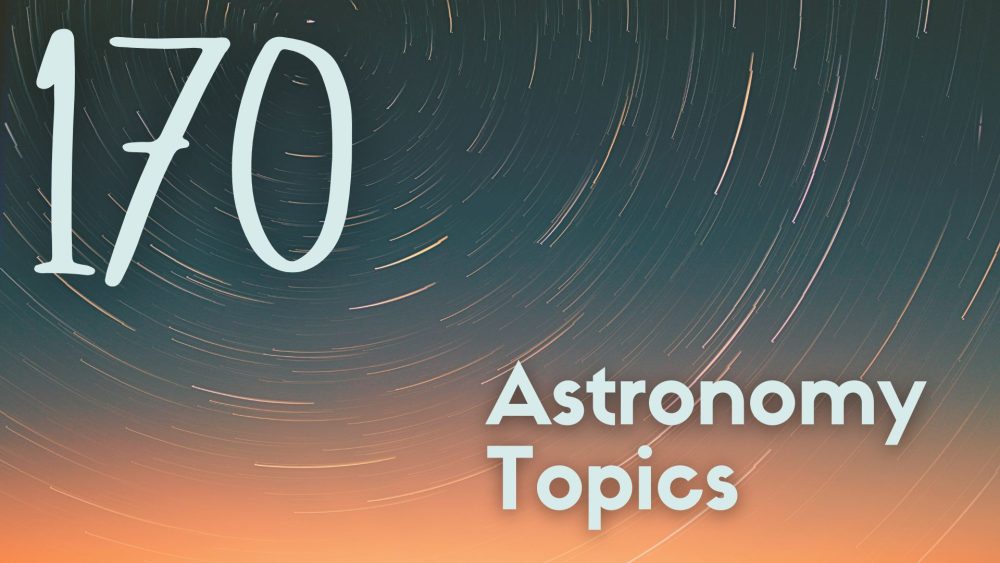
Astronomy, which is the study of celestial objects and phenomena, has indeed captured the imaginations of humanity since time immemorial. From unraveling the mysteries of distant galaxies to investigating the nature of dark matter, astronomy, interestingly, indeed encompasses a wide range of exciting research topics.
But before we look at a wide range of excellent astronomy-related research topics that college students, professors, teachers, and other professionals will find useful, let us take a small detour to what astronomy really is.
What Is Astronomy?
Astronomy is the scientific discipline that essentially focuses on the study of celestial objects such as stars, planets, galaxies, and other phenomena in the universe. In other words, astronomy is the observation, theoretical modeling, and interpretation of astronomical data for the purposes of deepening our understanding of the cosmos.
Characteristics Of A Good Astronomy Research Paper
Here are some characteristics of a good astronomy paper:
Originality : A good astronomy research paper should provide unique insights and be able to address unanswered questions.
Clarity : A good astronomy research paper should be able to simplify and communicate complex concepts effectively.
Scientific-rigor : A good astronomy research paper should be able to present a well-defined methodology and provide reliable data.
Relevance : A good astronomy research paper should be relevant. It should be able to explore emerging areas of study or address current astronomical issues.
Contribution : A good astronomy research paper should be able to advance existing knowledge and provide avenues for further research.
Astronomy Research Topics
Astronomy research topics, in a nutshell, encompass various research areas within astronomy. These research areas include but are not limited to: the study of gravitational waves, extraterrestrial intelligence, magnetic fields in celestial objects, stellar evolution, and high-energy astrophysics. Here are great astronomy research topics to consider for your school or university paper:
- Gravitational waves and their impact on Astronomy
- Stellar evolution and life cycle of stars
- The role of magnetic fields in shaping celestial objects
- The role of magnetic fields in star formation
- Origin and evolution of supermassive black holes
- Impact of Space weather on Earth’s atmosphere
- Investigating the nature of fast radio transients
- Evolution of galaxies in different environments
- Probing the intergalactic medium using quasar absorption lines
- Cosmic rays and their effects on astronaut health
- Detection and characterization of fast radio bursts
- Study of Exomoons: Moons orbiting exoplanets
- High energy astrophysics and cosmic rays
Astronomy Topics
These topics cover a wide range of astronomical subjects such as galaxies and their evolution, planetary atmospheres, the study of asteroids and comets, phenomena like gamma-ray bursts, and the formation of the solar system to mention a few. Students who need dissertation help will find the following topic suggestions interesting:
- The formation of the solar system
- Exploring the mysteries of gamma-ray bursts
- Planetary atmospheres and climate change
- The study of asteroids and comets
- Types, interactions, and evolutions of galaxies
- Stellar populations in different galactic environments
- Dynamics and formation of globular clusters
- The role of black holes in galaxy evolution
- Exploring the cosmic microwave background radiation
- Probing the origins of ultra-high energy cosmic rays
- The formation and evolution of planetary nebulae
- Investigating the origins of First Radio Bursts (FRBs)
- The interstellar medium and star formation
Space Research Paper Topics
These focus on topics related to space exploration and observations. Some high-quality interesting topics that native writers, students, and class teachers will find useful include:
- Space telescopes and their contribution to astronomy
- The study of space weather and its effects on earth
- Investigating the mysteries of black holes using space-based observatories
- Space missions to explore Mars and other planets
- The search for exoplanets and habitable environments
- Space debris: Assessment, mitigation, and future challenges
- Space tourism: potential market growth and safety regulations
- Space weather and its impacts on Earth’s technological systems
- Asteroid mining: Opportunities, challenges, and ethical considerations
- Interplanetary dust and its significance for planetary science
- Space colonization: Challenges and prospects for human settlement on other planets
- Lunar exploration and resource utilization for sustainable space missions
- Space telescopes: advancements in observational astronomy
Interesting Astronomy Topics
These topics delve into the intriguing aspects of astronomy. Here are interesting astronomy topics to consider:
- The concept of time in astronomy and relativity
- Exploring the origins of cosmic rays
- The possibility of life on other planets
- Pulsars: Nature’s most precise cosmic clocks
- Astrobiology: The study of life in the universe
- Studying the relationship between supermassive black holes and galaxy evolution
- Probing the origins and composition of interstellar dust
- Investigating the mystery of dark energy in the universe
- Unveiling the secrets of neutron stars and pulsars
- Investigating the role of magnetic fields in star formation and stellar evolution
- Examining the dynamics of composition of planetary atmospheres in our solar system and beyond
- Understanding the processes and consequences of stellar explosions (supernovae)
- Investigating the potential habitability of exoplanets and the search for life beyond earth
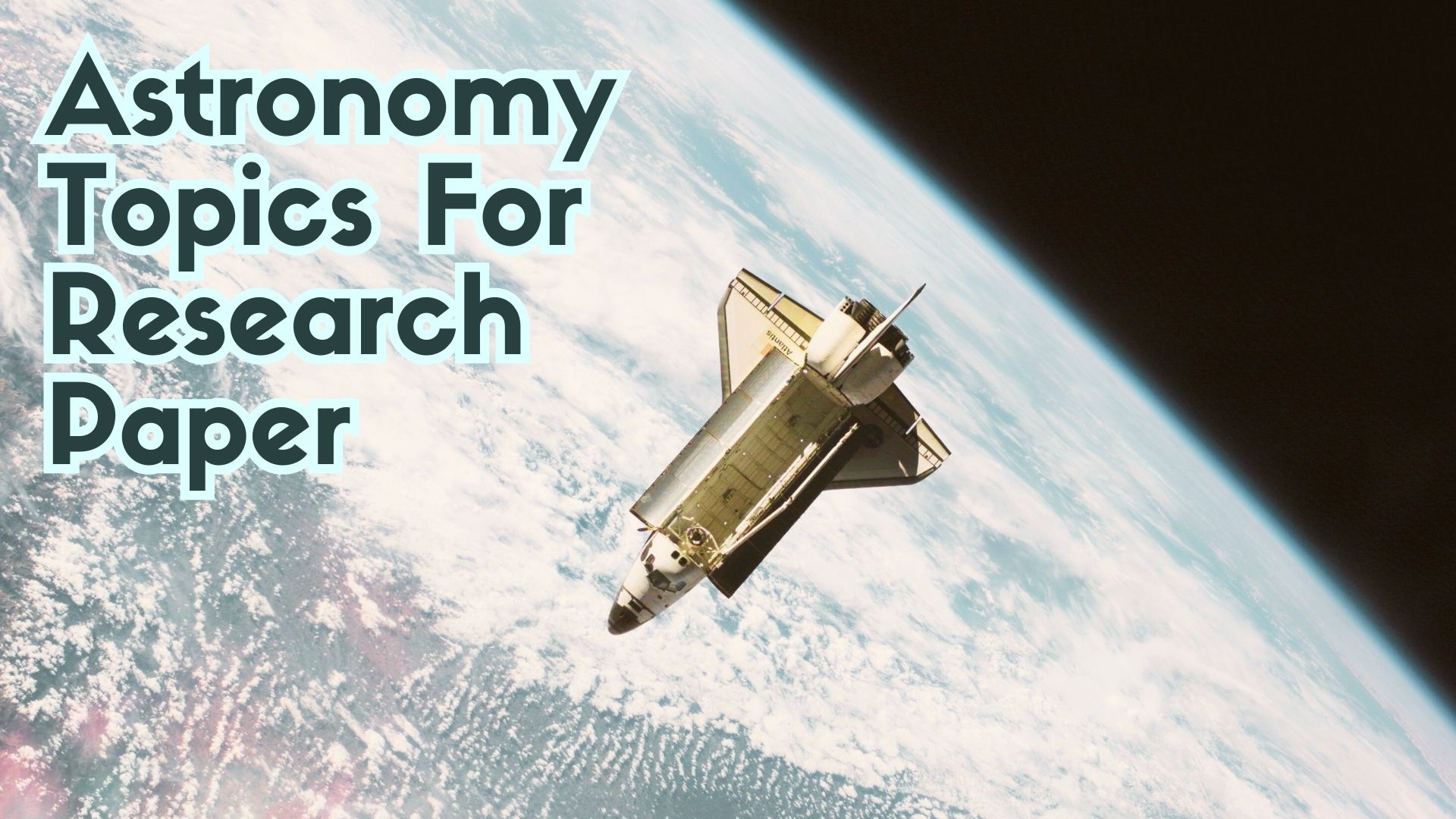
Astronomy Topics For Research Paper
This particular category suggests topics that are suitable for research papers in astronomy. Professionals, online writers, class teachers, college and university students, as well as professors will find the following topics excellent:
- The role of dark matter in galaxy formation
- Investigating the nature of dark energy
- Probing the mysteries of neutron
- Supernovae and their importance in the universe
- The discovery and characterization of exoplanets
- Stellar evolution and supernovae: Investigating the life cycles of stars, including their birth, evolution, and explosive deaths as supernovae
- The search for primordial black holes
- Stellar abundances: Tracing chemical evolution
- Interstellar medium: Composition, dynamics, and evolution
- Gravitational lensing: Probing the mass distribution of galaxy clusters
- Protoplanetary disks and planet formation
- Dwarf galaxies: formation and dark matter content
- Supernovae Remnants: probing stellar explosions
Space Science Topics
These topics encompass a broad range of scientific investigations related to space. Interesting topics include:
- Studying the dynamics of planetary atmospheres and weather patterns
- The exploration of moons in our solar system
- Exploring the nature of gravitational interactions in multiple star systems
- Investigating the nature of black hole mergers
- Investigating the origins of cosmic magnetic fields
- The role of space weather in satellite communications
- The study of planetary geology and surface features
- Studying the atmospheres of exoplanets using spectroscopy
- Probing the mysteries of white dwarfs and their evolutionary paths
- Exploring the possibilities of asteroid mining
- Understanding the formation of planetary rings
- The study of space debris and its impact on space exploration
- Investigating the physics of solar flares and coronal mass ejections
Astrophysics Research Topics
This particular topic focuses on research topics within astrophysics which entail the study of celestial objects and phenomena. The best topics to consider are:
- Understanding the physics of gamma-ray astronomy and its implications
- Probing the physics of stellar explosions: Supernovae and gamma-ray bursts
- Exploring the properties of interplanetary magnetic fields and solar wind
- The study of high-energy astrophysical phenomena: Ray binaries and pulsars
- Investigating the physics of stellar oscillations and asteroseismology
- Understanding the physics of accretion disks around black holes
- The study of interstellar turbulence and its impact on star formation
- Investigating the nature of dark energy through cosmic microwave background
- Understanding the dynamics of galactic collisions and mergers
- Exploring the mechanisms behind stellar magnetic fields and activity
- Probing the physics of gravitational waves and their sources
- The study of relativistic jets from active galactic nuclei
- Investigating the role of magnetic fields in star formation processes
Space Exploration Topics
These are topics that revolve around the exploration of space and entail:
- The future of human colonization of Mars and other celestial bodies
- Investigating the formation and evolution of planetary systems beyond our solar system
- Investigating the potential for life on moons of gas giants
- Exploring the potential for resource utilization on the moon and asteroids
- The study of space tourism and its challenges
- The study of space-based gravitational wave detectors
- Exploring the possibilities of interstellar travel and propulsion systems
- Understanding the challenges and prospects of manned deep space missions
- The role of robotic missions in planetary exploration
- Investigating the feasibility of asteroid deflection strategies
- Investigating the potential for terraforming other planets
- Exploring the mysteries of the outer heliosphere and heliopause
- The study of space-based telescopes and observatories
Research Topics In Cosmology
This particular category explores research topics within cosmology which is essentially the study of the origin of evolution and the structure of the universe. Some good topics to consider for scientific thesis writing include:
- Understanding the nature and properties of cosmic neutrinos
- The study of the cosmic microwave background radiation and its implications
- Exploring the physics of dark energy and its implications
- Understanding the large-scale structure of the universe
- Investigating the Role of baryonic acoustic oscillations in Cosmology
- Investigating the nature of primordial gravitational waves
- The study of the early universe and the era of recombination
- Exploring the possibilities of a multiverse
- Probing the nature of cosmic strings and other topological defects
- The study of cosmic voids and their impact on galaxy formation
- Investigating the physics of inflationary models
- Understanding the formation and evolution of cosmic filaments
- Probing the nature and properties of dark matter candidates
Astronomy Topics To Write About
If you are a student looking for the best astronomy topics to write about, here are excellent suggestions:
- The formation and evolution of galaxies
- The study of cosmic rays and high-energy particles
- The life cycle of stars: From birth to death
- Investigating the origins and evolution of the solar system
- The search for extraterrestrial intelligence (SETI)
- The Impact of Asteroids collisions on Earth’s History
- The Role of dark matter in the Universe
- Exploring the magnetic fields of celestial objects
- Exoplanet discoveries and characterization
- The structure and dynamics of spiral galaxies
- The nature of black holes: Mysteries and discoveries
- The detection and study of gravitational waves
- The Origins of the Universe: big bang cosmology
Cool Astronomy Topics
- Time dilation: The effects of relativity on observations
- Stellar Archeology: Unraveling the Secrets of old stars
- Stellar Nurseries: birthplaces of new stars
- The evolution of galaxies in galaxy clusters
- Exoplanet atmosphere: Clues for habitable worlds
- Strange Planets: Exotic discoveries beyond our solar system
- The Origins of Fast Radio Bursts (FRBs)
- The potential existence of a parallel universe
- The Kuiper Belt: Exploring the Icy Worlds Beyond Neptune
- Exploring supermassive black holes at the centers of galaxies
- Quasars: cosmic powerhouses and lighthouses
- The surprising behaviors of pulsars and magnetars
- The great attractor: Unveiling the Mysteries of cosmic flows
Interesting Space Topics
- Space debris: challenges and solutions for orbital cleanup
- Space mining: opportunities and ethical considerations
- Space-based telescopes: Expanding our view of the universe
- Space tourism: commercial ventures beyond Earth’s atmosphere
- Space weather: impacts on satellite communications and Earth’s environment
- The James Webb space telescope: A new era of observing the cosmos
- The search for water on Mars and its implication for life
- Mars colonization: challenges and benefits of establishing a human presence
- The lunar gateway: NASA’s Gateway to deep space exploration
- Astrobiology: Investigating the potential for life in extreme environments
- Space elevators: novel concepts for space transportation
- The Fermi Paradox: why haven’t we found extraterrestrial life yet?
- Planetary protection: safeguarding terrestrial bodies from contamination
Topics In Astronomy
- Stellar evolution: from protostars to supernovae
- The role of spiral density waves in shaping galaxies’ structures
- Galactic dynamics: The structure and evolution of galaxies
- The study of globular clusters: ancient stellar systems
- Observational techniques in astronomy: from telescopes to space missions
- White dwarfs and planetary nebulae: The final stages of stellar evolution
- Cosmic microwave background radiation: clues to the early universe
- Gamma-ray bursts: The most energetic explosions in the universe
- The Hertzsprung-Russell diagram: understanding stellar properties
- The Drake equation: estimating the number of technologically advanced civilizations
- The Doppler effect: Measuring the motion of celestial objects
- The role of interstellar dust in the absorption and scattering of light
- Variable stars: exploring the changing brightness of astronomical objects
- Astrochemistry: Understanding the chemistry of space
In conclusion, astronomy offers a vast realm of research possibilities ranging from the mysteries of dark matter and dark holes to the explorations of exoplanets. We understand that the field of astronomy can be a complex area to write a research paper on as a student. If you experience difficulties and look for someone to write a thesis for you , we do custom astronomy research papers, editing, and deliver them within no time. Whether you want a research paper or need thesis help, we have professional writers at your beck and call. We are cheap, fast, and trustworthy, and deliver high-quality and well-written research papers at a moment’s notice.
Make sure to check our posts with other topics before you leave:
- 163 Unique Artificial Intelligence Topics For Your Dissertation
- 121 Original Neuroscience Research Topics
- 211 Of The Most Interesting Earth Science Topics
- 214 Best Big Data Research Topics For Your Thesis
- 211 Interesting Engineering Research Paper Topics
- Experiment vs Observational Study: A Deeper Look
- 101 Best Computer Science Topics
What is the Big Bang Theory?
The big bang theory suggests that the universe originated from an extremely hot and dense state around 13.8 billion years ago. It goes further to explain the expansion and evolution of the cosmos including the formation of the stars, the galaxies, and the planets.
What is a black hole?
A black hole refers to a region in space with an intense gravitational pull that prevents anything, including light, from escaping. A black hole is formed when massive stars collapse under their own gravity forming a singularity surrounded by an event horizon.
What are exoplanets?
Exoplanets refer to planets that exist outside our solar system, orbiting stars other than the sun. The discovery of exoplanets has totally changed our understanding of the planetary system and the potential for habitable worlds beyond the Earth.
What is a dark matter?
Dark matter refers to a hypothetical form of matter that doesn’t interact with light or other electromagnetic radiation. It is generally inferred from its gravitational effects on visible matter and plays an instrumental role in explaining the dynamics of galaxies and the large-scale structure of the universe.

Leave a Reply Cancel reply
Your email address will not be published. Required fields are marked *
Comment * Error message
Name * Error message
Email * Error message
Save my name, email, and website in this browser for the next time I comment.
As Putin continues killing civilians, bombing kindergartens, and threatening WWIII, Ukraine fights for the world's peaceful future.
Ukraine Live Updates
- Write my thesis
- Thesis writers
- Buy thesis papers
- Bachelor thesis
- Master's thesis
- Thesis editing services
- Thesis proofreading services
- Buy a thesis online
- Write my dissertation
- Dissertation proposal help
- Pay for dissertation
- Custom dissertation
- Dissertation help online
- Buy dissertation online
- Cheap dissertation
- Dissertation editing services
- Write my research paper
- Buy research paper online
- Pay for research paper
- Research paper help
- Order research paper
- Custom research paper
- Cheap research paper
- Research papers for sale
- Thesis subjects
- How It Works

170+ Cool Astronomy Research Topics You Can Write About
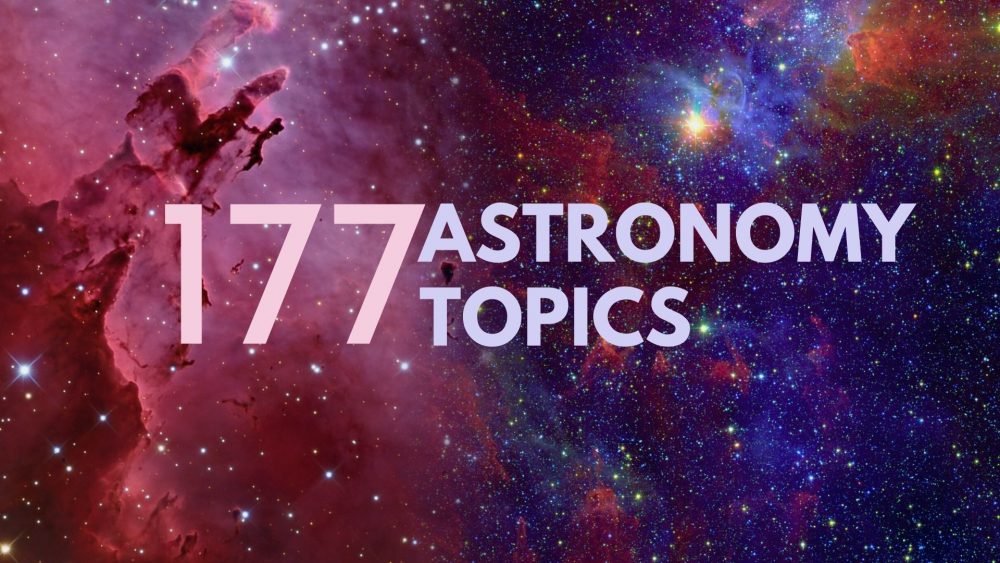
Are you looking for the best astronomy topics for your research? They don’t need to be controversial, but can simply be interesting. Astronomy topics are based on space, the galaxy, heavenly bodies, and planets. Hence, if you are doing a course related to that, these astronomy topics will help you to do proper research.
We have a great number of professional experts that can offer custom writing help to ensure you get top grades. They offer research paper writing for your specific astronomy topics. The expert writers are ENL meaning they will provide well-written English research papers at a cheap price.
Interesting Astronomy Research Topics
Astronomy may be termed as dull, however, there are interesting topics that you can research. These are based on theories and how the heavenly bodies came to be.
- Evaluate the origin and impact of the big bang theory.
- How effective are the Hubble telescope and Kepler telescope?
- Evaluate the impact of a solar eclipse on the world.
- What are exoplanets? Evaluate the detection methods.
- Discuss the history of space evolution and the assumptions based on it.
- The impact of the sun on the water bodies?
- Evaluate the latest space technologies and their impact on mankind.
- Evaluate and determine how to get the moon’s angular diameter.
- Investigate the expansion of the universe.
- How do planets correlate while on the axis?
- Discuss the major satellite communications problems – how effective are they?
- Investigate ways in which humans can travel in time- back to the past.
- Evaluate the assumption of the existence of dark matter.
- Evaluate space exploration in modern times.
- Is it possible for a human to exist in space and how will they survive?
Detailed Topics in Astronomy
Are you looking for the best topics in Astronomy? These are some of the latest and cover previous discoveries that have had an impact on the world.
- Evaluate the evidence of the moons orbiting planets – How is that possible?
- The impact of the light spectrum of stars in galaxies.
- Explore the existence of a multi-universe.
- How do star clusters occur and their impact on the earth?
- How do stars evolve from when they appear and disappear for good?
- Evidence supporting the Big bang theory.
- The impact of the sun on various planets.
- The major influence of 5G wireless data transfer.
- Discuss the major theories pertaining the universe.
- Why do we explore the solar system and the impact it will have on Education.
- Evaluate planet melting and how it occurs.
- Is it possible to calculate the mass of the whole solar system?
- Is it possible to discover time travel?
- What are constellations and how did the first humans see them.
- How does black hole birth occur and the process it undertakes?
Astronomy Project Topics
Are you interested in doing a space-related topic? You will get one from these astronomy project topics. Your professor will be pleased by the research project your present at the university.
- Does space exploration have a future and how?
- What are the requirements needed for people to exist on Mars or any other planet?
- Explain the different dynamics of an exoplanet.
- Evaluate whether humans landed on the moon.
- Will light travel be viable in the future – evidence?
- Evaluate the existence of an unremarkable star.
- Discuss the Copernicus heliocentric model
- Is their evidence of dark energy and how does it occur.
- Evaluate the activeness of the galaxy.
- What are the various types of light pollution and their impact on the world?
- How do Mars rovers work?
- Evaluate the evolution and birth of our planet Earth.
- How do echoes occur in a solar storm
- What can make a star go supernova?
- Evaluate the latest development in NASA’s shuttle program.
Astronomy Topics for Presentation
Making presentations at school can be hectic. Hence, if you choose an appropriate topic, doing research and getting the right visuals will be easier. Here are some interesting astronomy topics for presentation.
- How did the sky form?
- Discuss the phases of a moon using a model.
- What are astrophysics and its impact on modern learners
- Evaluate galaxies and the expanding universe.
- How do the birth and death of the stars occur?
- Evaluate the deep sky and its impact on the world.
- Why do some things work and some don’t on space?
- Can a human exist on planets other than Earth?
- Evaluate the major theories describing the origin of the universe.
- Analyze Stephen Hawking’s: Brief History in Time.
- Evaluate black holes and how they impacted major discoveries.
- Is there any sociological implication of the Challenger disaster space shuttle?
- What is the impact of NASA and space exploration – does it have a future?
- Evaluate the history of astronomy from the start.
- What are the major models of the galaxy?
Astronomy Research Paper Topics
It can be overwhelming to get an astronomy topic for your research paper. This collection of topics is based on the galaxy, heavenly bodies, and planets.
- Evaluate the Copernicus galaxy model.
- Evaluate the Heliocentric galaxy model.
- Do the stars have life cycles and how do they occur?
- The major implications of the moon on Earth.
- Space debris and impact on the solar system.
- Evaluate all the heavenly bodies and how they came to be.
- Discuss human mythology and Halley’s comet.
- What was the impact of the studies of the early astronomers?
- Did the first discoveries of the first astronomers have an impact on the modern world?
- Does space have any relevance for exploration?
- Evaluate the space race and the cold war.
- Is there evidence of the existence of dark matter and energy?
- Analyze the rings of Saturn planet.
- Is there life beyond the milky way?
- How do various astronomers represent space travel in science fiction?
Astronomy Research Topics
There are a wide variety of astronomy research topics that can confuse you on which is the best for your schoolwork. This collection of topics is based on planets, gravity, and sub-physics.
- Evidence and assumptions based on Pluto planet.
- How does the space race have an impact on the cold war
- Is there evidence of colonization of other planets apart from Earth?
- How does space-time occur and difference from normal time?
- What are the implications of speed on how fast or slow light travels?
- Evaluate time travel in terms of fiction and theory.
- Discuss nebulae and masses of matter.
- What are the major effects of zero gravity on humans?
- Are there any interdisciplinary views of space?
- The major controversies in astrophysics.
- What is the first contact and implications of life on planets?
- The diverse careers in astronomy and their impact on the world
- Evaluate the origin of life on Earth.
- What are the human views of the universe?
- The relationship between Earth and the sun.
Astronomy Essay Topics
Are you planning to do a professional essay? Here are some topics that you can start with. They are based on major theories, space, planets, and influence on humans.
- Evaluate the space weather and its negative implications on development.
- Investigate the development of the stars.
- Evaluate robotic space exploration and impact.
- Investigate constellations and human interpretation.
- What is in the future of space?
- Evaluate Kepler’s laws of planetary motion.
- Investigate the relation of object motions in space.
- Investigate why seasons vary across different latitudes
- The relationship between the sun and the earth.
- Evaluate Wien’s law and its importance to an astronomer.
- Investigate zero gravity and how it affects humans.
- Discuss the exploration done when the first man landed in space.
- Evaluate the difference and similarities between Earth and Venus.
- Classify the different plants and the base used.
- How are stars formed and how do they evolve?
Astronomy Topics for Research
These are some of the best astronomy topics for research. However, you will need to do a proper comparison to get an answer to why some things came into existence.
- Discuss the differences and similarities between the exoplanets and known planets.
- Evaluate the motions of the stars in different parts of the sky depending on the latitudes.
- How did planet melting occur in the early history of the solar system?
- Evaluate the mass, diameter, and surface gravity of the planets in the solar system.
- Describe the whole process of planet melting in the solar system.
- Discuss the death of a star and what remains after that.
- Why is it believed that the universe is constantly expanding over time?
- The evolution of the sun has an impact on the universe.
- The motion of the sun as viewed from the earth in a single day
- Evaluate the main types of active galaxies and how they shed light on galactic evolution.
- Elaborate on the earth’s motions and the effect on the seasons experienced on the planet.
- The contribution of the early astronomers.
- Why do Australians celebrate their Christmas during summer?
- Assumptions based on star clusters and application in astronomy.
- The theories support the possibility of time travel.
Current Topics in Astronomy
Did you know that astronomy evolves? Here are some of the current topics in astronomy based on space life.
- The major constellations and human interpretation over the years.
- Evaluate planet Mars and how it can support life.
- The similarities and differences between comets and asteroids.
- Evaluate planet Mars in various aspects.
- The cause and effect of light pollution on Astronomy.
- Controversies of astrophysics on an understanding of the universe.
- Why are the northern lights said to be the cause of natural display?
- The size and impact of the black hole.
- Are there any close dead stars and are they visible?
- How long is the lifespan of stars and their origin?
- Will humans ever experience time travel and when?
- Should Pluto be reserved back to be called a planet?
- How fast does the universe expand?
- What will happen to the sun when it dies – will it become a black hole?
- Evaluate between quantum physics and astronomy.
Astronomy Research Topics High School
Are you in High school trying to figure out the best topic for your research? These topics are simplified specifically for high school students.
- What are the outcomes of promotional efforts for astronomy among high school students?
- The expectation of students about astronomy after high school.
- How will incorporating astronomy into the high school curriculum have an impact?
- Discuss astronomy in school science.
- How do data analysis tools relate to astronomy in high school?
- How does light intensity change with distance?
- Discuss space radiation protection.
- The study of time in astronomy.
- How the telescope is built and how it works.
- How can you calculate the circumference of planet Earth?
- Evaluate the Milkyway galaxy.
- How does asteroid mining occur?
- How can you measure the sky glow using a digital camera
- How can you use the Kepler space telescope data to identify an exoplanet?
- How soon after sunset does the sky become dark?
Astronomy Presentation Topics
Making a presentation requires having relevant information and visuals. In this category, you will find a wide variety of astronomy presentation topics that you can start with.
- The correlation of coronal mass ejections with the solar sunspots.
- Can the NASA asteroid database make you learn more about the solar system?
- What are the sunspot cycles and their influence?
- Analyze the impact of craters on the innermost layers.
- Discuss the Milkyway and beyond.
- Determine the rotation of the sun using the solar and heliospheric observation satellite.
- Detect exoplanets using transit photometry.
- Evaluate the distance between the moon and Earth.
- How much mass is needed to make a heavenly body round?
- Evaluate lunar crater counting.
- How light-emitting diode lamps work.
- The history of genetically mutated animals.
Speech Topics for Astronomy
These are some of the best speech topics for astronomy. They will help you browse through space-related materials to get the right answers to each.
- The benefits of wind-resistant technology
- How are galaxies formed
- How are earthquakes occurrence predicted?
- How are the great lakes formed?
- How space exploration helps improve life on earth
- The benefits of space exploration on the world
- Discuss the interdisciplinary views of space
- Discuss the dark matter and primordial theory
- Discuss the Big band and cosmic microwave background theories
- Evaluate the various miscellaneous astronomy topics
- Evaluate the space debris and its impact on the solar system
- Discuss nebulae and the masses of matter
- Evaluate space-time and why it needs to be investigated
- Analyze the rings of Saturn’s planet
- The implications of the moon on earth.
Struggling With Your Astronomy Assignment?
Are you looking to get a top-notch research paper writing service that will get you high grades? Look no further! We will provide a well-written research paper that you can submit to your professor in college or university. It’s super easy, all online and the expert writers do custom writing fast to ensure you get the work as soon as possible. They have worked with a wide variety of students globally. If your essay or thesis is difficult to tackle don’t let that deter you from getting the best grades and succeeding!
Leave a Reply Cancel reply
124 Space Essay Topic Ideas & Examples
🏆 best space topic ideas & essay examples, 👍 good essay topics on space, 📌 simple & easy space essay titles, ❓ easy space questions.
- The Future of Space Exploration The attitude of the researchers in this field is rather ambivalent; the main beneficial and negative points of space exploration would be covered in the next parts to make the argumentative and clear statement.
- The Importance of Space Exploration It is evident in the study that spaceflight was the most instrumental element that acted as the driving force and backbone of the exploration processes to the orbital surface.
- Space: The Reflection of Thoughts About Space We send people and satellites in space, we use telescopes and other machines to cognize it, and we even landed on the Moon, which is definitely one of the greatest successes demonstrating the power of […]
- How the Movie Techniques of Space and Mise-En-Scene Work to Deliver Meaning in Film It gives a depressive quality that defines the placement of the characters and focuses on what the general theme of the movie is going to be.
- Vegetation Monitoring From Space Remote sensing also helps in the determination of the distribution of the existing vegetation cover within a particular locality. In this paper, the author seeks to provide an overview of the use of remote sensing […]
- Human Access to Space and Space Flight Therefore, these industries work together to develop cheap and efficient alternatives to local products with applications in outer space Finally, space exploration takes on new meaning when it comes to expanding the boundaries of human […]
- The Future for Space Tourism Objectives of the study This term paper lays down the need for researching the background of the future space tourism, its impact to the society and those who are involved as well as assessment over […]
- The Challenger Space Shuttle Disaster The case of the space shuttle Challenger is, probably, one of the biggest disasters in the history of American space exploration.
- Space Travel and Its Impact on the Planet In addition to sending humans into space on the New Shepard, the company is working on reusable liquid rocket engines, space inhabitation programs and orbital launch vehicles.
- Space Science and Technology Development in the UAE For this reason, the given study focuses on investigating the role of space science and technology development in the UAE and their contribution to the development of international relations.
- Cold War Space Race Analysis The objective of this paper is to critically analyze the historic events that escalated as a result of the space race between America and the Soviets during the Cold war.
- Organization Behavior and Management: Space Shuttle Challenger This paper will look at the SHUTTLE 51-L MISSION, the organization that was involved in the Challenger project, the mechanical failure of the Space Shuttle Challenger, the organizational behavior and management shortcomings that contributed to […]
- Space Exploration Problems On the other hand, people have an opportunity to study the processes which could be useful for understanding the origins of planets, galaxies and the universe in general. BNSC reflected on the plans that UK […]
- Functional, Personal, and Physical Scope of the UAE Space Law The focus of this paper is to examine the extent to which the UAE space law clarifies the functional, personal, and physical scope of the application of the UN space treaties.
- India’s Space Race Relevance The case is similar to that of the United States and the Soviet Union in the 1990s. The leaders should consider investments to ensure the peaceful coexistence of people due to the lack of basic […]
- Military in Space: What Will It Give the US? If these are the primary purposes of the current military strategy in space, there is more for the military in the future.
- India’s Space Exploration Affairs Space exploration has become a key area of concern for modern scientists and this is evident from the many attempts being undertaken in the world today to explore every bit of the outer space.
- Space Tourism from TUI Travel PLC Group The leading company in space tourism is Space Adventure, the company that took the first tourist to space; therefore, it enjoys much popularity in the world.
- Man in Space – Norm Thagard Man continues to make space travel attempts through advanced technology with the intention of exploring the space. The second technology used in space travel was the use of cordless power tools.
- SpaceX: Disrupting the Space Industry At the same time, the use of a single core made the BFR rocket easier and more idea-driven to launch. This decision was made because of the significant advantages of SpaceX and the new approaches […]
- Reagan’s The Space Shuttle ‘Challenger’ Tragedy Address The speech was given to address the American grief about the disaster that happened to the Space Shuttle Challenger and support the families and the nation.
- Risk Management in the International Space Station ISS is faced with various threats and risks, which could be classified into three major categories: i) those that could cause the destruction of the Station, ii) risks that could compromise the health of the […]
- Laser Communication Links in Space Inter-satellite laser communication is also a great prospect to explore, as there are no obstacles in space that could impede or reduce the effectiveness of a laser beam.
- Space Shuttle Challenger’s Explosion Factors A fault tree analysis can be used to identify and examine the major factors that led to the failure of the O-rings in the Solid Rocket Boosters. The failure of the O-rings led to the […]
- The Main Reasons for Space Exploration In 1957, the Soviet successfully launched the first satellite into space that marked the beginning of space exploration. After the success of the Soviet’s satellite, the U.S.invested more into space exploration.
- The concept of space and time In 1986, Szamosi delved into the subject again this time round detailing how the perceptions of space and time developed from earlier attempts of primitive life forms to understand their world to become the modern […]
- Space Technology: a Critical Investment for Our Nation’s Future by Bobby Braun The author devoted the article called Space Technology: A Critical Investment for our Nation to discussing the advantages of the process and positive outcome of the American aerospace industry.
- Space Exploration History and Prospects The exploration of space assists in addressing the central questions about humanity’s place in the history of the universe and the solar system. Scientists are working day and night to reveal ways of mitigating the […]
- Venus: The Object for Research and Space Missions The current offer is unique in that it is planned to launch modules on the surface of Venus and keep them active for a long time.
- Space Debris Problem They cause collision dangers to other satellites and spacecrafts in the orbit and have the potential of increasing debris in space, which would increase the likelihood of collision and hence affect the normal operation of […]
- Ways Through Which Space Is Defined by Cultural Ornamentation The organic ornaments on the other hand are the inherent decorations of the art representing the piece of art in its organic form.
- Space Exploration: Attitude & Recent Breakthrough It created the basis for the development of natural science and technologies. Moreover, from the social perspective, overcoming the challenges of surviving in space requires cooperation and the development of communities.
- Framework for the Weaponization of Outer Space The task of limiting an arms competition in outer space has been at the center of the international community’s attention since the really start of space activities in the late 1950s.
- Prince William’s Criticism Towards Commercial Space Travel Yet, on the other hand, it can be argued that the owners of SpaceX, Blue Origin, and Virgin Galactic are not obligated to solve environmental issues more than other people.
- Integrated Process Control and Space Flight Safety The reason for this is the fact that error analysis can influence and change the principle of implementation, therefore, it must be taken into account.
- Role of Law in Case of Space Shuttle Challenger Explosion The occurrence of white color crimes and the inability of the society to protect itself from their adverse effects have led to the government coming up with laws to protect the society and deal with […]
- Applications of Space Technologies to Global Health The results of the research demonstrated that there indeed was a connection between the use of space technology and global health tendencies.
- Film Critique: 2001: A Space Odyssey Further on, in the film what becomes apparent is the fact that the vastness of space and the lonely feeling that is being experienced by the crew is being represented by the music as well […]
- New Artemis Accords Comparison to Outer Space Treaty Section 10 emphasizes that the signatories are obliged to “inform the Secretary-General of the United Nations, the public and the international scientific community, regarding the extraction of space resources activities by the Outer Space Treaty”.
- Space Exploration Mission: Mars Reconnaissance Orbiter The historical development of Mars Reconnaissance Orbiter is anchored on the dual mission which was targeted for in the 2003 Mars launch window; nonetheless, within the course of the drafting the proposal the MRO was […]
- Space Agency: Risk Management The Bowtie method is one of the models of risk management that have gained massive popularity over the recent past.”Bowtie method is a risk evaluation method that can be used to analyze and demonstrate causal […]
- Inayatullah’s Triangle: Space Tourism One of the major problems of space tourism is the fact that human bodies cannot adapt quickly in outer space as it does on Earth.
- Privatization of Human Space Flight The Commission studied the 9-year-old Constellation Program, the human spaceflight program within NASA and found it to be totally inadequate to render possible the realization of any goals of human space exploration. Consequently, the President […]
- “Mega Project: Space Exploration” Scenarios One of the primary targets of the mission, measuring the atmospheric composition of the new planet, is expected to be achieved without major problems.
- National Aeronautics and Space Administration History The agency issued guidelines on the technologies used and the existing equipment, and the approach to this task. The agency had been responsible for the transfer of information from space to the community; it had […]
- How Close Is the Success of Suborbital Commercial Space Shuttles? This paper seeks to provide an overview of the space tourism industry, determine the advantages and disadvantages of various aspects of the industry, take a look at some of the major players of industry with […]
- Technology Uncertainty in Space Exploration Hence, learning the complexity of the project to be undertaken takes the largest part of the entire process. In an environment where projects have to be undertaken, organizations cannot elude the dire need of integrating […]
- The Contributions of Dwight Eisenhower to America’s Success in Their Space Exploration Efforts When he took over the presidency he saw the importance of incorporating space technology in the country’s defense mechanism and in this respect he directed that the construction of ballistic missiles and also the construction […]
- Building a Space Launching Pad in Australia Advantages Such programs as operation of satellite and its services, processing of signal and space data, space instrumentation, designing of ground equipment, tracking of space debris and GPS usage are useful in Australia just as it […]
- International Space Station: Origin, Purpose, Structure, Power Supply The international space station program is a joint venture between the National Aeronautics and space administration of the United States of America, Russia Federal Space Agency of Russia, Japan Aerospace Exploration Agency of Japan, Canadian […]
- Architecture of the Air and Space Museum in Washington, DC As the most prolific work of architecture, the National Air and Space Museum is considered to be one of Washington DC’s most important displays of the current modern architecture.
- Space and Aeronautics Market in Saudi Arabia The purpose of this paper is to analyze and outline the market needs for space and aeronautics technology in Saudi Arabia.
- Role of Servicescape in Providing a Space for Value Co-Creation to Occur The value proposition is a summary of product features that are of importance to a customer and that are promised to be delivered.
- The Space Challenger Shuttle: Advocacy vs. Inquiry First, the fact that advocacy aims to get an idea passed regardless of the consequences, was the wrong decision-making approach as it led to the death of 7 people.
- Chinese Space Program: Innovation and Value of the Proposed Experiments The surveillance of the environment and the prediction of natural disasters system will be innovative in comparison to the existing satellite-based system.
- Powered Exoskeleton in Military & Space Industries The use of exoskeletons by the military will lead to a reduction in the need for heavy-lift machinery on the battlefield since the soldiers will be able to lift heavy objects with the help of […]
- Diabetes Investigation in Space Flight Research Collaboration with the Chinese space station program is a good way to facilitate experiments and research that were conducted as part of other space programs.
- System Engineering Practices in Space projects Aerospace engineering is the field of engineering which is concerned with the production of spacecraft and aircraft; it involves using the discoveries of such fields as avionics, aerodynamics, materials science and engineering, and so on, […]
- Hubble Constant in Space Telescope Key Project In a plot of the recession velocity and the distance from the observer, the fraction of the velocity and the distance, when expressed as a ratio, represents the Hubble constant.
- Space Programs: Progress or Waste of Money? According to Ehrenfreund, the ingenuity to develop technologies and work in space is part of the progress that comes from space programs. Space programs have led to the development of technologies that improve air transport.
- Space Tourism, Its Safety and Barriers to Progress The primary purpose of the paper is to critically discuss the importance of the safety of space tourism and evaluate whether it hinders the progress and development of the technology.
- Marsha Sue Ivins’ Speech for World Space Week She was able to achieve the aims of her statements and kept the audience interested in the content of her speech.
- National Aeronautics and Space Administration’s Threats According to CRM used by NASA, risk is composed by the following triplet: the scenario of “degraded performance”, the likelihood of the scenario, and the consequences expressed in the severity of results.
- National Aeronautics and Space Administration’s Risks Although the idea of narrowing the number of areas to be included in the design of a risk management strategy may affect the success of the process, it helps organize the procedure.
- Outer Space and Its Impact on the Earth As the name implies, the outer space exists in a void area where there is no atmosphere of the Earth. The temperature varies with the time of the earth day on the outer space area […]
- The Next Generation Space Telescope However, it should be noted that billions of other discoveries are yet to be made in the future. To achieve this, the next-generation space telescope should be designed in the near future.
- Inner Space Exploration Vehicles There are three common types of underwater vehicles such as autonomous underwater vehicle, human occupied vehicles, and remotely operated vehicles. In addition, there are some human occupied vehicles that are simply used to visit life […]
- EIAST Company’s Space Tourism Services In this paper, the financial analysis of the venture is performed in relation to the opportunity identified. The institution has the technical and technological capabilities to achieve the objective.
- The Soviet Space Program Role in the Cold War The paper will begin by providing an overview of the Cold War in order to highlight the conditions that led to the space race between the US and the USSR.
- The Kepler Space Observatory The first was to identify the terrestrial planets that existed in the habitable zone of the huge number of stars that the mission was going to analyze.
- Safety Role in Space Tourism The space tourism industry is in its infancy and insurance companies have not yet developed policies and procedures to cover risks associated with it. In the case of space tourism, developing advanced tracking and navigation […]
- Space Tourism and Safety However, the safety of every space tourist should be prioritized in order to make the industry more sustainable. Governments and other agencies should implement new regulations in order to improve the level of safety.
- Space Exploration Aviation Safety: Challenger and Columbia Among the variety of accidents that take human lives in the sphere of aviation, the cases of Challenger and Columbia remain to be one of the most significant and influential.
- Space Exploration Accidents: Challenger and Columbia The failure in the joint of the elements of the rocket motor caused the Challenger catastrophe. The analysis of the accidents led to the development of a number of recommendations.
- Space, Sky and Universe Analysis After watching the videos, the teacher may ask students to think about the sky and think about what they know about it.
- Development of Space Power Currently, it is acknowledged that the future of the military success lies in the ability of the forces to exploit the space power.
- Consumer Interest in Space Tourism Consequently, the absence of alternative forms of tourism limited the products of tourism only to those tourists who consume traditional and common tourism products leaving out potential tourists attracted to alternative and unique tourism products.
- Space Tourism Income Allocation To perform descriptive analysis of the income allocated to the space tourism and the current occupation of a potential space tourists.
- Geometry, Space, Manipulative, and Technology In this research report, the focus of the study will be centered on the topic of geometry, space, manipulative, and technology. This is the part of the research that facilitates understanding of the geometry and […]
- Market Based Approaches for Controlling Space Mission Costs This has however been addressed and there has been a recommendation that in any future missions using the same system, a mechanism has to be put in place that combines the development and operational phases […]
- Competitive Space Technologies in US The USA is one of the leaders of the space technology and it is trying to find new ways of exploring and using the outer space.
- The Shared Space Cultural Diversity and the Public Domain As a matter of fact, it should be noted that management in relation to implementation of the principles of cultural diversity will be important in terms of ensuring that all the respective agenda for ensuring […]
- Mercury Exploration and Space Missions The density of this planet is almost the same to that of the earth and this explains why the winds carried the eroded soils.
- An Observation on the Necessity of Established Space Lanes Solar flares can be described as an event wherein the plasma located in the sun is heated to tens of millions of Kelvins resulting in a sudden brightening and the release of energy from the […]
- Space Hazards as a Challenge to Astronauts Astronauts are best positioned to operate in space since they have studied the universe and understand the risks and the benefits of the operations in space.
- Digital Theory and Aesthetics Space and Network Cultures in the Urban Environment Davies’ ‘Osmose’, is more of a philosophical work and it tries to show a non-dualist world view that foresees the “human self in the natural environment, instead of a man-made one”.
- Space Shuttle Challenger Disaster: 20/20 Hindsight Bias The best way of doing this is through enabling of the funds drafted in the forwarded budget and transferring the monitoring responsibilities to watchdogs and commissions that consist of a panel of specialists in the […]
- International Space Exploration: Improving Human Life Advances in space exploration, particularly the creation of the International Space Station, has enhanced the observation of the globe to provide better comprehension and solutions to environmental matters on earth.
- Development of New Space Vehicles: Manned Flight to the Moon and Mars The Apollo 11 landing on the surface of the Moon represents the highest point yet in the conquest of the cosmos by man.
- Hazard from Space: Mass Extinction Theory The massive impact of extraterrestrial objects did not cause mass extinction of dinosaurs. Dinosaur basis of mass extinction theory do not give plausible explanation for extraterrestrial bodies since they occurred only once during the period […]
- Space Tourism: Eliminating Social, Economical, and Emotional Challenges The main purpose of this study is to evaluate the consequences and key concepts involved in the development of space tourism and eventually offer suggestions from the research findings on ways of reducing or eliminating […]
- America should continue to fund the Space Program In the recent years, it is a fashion among people to use the country’s name synonymous with scientific and technological advancements.”Space operations are emerging as the one of the distinctive attributes of the sole remaining […]
- What Impact Did the Challenger Disaster Have on Space Travel?
- How Can Maintenance Strategies from the Space and Satellite Sectors Be Applied to the Oil and Gas Industry?
- What Was the Effect of the Challenger Space Shuttle?
- Does Long-Term Space Travel Affect the Human Body?
- Why Did the United States Join the Space Race?
- How Did the Hubble Space Telescope Capture the Cosmos?
- What Is the International Law on Space Weapons?
- Is There a Connection Between Space Exploration and Advances in Science and Military Defense?
- Why Has the Space Shuttle Program Failed to Deliver on Its Lofty Promises?
- How Can the High Costs of Space Exploration Be Justified?
- What Are the Benefits for America from the Construction of the International Space Station?
- Did the Space Race Affect the Cold War?
- Why Is Space Exploration and Innovation Important to Humanity?
- How Do Carbon Composites Protect Astronauts’ Life and the Shuttle from High Temperatures in Space?
- What Is the Significance and Value of Introducing Students to Space Exploration?
- Are There Psychological Effects of Space Travel?
- Why Did the US Decide to Dominate Space and the Conspiracy Theories Surrounding the Moon Landing?
- How Did Space Inventions Benefit the US?
- What Are the Amazing Capabilities of the Hubble Space Telescope?
- Is Space Exploration the Key to the Future of Mankind?
- What Are the Ethical Considerations Regarding the Space Shuttle Columbia Accident?
- How Does Space Travel Inspire Young Minds?
- Why Should Ocean Exploration Be Funded at the Same Rate as Space Exploration?
- Is the United States Spending Billions of Dollars on Space Exploration?
- What Is the Specific Immunological Countermeasure Protocol for Deep Space Exploration Missions?
- How Do Astronauts Survive in Space Without Food?
- Why Should Private Space Programs Not Be Trusted?
- Is There an Effect of Spaceflight on Changes in the Eyes and Vision of Astronauts?
- What Are the Advantages and Disadvantages of Space Exploration?
- Could the Earliest Forms of Life Have Come from Outer Space?
- Myspace Topics
- Big Bang Theory Research Ideas
- Expedition Ideas
- Gravity Research Topics
- NASA Topics
- Space Exploration Titles
- Pseudoscience Topics
- Solar System Essay Topics
- Chicago (A-D)
- Chicago (N-B)
IvyPanda. (2024, February 29). 124 Space Essay Topic Ideas & Examples. https://ivypanda.com/essays/topic/space-essay-topics/
"124 Space Essay Topic Ideas & Examples." IvyPanda , 29 Feb. 2024, ivypanda.com/essays/topic/space-essay-topics/.
IvyPanda . (2024) '124 Space Essay Topic Ideas & Examples'. 29 February.
IvyPanda . 2024. "124 Space Essay Topic Ideas & Examples." February 29, 2024. https://ivypanda.com/essays/topic/space-essay-topics/.
1. IvyPanda . "124 Space Essay Topic Ideas & Examples." February 29, 2024. https://ivypanda.com/essays/topic/space-essay-topics/.
Bibliography
IvyPanda . "124 Space Essay Topic Ideas & Examples." February 29, 2024. https://ivypanda.com/essays/topic/space-essay-topics/.
Every print subscription comes with full digital access
Science News

Astronomers watch a supermassive black hole turn on for the first time
A galaxy transitioned from being dim and quiet to bright and active, giving astronomers insight into active galactic nuclei.

50 years ago, the sun’s influence on Earth’s lightning was revealed

Human spaceflight’s new era is fraught with medical and ethical questions
More stories in space.

NASA’s James Webb Space Telescope could help solve these 5 exoplanet puzzles
A lot of people are focused on signs of alien life, but the space telescope will have a lot to say about exoplanet geology and formation.

China’s Chang’e-6 snagged the first samples from the farside of the moon
The samples, which will be returned to Earth in late June, could help researchers figure out why the moon’s two sides are so starkly different.

The sun is entering solar maximum. Expect auroras, and more
May saw the strongest auroras in recent memory. As the sun gets more active, those light shows may be a preview of what’s to come until at least 2026.

Here’s how predictions of the sun’s corona during the 2024 eclipse fared
Models from Predictive Science Inc. forecasted the appearance of the sun’s corona during the April eclipse to better understand our star.

Venus might be as volcanically active as Earth
Data from NASA’s Magellan spacecraft suggest that volcanic activity is widespread on Venus.
Forget moon walking. Scientists want to give moon running a try
Researchers took over an amusement park attraction to test out an idea for how astronauts might exercise on the moon.

The universe may have a complex geometry — like a doughnut
Physicists haven’t yet ruled out the possibility that the universe has a complicated topology in which space loops back around on itself.

A weaker magnetic field may have paved the way for marine life to go big
Decreased protection from cosmic radiation may have increased oxygen levels in the atmosphere and oceans, allowing animals to grow larger.

NASA’s budget woes put ambitious space research at risk
Mars Sample Return and missions to study other planets and celestial bodies, including lunar efforts, face big cuts and delays.
Subscribers, enter your e-mail address for full access to the Science News archives and digital editions.
Not a subscriber? Become one now .
Writing papers doesn't always come easy, ordering essays from us does.
My Paper Writer
154 Astronomy Research Topics: Rocket To Your Marvelous Grades

Every student knows that the key to writing an excellent research assignment starts with choosing an interesting topic that captures the reader’s attention and explores new areas within the discipline. Some research topics come to students naturally, but often coming up with a good topic to research and write about can be difficult. This article provides 154 of the best astronomy topics for college and university students. They cover a variety of areas and are sure to impress even the toughest professors.
Table of Contents
What is astronomy, characteristics of a good research paper, astronomy research topics for all levels, easy astronomy research paper topics, a set of interesting astronomy topics, great astrophysics research topics, great research topics in cosmology, excellent space exploration topics.
Astronomy is a branch of natural science that deals with celestial objects, space, and the physical universe as a whole. Students use a combination of mathematics, physics, and chemistry to explain the origins and evolution of planets, stars, nebulae, galaxies, and comets. Ancient civilizations made observations and measurements of the night sky, making astronomy one of the oldest natural sciences.
A great research paper in any subject should meet common criteria. The work that goes into conducting research should be systematic, logical, tangible, replicable, and comprehensive. All of this requires an in-depth literature review and background data. The five characteristics a teacher or professor in any class would expect:
- Specific – A research paper should focus on a central question or issue in which a problem is clearly defined.
- Measurable – The information used to form an opinion related to the central question should be open to analysis and evaluation.
- Attainable – The information should also be available to other researchers for verification and review.
- Realistic – The opinion formed based on the information cannot be manipulated or modified to fit a hypothesis or theory.
- Formatting – A research paper should follow a specific format (e.g., APA or MLA) and be fully edited and proofread.
Whether or not you have a five-page paper or a twenty-page paper due, our paper writer and editors have scoured the net to find great topics for your consideration. These are completely free to use and modify in any way to suit your specific assignment needs. Teachers will be impressed with any of these cool astronomy topics which will improve your chances of earning a high score on your next assignment. However if you don’t want to go through the writing process yourself, you can always hire experts to write papers for money .
These astronomy topics to write about are great when you don’t have the time or resources to conduct in-depth research. You can generally find a lot of information on the web and can find trustworthy sources at the library without having to request items through interlibrary loan:
- Will we find evidence of water on Mars?
- Are any planets in our Solar System habitable?
- What are the biggest differences between the inner and outer planets?
- Are any of the giant moons habitable?
- What are dwarf galaxies and what role do they play?
- What have we learned about Haley’s comet and its composition?
- How does the moon affect the Earth’s oceans?
- What does the Hubble telescope show us about the distant universe?
- What do we know about how planets formed in our galaxy?
- Why is the study of comets so important?
- How does astronomy help us measure time?
- How do constellations help determine the age of the Universe?
- What are the fundamentals of astronomy?
- How was our solar system formed?
- What impact does space debris have on the Solar System?
- How does the moon affect the Earth’s gravity?
- How do neighboring galaxies affect the Milky Way?
- What impact does the Sun have on climate change?
- What can we learn from clusters of galaxies?
- What are black holes and why should we worry?
- Why did the Catholic Church feel challenged by Newton?
- How did ancient civilizations utilize astronomy?
- What do we know about the life cycles of stars?
- How does the moon affect the Earth’s weather?
- What impact did Isaac Newton have on astronomy?
- How much influence did the early astronomers have on our understanding of space?
- How have humans affected the solar system?
- What is the Great Crunch in astronomy?
- What lies beyond the Milky Way?
- Why is Pluto a controversial planet?
- How have science fiction writers influenced astronomy?
If you are looking toward going into the field of astronomy, you will have to have a strong background in all things related to the discipline. These interesting space topics cover a broad range of questions you can explore. All the space science topics listed here will challenge you to conduct ample research:
- How accessible is Stephen Hawking’s research work?
- Can a black hole destroy the Milky Way?
- How influential is Hawking’s “A Brief History in Time”?
- Which method for detecting exoplanets is the most effective?
- How does the Sun impact the way major bodies of water move on Earth?
- What causes solar and lunar eclipses?
- How did heavenly bodies influence early mythologies?
- What purpose do black holes serve?
- What are the differences between the Copernicus and Heliocentric models?
- What do the rings of Saturn tell us about the planet’s composition?
- What are the origins of our solar system?
- How does the Moon’s orbit around Earth affect climate?
- How can we better understand the relationship between space and time?
- How fast are we moving when we stand still?
- How do zero-gravity conditions affect humans?
- What are the differences between dark energy and dark matter?
- What lies between the Milky Way and Andromeda?
- Are there any future business opportunities in space?
- Why does the Moon orbit around the Earth?
- What are the different views of interstellar space?
- Can life exist outside of the Solar System?
- What would first contact mean for the human race?
- How do sunspots affect the weather on earth?
- Why is it important to learn astronomy in college?
- How did the Sun form and how old is it?
- How do humans interpret constellations?
- How many galaxies are known to humans?
- What happens when galaxies collide?
- What is the most effective way to determine angular diameter in space objects?
- What do we understand about the universe’s age?
- What is the likelihood that the Earth could be hit by an asteroid?
The astronomy project topics listed here require you to employ the methods and principles of physics and chemistry to explain the birth of celestial objects and the universe. You will need to conduct a lot of in-depth research using scientific resources to tackle these astrophysics research topics:
- What are the differences between dark matter and dark energy?
- What role does philosophy play in astrophysics?
- How do celestial objects affect seasonal change on Earth?
- How did astrophysics change the way we look at the relationship between celestial objects?
- Where do twin stars originate from?
- What are the differences between black holes and quasars?
- What are the most important questions astrophysics answers?
- What can be understood about the death of a star?
- What are some of the major controversies in astrophysics?
- What are the differences between black-body radiation and thermal equilibrium?
- What are the basic properties of giant stars?
- What has astrophysics taught us about the lifespan of stars?
- How is an accelerating universe affected by dark matter?
- What contributions did the Kepler mission make to astronomy?
- How is stellar evolution measured using the HR diagram?
- Why do black holes remain dormant for thousands of years?
- Are there dangers with the Hadron Collider experiments?
- Can we view dead stars before they turn into black holes?
- How is radiative transport affected by gas emissions?
- What are the best theories supporting time travel?
- What do we know about the origins of the Milky Way?
- What are the astrophysical implications of black holes?
- How can we measure the size of a black hole?
- What are wormholes and what do they tell us about space travel?
- When do black holes begin to consume matter?
- What are the origins of astrophysics?
- How does astrophysics help us understand time travel?
- How has quantum physics helped us understand the universe?
- How can we better understand nebulae and masses of matter?
- What are the implications of the speed of light travel?
- How will the Sun’s evolution affect Earth?
Unlike the other astronomy paper topics we have listed, cosmology deals with the beginnings of the universe. The dominating theory is the Big Bang, but there are other schools of thought that can be considered controversial but certainly pique readers’ interests. Here are some great astronomy topics for research paper to think about:
- What is the Big Bang Theory?
- What is the current research landscape of string theory?
- What role does dark matter play in measuring the universe’s expansion?
- In what ways has mythological cosmology changed over the years?
- What is the difference between dark energy and dark matter?
- What is dark matter and what does it tell us about the universe’s origins?
- What causes eternal inflation in the string theory landscape?
- What has the COBE revealed about the universe’s origins?
- What are the gravitational waves and signatures of the early universe?
- What are the main characteristics of string theory?
- What do we know definitively about the origins of the Universe?
- What does the Hubble eXtreme Deep Field tell us about the furthest galaxies?
- How does the cosmic microwave background help us understand origins?
- Why is dark matter important to our understanding of the universe?
- What do scientists believe lies beyond the Milky Way?
- How does the size of the Universe tell us about its beginnings?
- How does dark energy interact with interplanetary objects?
This is one of the most important areas of astronomy because it deals with technologies used to carry out physical exploration done by both manned and unmanned spacecraft. Some of the space research paper topics listed here deal with the history of exploration, while the rest deal with current and future missions:
- What did we learn about the Challenger disaster?
- Why were the moon missions so important for space exploration?
- Is space exploration a philosophical question that needs answers?
- How did the moon explorations help us understand how the Earth was formed?
- Why are Musk’s Starlink technologies important for space travel?
- Why were the Apollo missions important for NASA’s survival?
- What are the major advancements in space exploration over the last 10 years?
- Is space exploration necessary and what are its ramifications?
- Should governments continue to use funds to pay for space exploration?
- What elements exist beyond the known universe?
- How did the space race change international politics?
- How have manned space flights changed over the decades?
- What are some of the challenges the Apollo 11 mission faced?
- Can space exploration lead to medical advancements?
- What are the benefits of space exploration?
- Will we ever colonize other planets in our Solar System?
- What are the challenges of space exploration for third-world countries?
- Should the U.S. government invest in a Mars manned mission?
- Why impact did the space race have on the Cold War?
- What does the future hold for NASA and space exploration?
- How can we optimize exercise for extended human space flight?
- What are the possibilities of colonizing the moon?
- Should funding space missions be a government priority?
- How does spaceflight affect bone density in astronauts?
- How likely is a manned mission to Mars in the next decade?
- How does spaceflight affect brain function in astronauts?
- What are the challenges international agencies face with space exploration?
- What are the challenges of colonizing other planets?
- What are the challenges and opportunities of biology in space?
- What impact has space debris had on space exploration?
- Why is space exploration so important?
- What role do robots play in space exploration?
- What are some of the current technologies for the detection of life?
- What role did the Apollo missions have on space exploration?
- How can deep space satellites be used to study exoplanets?
- What role does the international space station have on deep space exploration?
- What are the possibilities of finding life on other planets?
- What impact do space environments have on algae and cyanobacteria?
- What is the possibility of finding cures for diseases in space?
- How important is AI in space exploration?
- How does spaceflight affect creative performance?
- What impact did the Mercury missions have on the space race?
- What are the most important space breakthroughs in history?
- What impact will Elon Musk’s contribution to space travel have?
Need Someone to Write Your Paper?
As we mentioned above, a good research paper requires a lot of preparation and several days (sometimes weeks) of hard work. For a variety of reasons, many students are not able to complete a research project on their own and look toward outside assistance to get their work done.
We are a paper writing service that provides end-to-end help writing college papers for students at all levels. Our professionals are all native English speakers and writers that have earned advanced degrees in a variety of disciplines and have undergone extensive testing to ensure they deliver custom high-quality work. Unlike many other online services, we work fast and deliver assignments that earn students the highest scores for cheap prices. Our secure payment system Contact our trustworthy team by chat, email, or phone 24 hours a day year-round and let us show you how we can help you succeed.
I requested the editor as I wanted my essay to be proofread and revised following the teacher’s comments. Edits were made very quickly. I am satisfied with the writer’s work and would recommend her services. I requested the editor as I wanted my essay to be proofread and revised following the teacher’s comments. Edits were made very quickly. I am satisfied with the writer’s work and would recommend her services.
Leave a Reply Cancel reply
Secure the top grades, with vetted experts at your fingertips.

TODAY'S HOURS:
Research Topic Ideas
- Picking a Topic
- Area & Interdisciplinary Studies
- Behavioral & Social Sciences
- Business, Economics, & Management
- Current Events and Controversial Issues
- Education & Social Work
- Health Sciences
Astronomy Topics
Biology topics, chemistry and biochemistry topics, computer science and information technology & informatics topics, engineering topics, geography, planning, & environment, mathematics topics, physics topics, related guides.
- Research Process by Liz Svoboda Last Updated May 29, 2024 10209 views this year
- Big Bang theory
- Black holes
- Curiosity Rover
- Dwarf galaxies
- Earth-size planets
- Gravitational lensing
- Hubble telescope
- Kepler telescope
- Philae probe
- Remote sensing
- Sagan effect
- Spectroscopy
- Stellar spectra
- Superclusters
Related subject guide and suggested database
- Physics and Astronomy: A Guide to Library Research by Reference Librarians Last Updated Nov 3, 2023 94 views this year

Online books and journals, primarily in the life and physical sciences, technology, and medicine, as well as business and the social sciences
Includes over 2,000 journals and 35,000 books published by Elsevier Science and its subsidiary publishers, including Academic Press, Cell Press, Pergamon, Mosby, and Saunders journals. Coverage is particularly strong for the life and physical sciences, medicine, and technical fields, but also includes some social sciences and humanities. Includes chemistry, chemical engineering, clinical medicine, computer science, earth & planetary sciences, economics, engineering, energy & technology, environmental science & technology, life sciences, materials science, mathematics, physics, astronomy.
- Algae blooms
- Biological warfare
- Bioluminescence
- Butterfly migration
- Circadian rhythm
- Coral reefs
- De-extinction
- Dismal Swamp
- Endangered species
- Fertilizers
- Genetically modified organisms (GMOs)
- Human genome map
- Invasive species
- Mass extinction
- Mutagenesis
- Neural systems
- Neurobiology of sleep
- Oil spill effects
- Organic farming
- Primate language
- Rainforest conservation
- Teratogenesis
- Wetland restoration
- Biology: A Guide to Library Research by Reference Librarians Last Updated Jun 20, 2024 139 views this year
Collection of five major collections in biology, environmental sciences, ecology, and agriculture.
Includes these collections:
- Agricola: Millions of records from the U.S. Department of Agriculture's National Agricultural Library dating back to 1970. The citations include journal articles, monographs, theses, patents, software, audiovisual materials, and technical reports related to agriculture.
- Biological & Agricultural Index Plus: 1983-present. Agriculture, animal husbandry, botany, cytology, ecology, entomology, environmental science, fishery sciences, food science, forestry, genetics, horticulture, microbiology, plant pathology, soil science, veterinary medicine, zoology.
- Environment Complete: Coverage in applicable areas of agriculture, ecosystem ecology, energy, renewable energy sources, natural resources, marine & freshwater science, geography, pollution & waste management, environmental technology, environmental law, public policy, social impacts, urban planning, and more.
- GreenFILE: Articles, books and government documents on global warming, environmental protection and renewable energy.
- Wildlife & Ecology Studies Worldwide: Covers 1935 & earlier to the present, and is the world's largest index to literature on wild mammals, birds, reptiles, and amphibians. Most of the records in this database are from Wildlife Review Abstracts, which offers a global perspective and is the most comprehensive resource on wildlife information. Major topic areas include studies of individual species, habitat types, hunting, economics, wildlife behavior, management techniques, diseases, ecotourism, zoology, taxonomy and much more.
- Alkali metals
- Bioenergetics
- Buffer solutions
- Carbon cature
- Carbon dating
- Chemical carcinogens
- Chemical warfare
- Desalinization
- Electromagnetic radiation
- Oxidation numbers
- Periodic table
- Pyrotechnics
- Radioactive waste
- Silver iodide
- Synthetic DNA
- Water fluoridation
- Chemistry: A Guide to Library Research by Reference Librarians Last Updated May 28, 2024 142 views this year
- Artificial intelligence
- Biometric signature
- Computer animation
- Computer composed music
- Computer forensics
- Computer modeling
- Gamification
- General Data Protection Regulation
- Intelligent databases
- Internet of things
- Machine language
- Mobile computing
- Social media literacy
- Ubiquitous design
- Voice recognition
- Computer Science: A Guide to Library Research by Reference Librarians Last Updated May 28, 2024 77 views this year
Full-text access to IEEE transactions, journals, magazines, conference proceedings, standards, and online courses, plus related e-books. Covers engineering, computer science, technology, and physics.
IEEE Courses uses the best educational courses from IEEE conferences and workshops around the world and delivers them in interactive video format. You can earn Continuing Education Unit (CEU) credits and Professional Development Hours (PDH). To set up remote access to IEEE Xplore on a mobile device, please follow these steps:
- On the mobile device, use a browser to visit the IEEE Xplore website through the U-M Library's access.
- Click on the blue tab "My Settings" in the middle of the screen, then choose "Remote Access."
- Follow the instructions to pair your device. Users will be asked to sign in with an IEEE personal account before pairing.
- This device can now be used off-site for 90 days to access IEEE Xplore. Users must go to IEEE Xplore on the paired device and log in with their IEEE personal account to access the roaming subscription.
Please note that after 90 days, users will be prompted to again pair their device and can follow the same steps as the initial pairing.
- 3D printing
- Additive design
- Aeroacoustics
- Aerothermodynamics
- Air turbulence
- Analytical mechanics
- Boundary layer
- Carbon capture
- Composite materials
- Computer-aided design (CAD)
- Computer-aided engineering (CAE)
- Computer-aided manufacturing (CAM)
- Design optimization
- Electric cars
- Fiber optics
- Finite element analysis (FEA)
- Fluid dynamics
- Flutter phenomena
- Information theory
- Geoengineering
- High horsepower in cars
- Hybrid vehicles
- Hydroforming
- Laser applications
- Liquid crystals
- Nanomaterials
- Nanotechnology
- Naturalistic decision making
- Nuclear power
- Stereo imaging
- Engineering: A Guide to Library Research by Reference Librarians Last Updated Jun 20, 2024 105 views this year
- Air pollution
- Algae bloom
- Alternative fuels
- Beach erosion
- Carbon footprint
- Climate forcing
- Compostable plastic
- Dymaxion House
- Earth-sheltered structures
- Green cities
- Green infrastructure
- Natual resource conservation
- Nitrogen farming
- Ozone depletion
- Pollution reduction
- Rip currents
- Soil contamination
- Sustainable design
- Three Gorges Dam
- Tiny houses
- Toxic dumping in oceans
- Water conservation
- Water pollution
- Geography, Planning, and Environment: A Guide to Library Research by Reference Librarians Last Updated May 28, 2024 97 views this year
- Applied statistics
- Bioinformatics
- Convex geometry
- Game theory
- Millennium Prize problems
- Probability theory
- Random walks
- Representation theory
- Riemannian geometry
- Theory of chaos
- Turing, Alan
- Turing patterns
- Mathematics: A Guide to Library Research by Reference Librarians Last Updated May 28, 2024 44 views this year
Online access to Mathematical Reviews , the journal of record which indexes, reviews, and abstracts the published mathematical research literature. 1940-present, with some earlier content.
- Antiparticles
- Bohr's radius
- Bose–Einstein condensate
- Dark matter
- Gravitational waves
- Heat death of the universe
- Higgs boson
- Manhattan Project
- Nanofabrication
- Quantum entanglement
- Space elevator
- Superstring theory
- Thermodynamics
- Wave-particle duality
World-wide literature (mainly journal articles and conference proceedings papers) in astronomy, physics, electronics and electrical engineering, computers and control, and information technology.
Hosted on Engineering Village platform. Covers physics, electrical & electronic engineering, communications, computer science, control engineering, information technology, manufacturing & mechanical engineering, operations research, material science, oceanography, engineering mathematics, nuclear engineering, environmental science, geophysics, nanotechnology, biomedical technology, and biophysics.
- << Previous: Humanities
- Last Updated: May 30, 2024 4:05 PM
- URL: https://libguides.umflint.edu/topics
Thank you for visiting nature.com. You are using a browser version with limited support for CSS. To obtain the best experience, we recommend you use a more up to date browser (or turn off compatibility mode in Internet Explorer). In the meantime, to ensure continued support, we are displaying the site without styles and JavaScript.
- View all journals
- Explore content
- About the journal
- Publish with us
- Sign up for alerts
- 11 June 2024
How a few days in space can disrupt a person’s biology
- Heidi Ledford
You can also search for this author in PubMed Google Scholar
The crew of Inspiration4 experience zero gravity during a practice flight. Credit: Inspiration4 crew/John Kraus
You have full access to this article via your institution.
Hayley Arceneaux had plenty to worry about before journeying into space for the first time. Her health history was unusual for a space traveller: she would be the first childhood cancer survivor to enter Earth’s orbit, and the first with a prosthetic — a metal rod standing in for a cancerous segment of bone that had been removed from one leg.
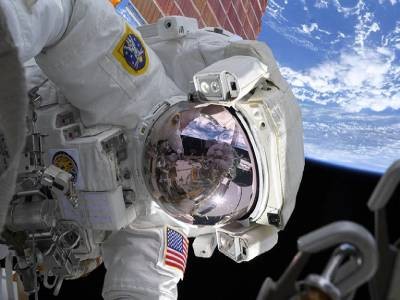
Astronauts have conducted nearly 3,000 science experiments aboard the ISS
But on the morning before lift-off in September 2021, she felt strangely calm. “I kept thinking, ‘When am I going to get nervous?’” she says. “The 9-minute ride to space — I was just having the time of my life.”
Arceneaux is a sign of what’s to come, as companies such as SpaceX, based in Hawthorne, California, ferry more and more civilians to space on massively expensive commercial flights. For decades, the health effects of space travel have been mapped by studying professional astronauts , many of whom trained mentally and physically for years to get the job. A suite of scientific reports published on 11 June now aims to chart how spaceflight affects space tourists with a wider variety of health histories.
The studies show that just a few days in orbit can cause immune-cell disruption, dehydration and cloudy thinking — but that most of these conditions revert to normal soon after the travellers return to Earth.
Taken together, the 44 reports — written by authors at more than 25 countries and 100 institutions — comprise the largest catalogue of data detailing space travel’s impact on the human body 1 . “This is the beginning of precision medicine for spaceflight,” says Christopher Mason, a geneticist at Weill Cornell Medicine in New York City, who is a co-author on some of the papers. “Let’s bring the full armamentarium of modern molecular biologist tools to bear for these crews who are regular people.”
A ‘strange environment’
Most of the data on the health effects of spaceflight have so far been collected from white men aged 30 years old and beyond, many with a military background, says Mathias Basner, an epidemiologist who studies astronaut behavioural health at the University of Pennsylvania Perelman School of Medicine in Philadelphia, and a co-author on some of the papers. Little is known about how other groups of people will respond to the unique stresses of spaceflight, including radiation exposure and microgravity.

Exclusive: How NASA astronauts are training to walk on the Moon in 2026
That means that the risks could be higher. “Space is a very strange environment,” says Basner.
On the other hand, commercial spaceflights also launch more often than governmental ones, run by national space agencies such as NASA, do. So, on the plus side, researchers can collect data more quickly than before — and potentially from a more diverse population, Basner adds.
Among the latest studies are some evaluating the health of the crew of SpaceX’s 2021 Inspiration4 flight , which was the first all-civilian spaceflight to orbit Earth. The four passengers on that flight, including two men and two women — one of whom was Arceneaux — ranged from ages 29 to 51 years old.
For the roughly three days that they were in orbit, Arceneaux and her crewmates collected saliva, urine and blood samples, conducted ultrasounds on themselves, took cognitive tests and wore fitness trackers 2 . Researchers assessed those specimens and data and found some physiological changes that had previously been registered only on longer spaceflights. These included alterations in immune-cell function, and a lengthening of telomeres, the caps at the end of chromosomes.
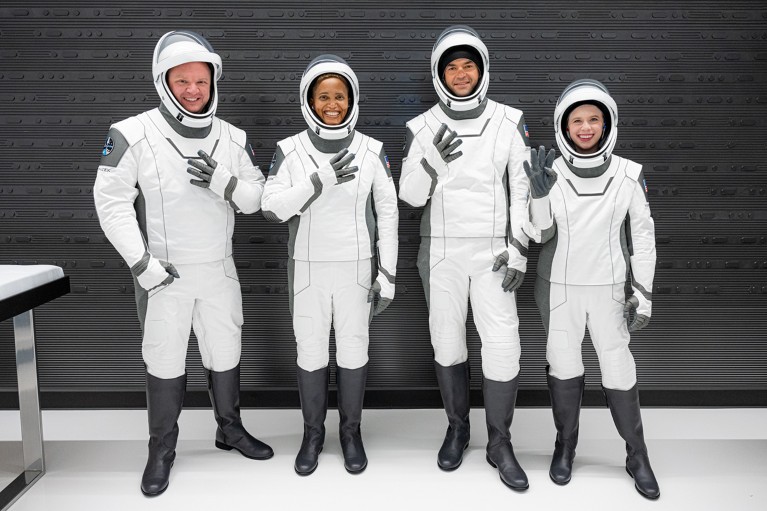
The crew of Inspiration4 (from left) were avionics engineer Chris Sembroski, geoscientist and artist Sian Proctor, billionaire businessman Jared Isaacman and physician’s assistant and childhood cancer survivor Hayley Arceneaux. Credit: Inspiration4 crew/John Kraus
However, about 95% of the changes reverted soon after the crew landed, Mason says. Some of the remaining changes persisted for at least three months after landing, suggesting a longer recovery period.
With data from only four people, it is difficult to draw firm conclusions about the effects of spaceflight on civilians. Where possible, the researchers compared their results with data from astronauts that worked with NASA or the Japan Aerospace Exploration Agency. They also drew upon data from mice and cell cultures that were grown in space, exposed to radiation or grown in microgravity.
When you see the same biomarker levels rising over and over again across three different missions and three different sets of people, “that’s when you start believing it”, says Afshin Beheshti, a systems biologist at the Blue Marble Space Institute of Science in Seattle, Washington, and a co-author on several of the studies.
A spaceflight catalogue
Mason and his colleagues developed a database called the Space Omics and Medical Atlas (SOMA) to collect this and future health information from civilian space travellers and professional astronauts, as well as a biobank to store their samples. These, along with the wide range of data collected from Inspiration4, are exciting developments for the field, says Susan Bloomfield, a systems physiologist who studies the biological effects of spaceflight at Texas A&M University in College Station.
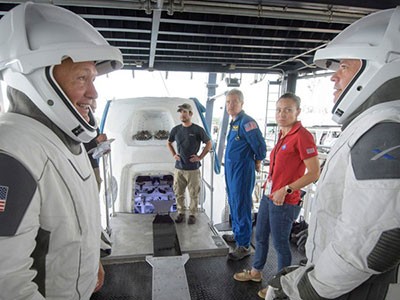
SpaceX to launch astronauts — and a new era of private human spaceflight
But Bloomfield would like to see more demographic details, such as age, sex and past medical history, included in these and future publications that use the SOMA database. Although privacy concerns have limited the release of such information in the past , Bloomfield argues that it is important for researchers to have access to data that could help to ensure the safety of future space travellers. Mason notes that SOMA contains such data, but cannot release it publicly.
It’s a surprise that the Inspiration4 flight — a relatively short trip — prompted some of the same physiological changes seen in astronauts who have been on much longer missions, says Catherine Yeung, a pharmacist who studies the effects of spaceflight on people’s kidneys at the University of Washington in Seattle. Gathering more of this data could help researchers to design interventions that mitigate or at least predict the effects of spaceflight on the body, for both civilians and astronauts alike, says Basner.
For example, someone’s data might point to them being at particular risk for severe motion sickness in space, he says, and knowing that could allow physicians to provide a treatment — or at least advise the person to avoid going altogether. “If you’re going to spend three days vomiting in a bag, you might not want to pay US$10 million for that ticket.”
Nature 630 , 536-537 (2024)
doi: https://doi.org/10.1038/d41586-024-01705-1
Overbey, E. G. et al. Nature https://doi.org/10.1038/s41586-024-07639-y (2024).
Article Google Scholar
Jones, C. W. et al. Nature https://doi.org/10.1038/s41586-024-07648-x (2024).
Download references
Reprints and permissions
Related Articles

Astronaut twins study raises questions about genetic privacy
Astronaut twins study spots subtle genetic changes caused by space travel
- Research data
- Health care
- Cell biology

Not all ‘open source’ AI models are actually open: here’s a ranking
News 19 JUN 24

Cyberattacks are hitting research institutions — with devastating effects
News 13 JUN 24

Open access is working — but researchers in lower-income countries enjoy fewer benefits
Nature Index 11 JUN 24

Put people at the heart of schizophrenia research
World View 19 JUN 24

Could rats and dogs detect disease better than the finest lab equipment?
Outlook 19 JUN 24

How climate change is hitting Europe: three graphics reveal health impacts
News 18 JUN 24

Human neuroscience is entering a new era — it mustn’t forget its human dimension
Editorial 19 JUN 24

Single-cell and spatial atlases of spinal cord injury in the Tabulae Paralytica
Article 19 JUN 24
Harnessing landrace diversity empowers wheat breeding
Article 17 JUN 24
ZJU 100 Young Professor
Promising young scholars who can independently establish and develop a research direction.
Hangzhou, Zhejiang, China
Zhejiang University
Qiushi Chair Professor
Distinguished scholars with notable achievements and extensive international influence.
Research Postdoctoral Fellow - MD
Houston, Texas (US)
Baylor College of Medicine (BCM)
Postdoctoral position for EU project ARTiDe: A novel regulatory T celltherapy for type 1 diabetes
Development of TCR-engineered Tregs for T1D. Single-cell analysis, evaluate TCRs. Join INEM's cutting-edge research team.
Paris, Ile-de-France (FR)
French National Institute for Health Research (INSERM)
Postdoc or PhD position: the biology of microglia in neuroinflammatory disease
Join Our Team! Investigate microglia in neuroinflammation using scRNAseq and genetic tools. Help us advance CNS disease research at INEM!
Sign up for the Nature Briefing newsletter — what matters in science, free to your inbox daily.
Quick links
- Explore articles by subject
- Guide to authors
- Editorial policies
Scientists probe a space mystery: Why do people age faster during space travel?
Research finds bodies in space were stressed and showed dramatic signs of aging during the journey. but 95% of the indicators studied returned to normal within a few months..

Humanity's future may involve getting to a planet other than Earth ‒ but first people will have to survive the journey. That's why in a new series of papers scientists explore the impact of space travel on the human body from skin to kidneys to immune cells to genes.
Four civilian astronauts allowed themselves to be researched from top to bottom as they circled in low-Earth orbit for three days aboard the 2021 SpaceX Inspiration4 mission and then returned to their normal lives.
One of the most important observations was that although their bodies were stressed and showed dramatic signs of aging during the journey, 95% of the indicators studied returned to normal within a few months.
Radiation exposure apparently causes the acceleration of disease and damages cells "even in three to five days," Susan Bailey, a co-author on many of the studies and a radiation cancer biologist at Colorado State University in Fort Collins, said in a Monday video call with reporters.
Space news: Starship splashes down for first time in 4th test
Bailey and other scientists have studied astronauts before, most famously, identical twins Scott and Mark Kelly, during and after most of the 520 days Scott spent in space. ( Mark is now a senator from Arizona , choosing to run for political office after his wife, Congresswoman Gabby Giffords , now a gun control advocate , was shot in the head by a constituent.)
But this collection of studies, published Tuesday in Nature and related journals , shows the impact of space travel both on more people and also on a more diverse group, not just the exclusive people who can pass NASA's rigorous selection process.
Hayley Arceneaux , for instance, a physician assistant who served as the mission's medical director, was treated for cancer at age 10 and was one of the rare women in space. At 29, Arceneaux was also the youngest-ever space traveler.
Each of the four members of Inspiration4 represented a different decade of life, and began to provide the kind of diversity that will be crucial to understanding how space travel may impact people of different ages and health status and with different lived experiences, the researchers said.
"It really provides the foundation as we think ahead and more futuristically," Bailey said. The papers, she said, encouraged her and her peers to "think a little bit more about what it's really going to take for people to live in space for long periods of time, to thrive, to reproduce. How is all of that really going to happen?"
Bailey spent months studying the biology of the space travelers. But Monday's video conference was the first time she'd seen them face-to-face. "I'm familiar with your DNA," she told Arceneaux and fellow space traveler Chris Sembroski. "But it's nice to meet you."
Better understanding the damage that accumulates and how the body adapts to space travel will also lead researchers to treatments and fixes, said Bailey and the two other co-authors on the call, Christopher Mason, professor of genomics, physiology, and biophysics at Weill Cornell Medicine in New York, and Afshin Beheshti, an expert in bioinformatics at Blue Marble Space Institute of Science in Seattle.
In addition to age-related diseases, the papers revealed other problems space travelers can develop, like kidney stones. "Here we can treat that, but a kidney stone halfway to Mars, how are you going to treat that?" Beheshti wondered aloud. "That wasn't on the radar before" these papers.
"As we start to unravel some of this," Bailey added, "we'll improve not only our ability to deal with radiation exposure but also be addressing some of these age-related pathologies like cardiovascular disease that certainly could influence astronauts' performance en route to Mars."
Another insight: Women seem to recover faster from space damage than men, though Mason cautioned that more women need to be studied to better understand the effect and that faster recovery could come at the expense of higher long-term risk of breast and lung cancer from extended radiation exposure.
The lessons learned from space travelers could help folks on Earth, too, the researchers said.
Learning how to keep cells safe from radiation, for instance, might be transferable to help minimize damage to cancer patients undergoing radiation treatments, Mason said.
New protection measures could also be useful for people exposed to radiation at work or in case of a nuclear reactor disaster like the meltdown at the Fukushima Daiichi power plant in Japan after the 2011 earthquake there.
Because space travel speeds up aging, learning how to reverse or slow that process could help "extend health-span for us mere earthlings as well," Bailey said. The new skin study, for example, suggests approaches that might be used to help people keep their skin looking younger longer.
"There's all kinds of things that could potentially benefit people on Earth," she said.
The Inspiration4 mission, which raised $250 million for St. Jude Children's Research Hospital in Memphis , Tennessee, also relied on some experimental technologies for recording medical information, including a handheld ultrasound imaging device, smartwatch wearables, a measurement device to check for eye alignment and new methods for profiling the immune system as well as other cells and molecules.
These devices and approaches could be useful for Earth-bound settings that are far from major urban medical centers, Mason said.
Relying on civilians rather than NASA astronauts also made it easier to study the space travelers, who signed waivers and aren't subject to government regulations, he said. Their data will be made available to other researchers.
Both Arceneaux and Sembroski, a data engineer who works for the space technologies company Blue Origin, said they loved their spaceflight and would do it again in a second if given the chance. But they also hope many others are given the same opportunity.
"We're not going to see the civilization in space that we want without people being willing to share that experience," Sembroski said about sharing his data for research. "It was fun to be part of this."
"Our mission had, not only a lot of heart behind it," Arceneaux added, "but we really wanted to make a scientific impact."
Arceneaux said she doesn't mind the mark left by the biopsy used to study how her skin reacted to space travel. "I love my space scar!" she said.
"Better than a tattoo," Bailey responded.
The best news from the research on both Kelly and the Inspiration4 travelers, Mason said, is that there's "no show-stopper. There's no reason we shouldn't be able to get to Mars and back."
Radiation exposure probably means people shouldn't be taking multiple trips to and from the red planet, he said. But "so far, from all we've observed, the body is successfully adapting to the space environment."
Karen Weintraub can be reached at [email protected].

Suggested Searches
Climate Change
- Expedition 64
- Mars perseverance
- SpaceX Crew-2
- International Space Station
- View All Topics A-Z
Humans in Space
Earth & Climate
The solar system, the universe, aeronautics, learning resources, news & events.
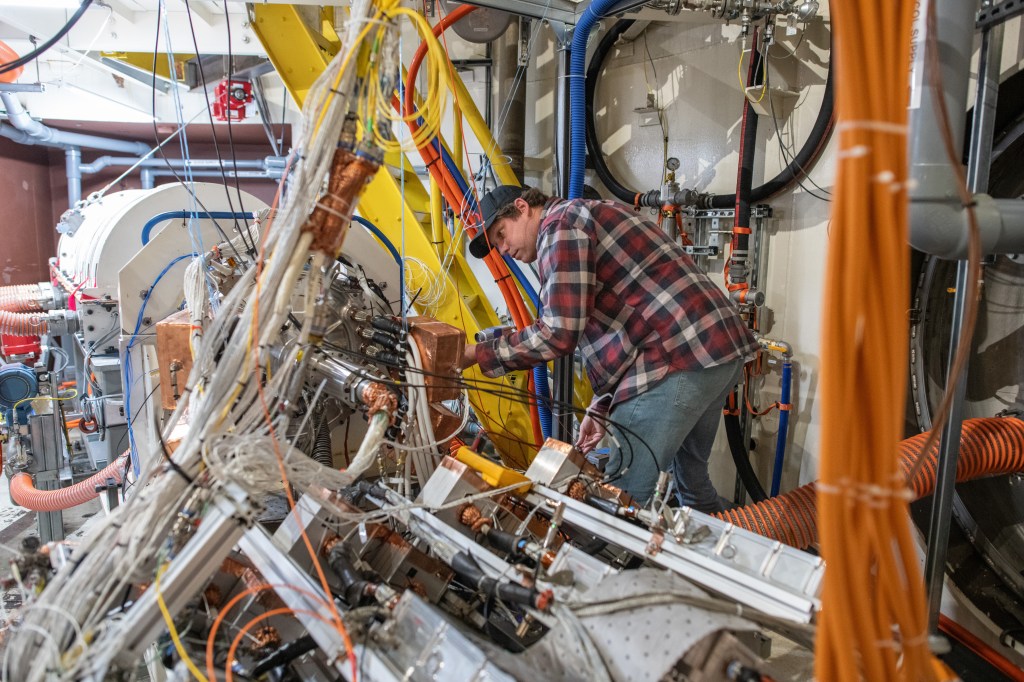
NASA, MagniX Altitude Tests Lay Groundwork for Hybrid Electric Planes
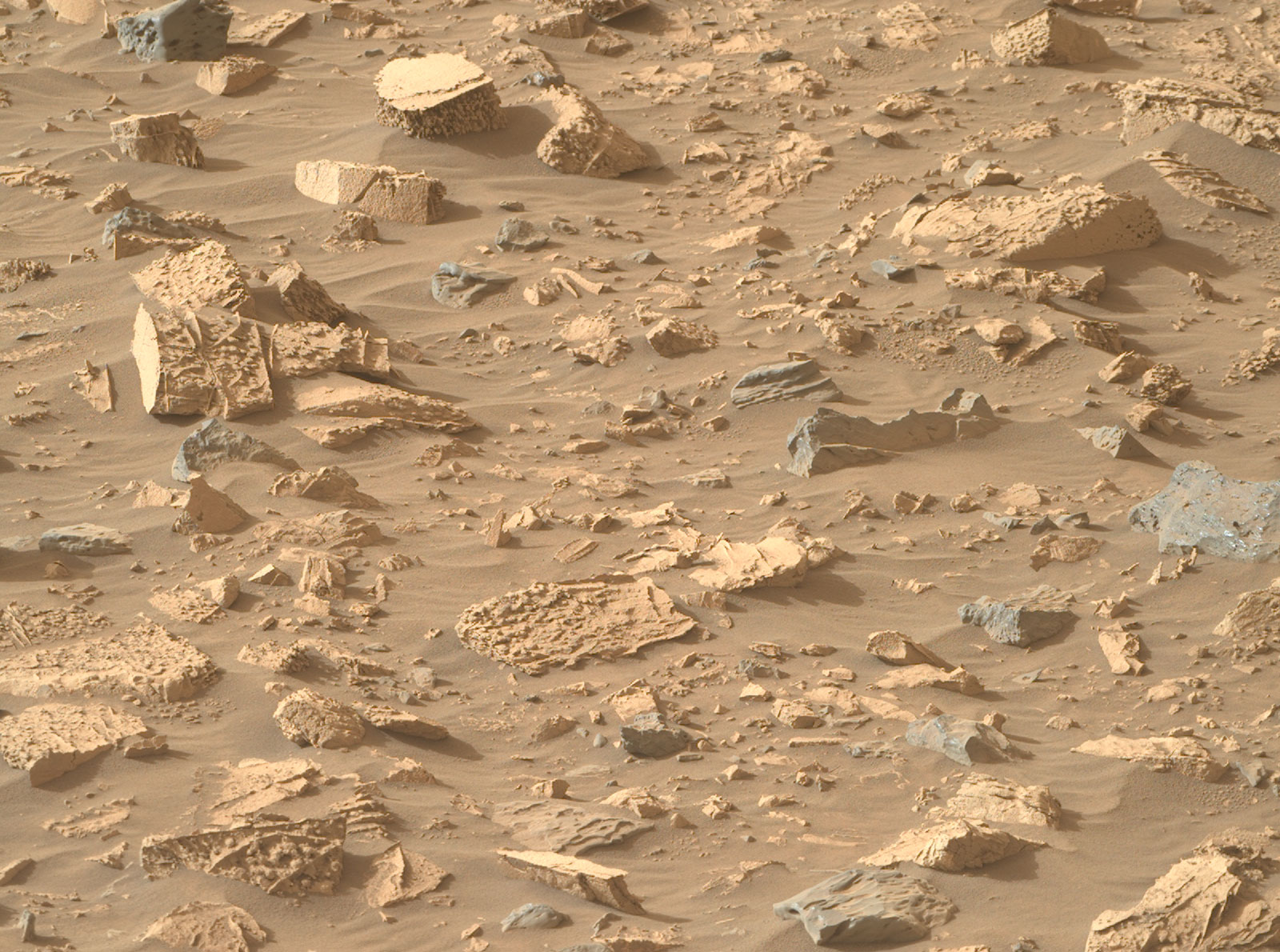
Perseverance Finds Popcorn on Planet Mars
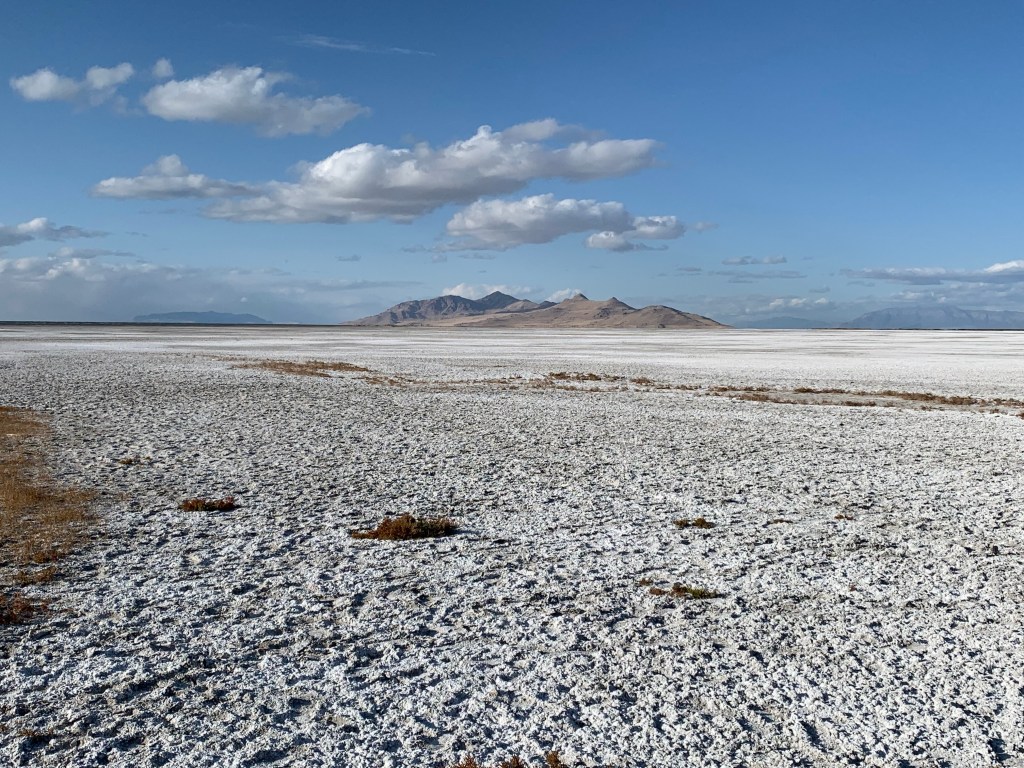
NASA Satellites Find Snow Didn’t Offset Southwest US Groundwater Loss
- Search All NASA Missions
- A to Z List of Missions
- Upcoming Launches and Landings
- Spaceships and Rockets
- Communicating with Missions
- James Webb Space Telescope
- Hubble Space Telescope
- Why Go to Space
- Commercial Space
- Destinations
- Living in Space
- Explore Earth Science
- Earth, Our Planet
- Earth Science in Action
- Earth Multimedia
- Earth Science Researchers
- Pluto & Dwarf Planets
- Asteroids, Comets & Meteors
- The Kuiper Belt
- The Oort Cloud
- Skywatching
- The Search for Life in the Universe
- Black Holes
- The Big Bang
- Dark Energy & Dark Matter
- Earth Science
- Planetary Science
- Astrophysics & Space Science
- The Sun & Heliophysics
- Biological & Physical Sciences
- Lunar Science
- Citizen Science
- Astromaterials
- Aeronautics Research
- Human Space Travel Research
- Science in the Air
- NASA Aircraft
- Flight Innovation
- Supersonic Flight
- Air Traffic Solutions
- Green Aviation Tech
- Drones & You
- Technology Transfer & Spinoffs
- Space Travel Technology
- Technology Living in Space
- Manufacturing and Materials
- Science Instruments
- For Kids and Students
- For Educators
- For Colleges and Universities
- For Professionals
- Science for Everyone
- Requests for Exhibits, Artifacts, or Speakers
- STEM Engagement at NASA
- NASA's Impacts
- Centers and Facilities
- Directorates
- Organizations
- People of NASA
- Internships
- Our History
- Doing Business with NASA
- Get Involved
- Aeronáutica
- Ciencias Terrestres
- Sistema Solar
- All NASA News
- Video Series on NASA+
- Newsletters
- Social Media
- Media Resources
- Upcoming Launches & Landings
- Virtual Events
- Sounds and Ringtones
- Interactives
- STEM Multimedia
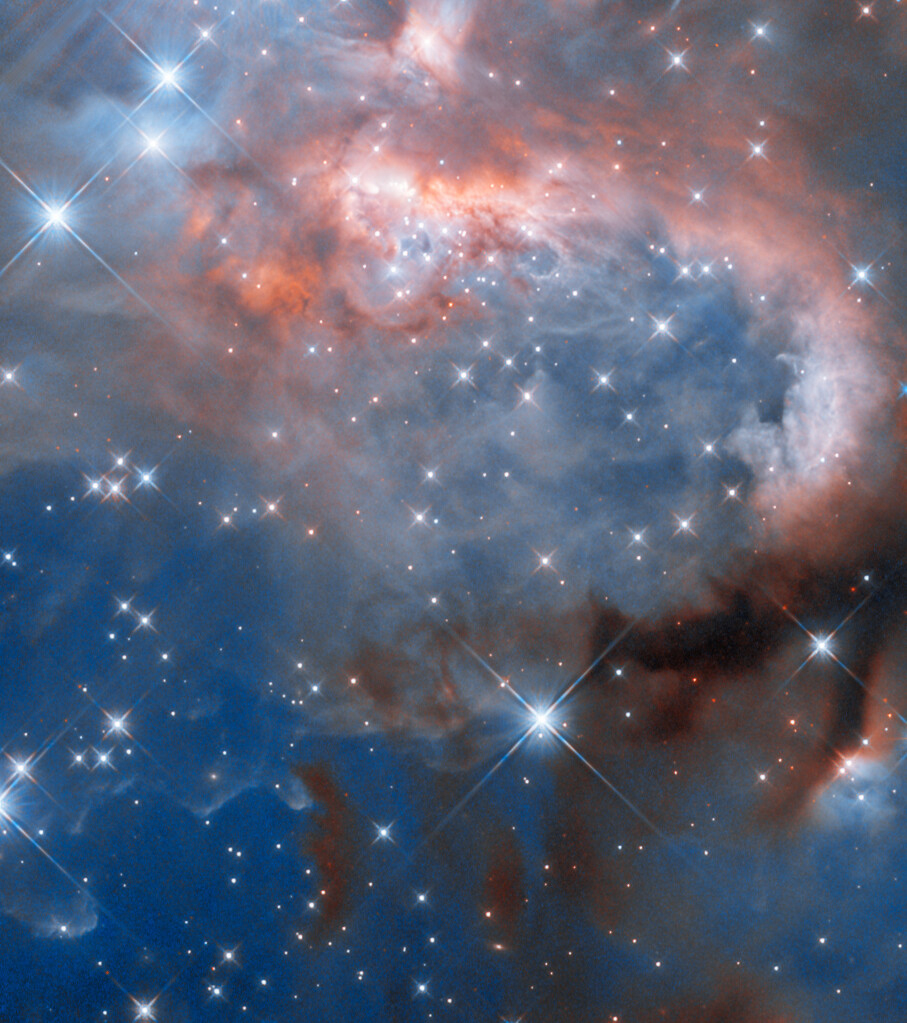
Hubble Captures Infant Stars Transforming a Nebula
Why scientists are intrigued by air in nasa’s mars sample tubes.
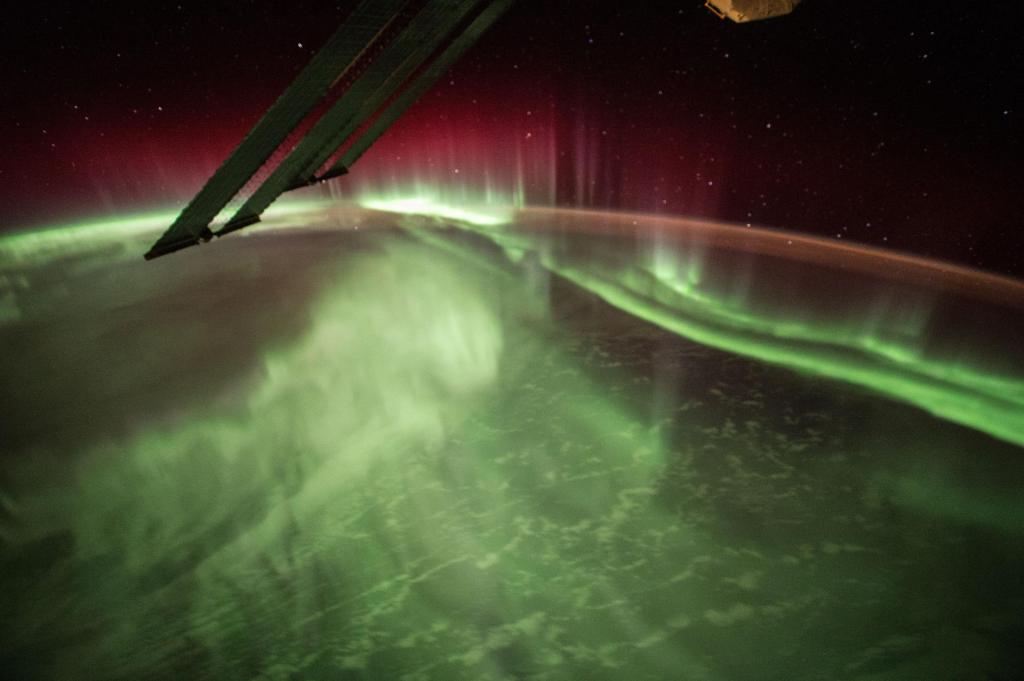
Studying the Sun
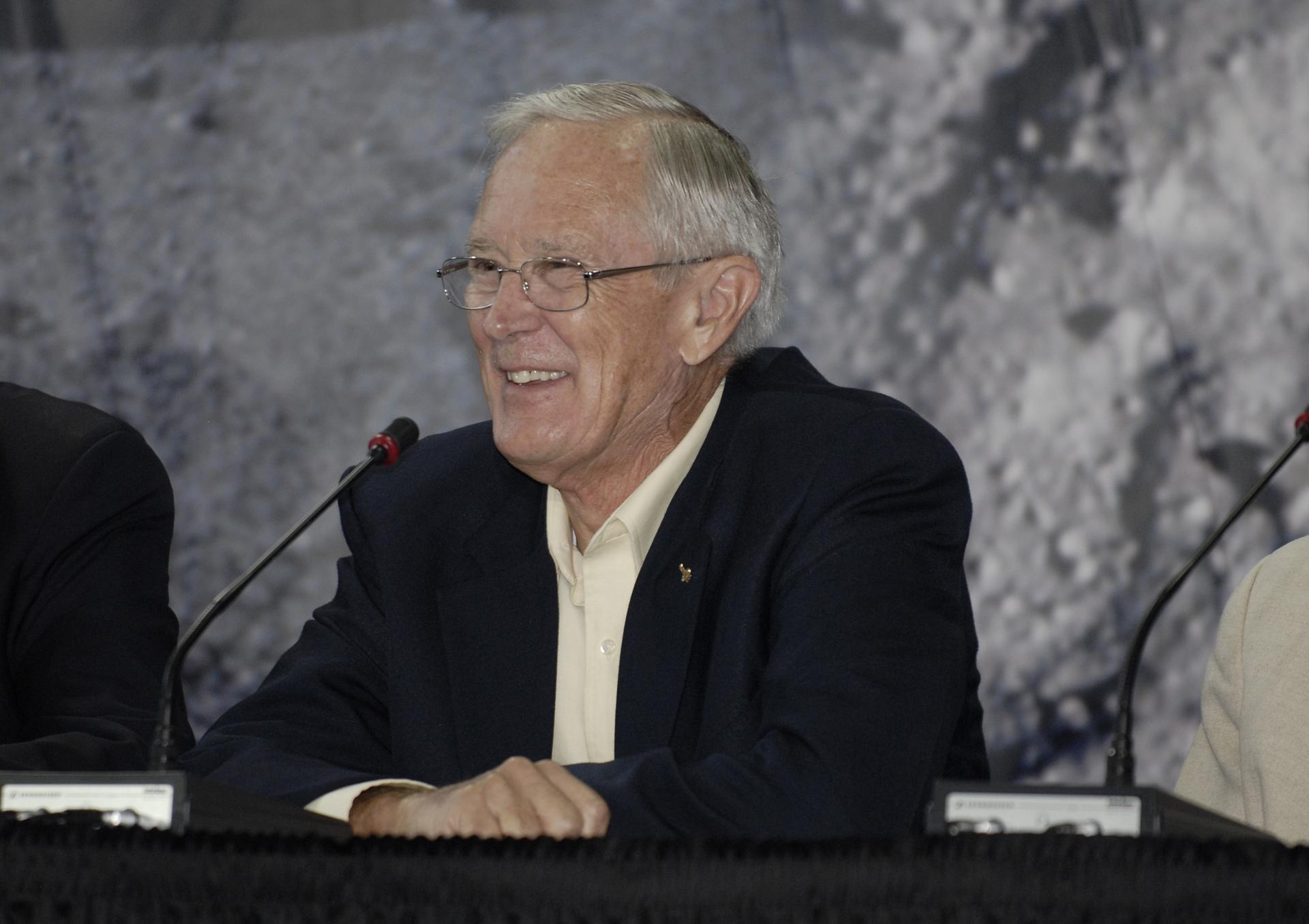
Former Astronaut Charles M. Duke, Jr.

Lakita Lowe: Leading Space Commercialization Innovations and Fostering STEM Engagement

Former Astronaut Russell L. “Rusty” Schweickart
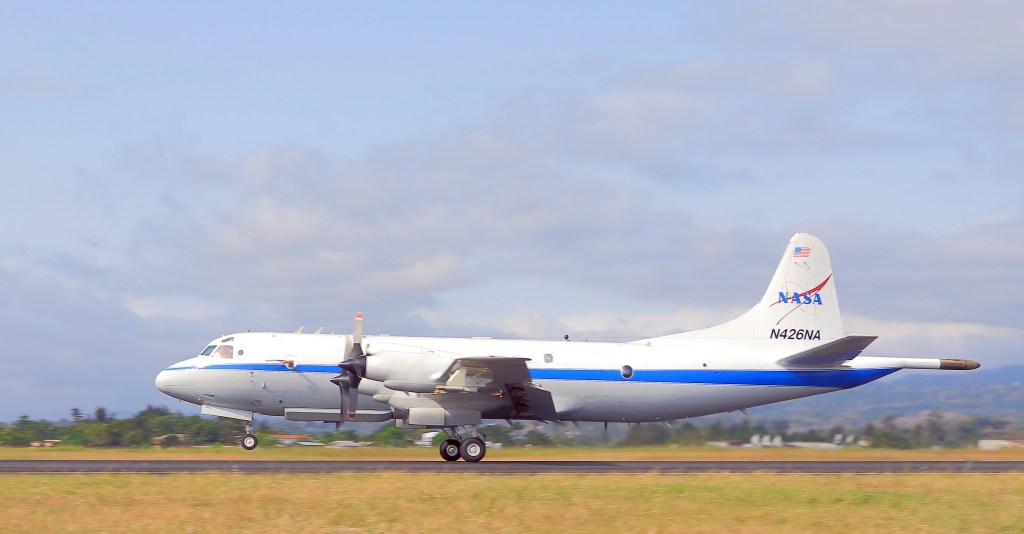
NASA-Led Mission to Map Air Pollution Over Both U.S. Coasts
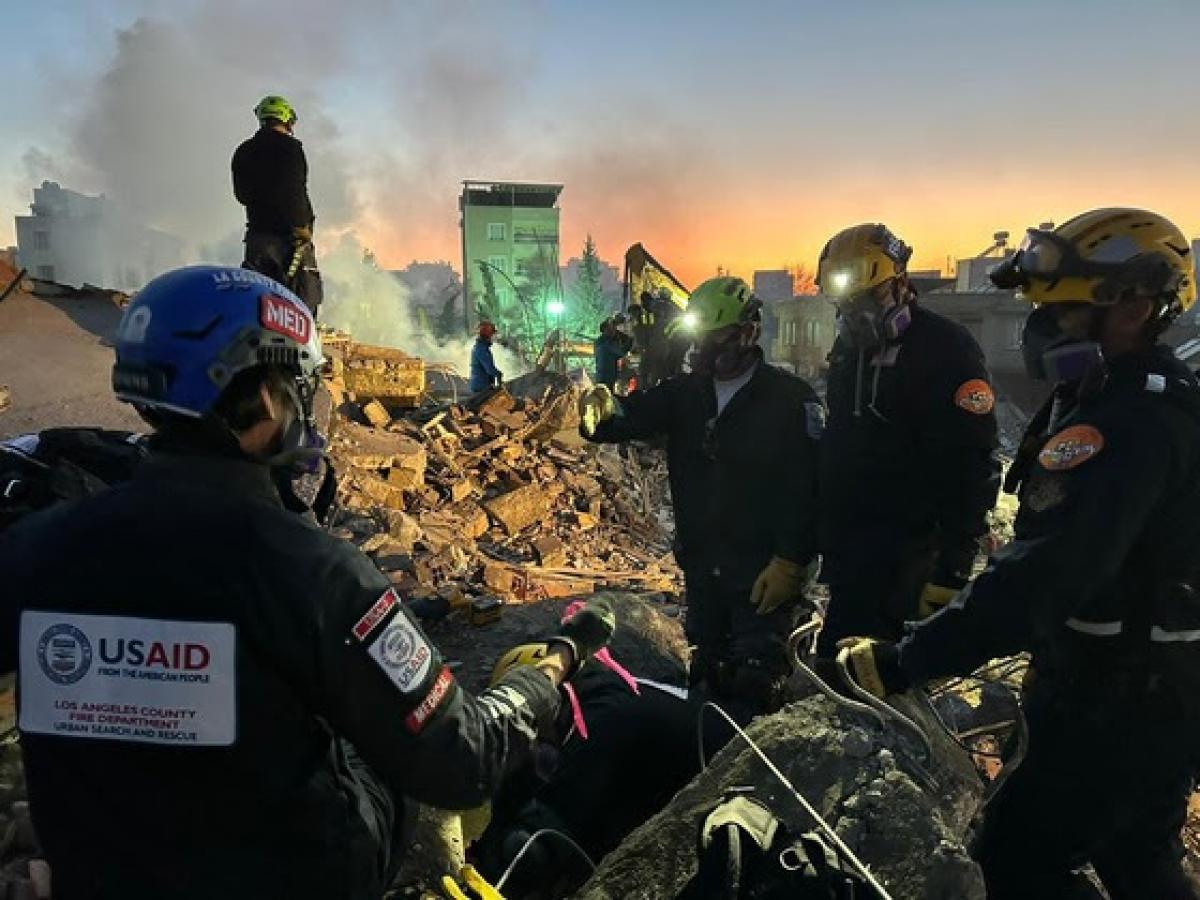
NASA Announces New System to Aid Disaster Response
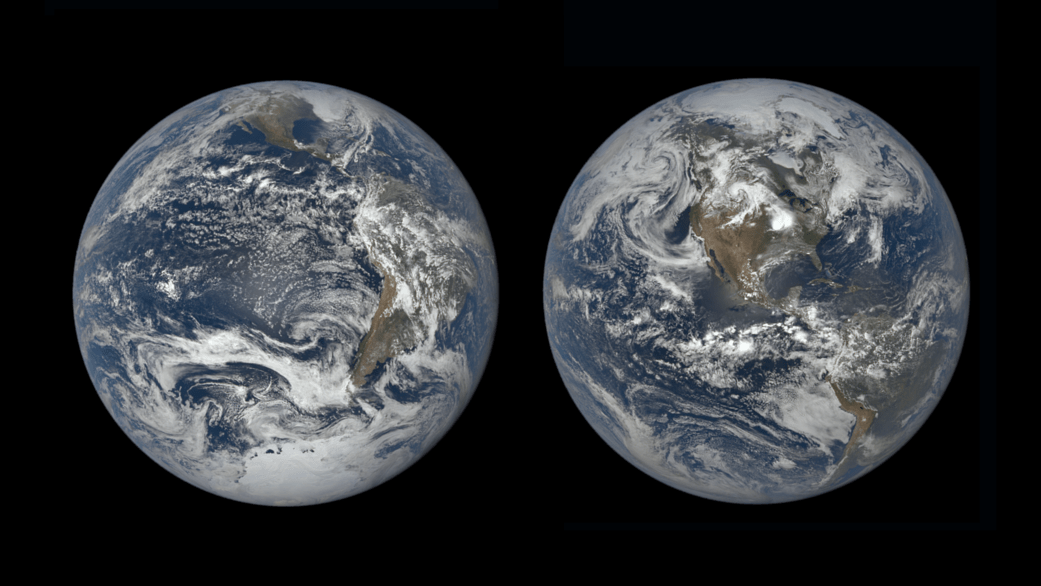
Tropical Solstice Shadows
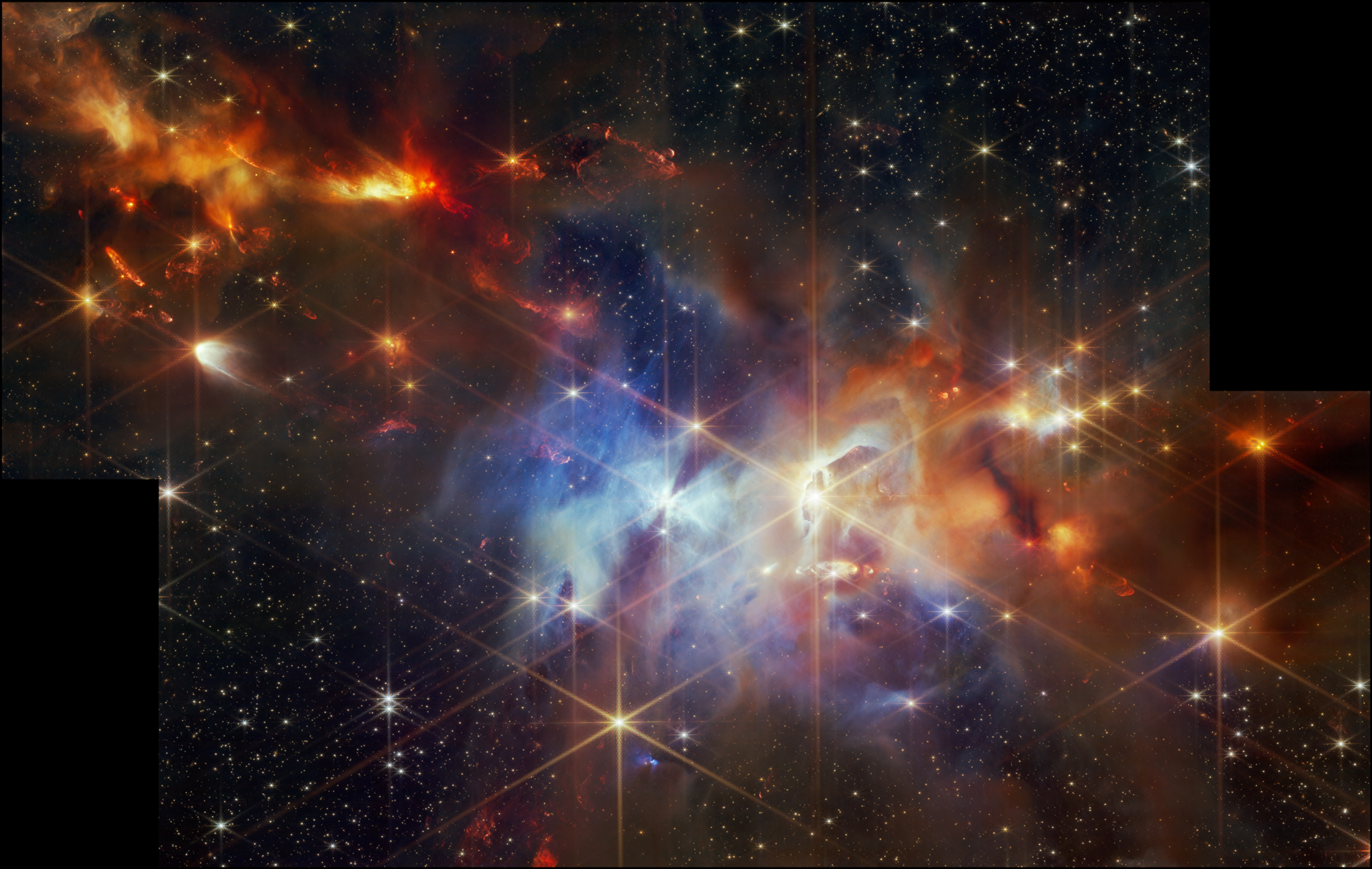
First of Its Kind Detection Made in Striking New Webb Image
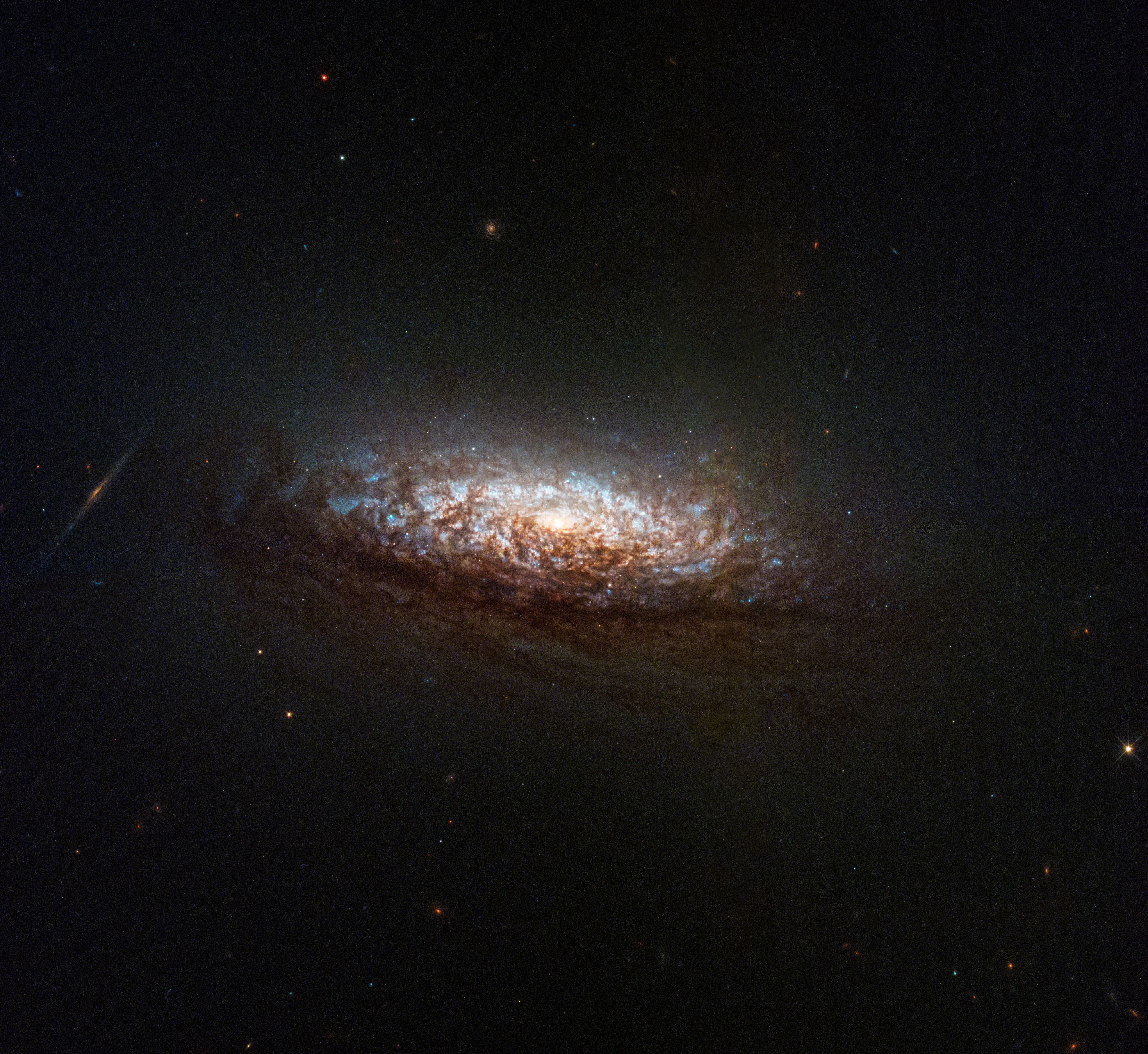
NASA Releases Hubble Image Taken in New Pointing Mode
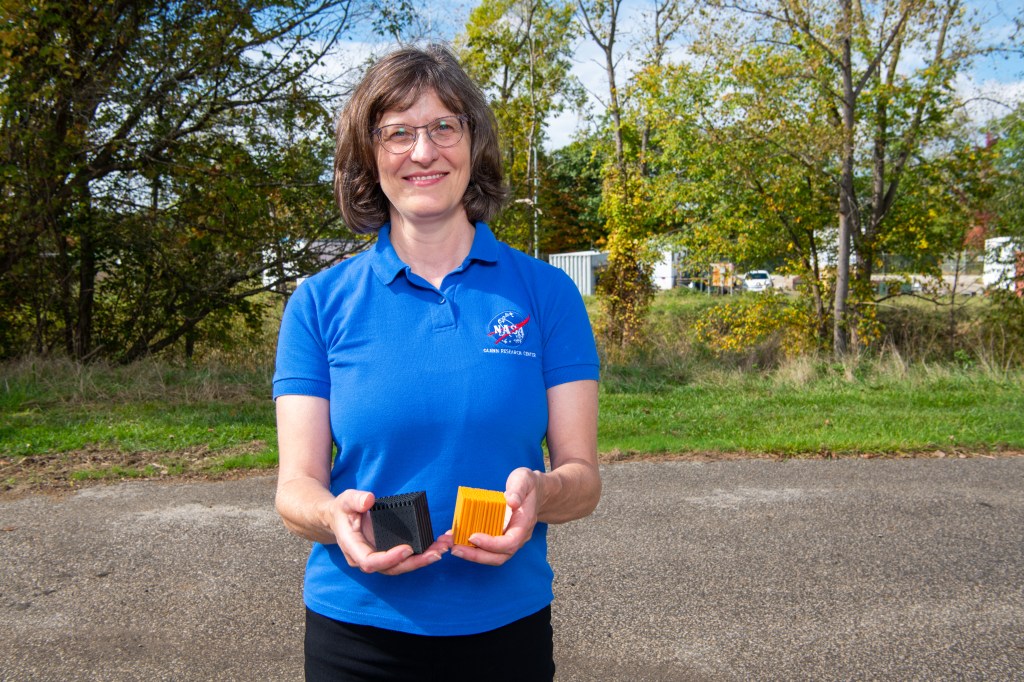
NASA Engineer Honored as Girl Scouts ‘Woman of Distinction’
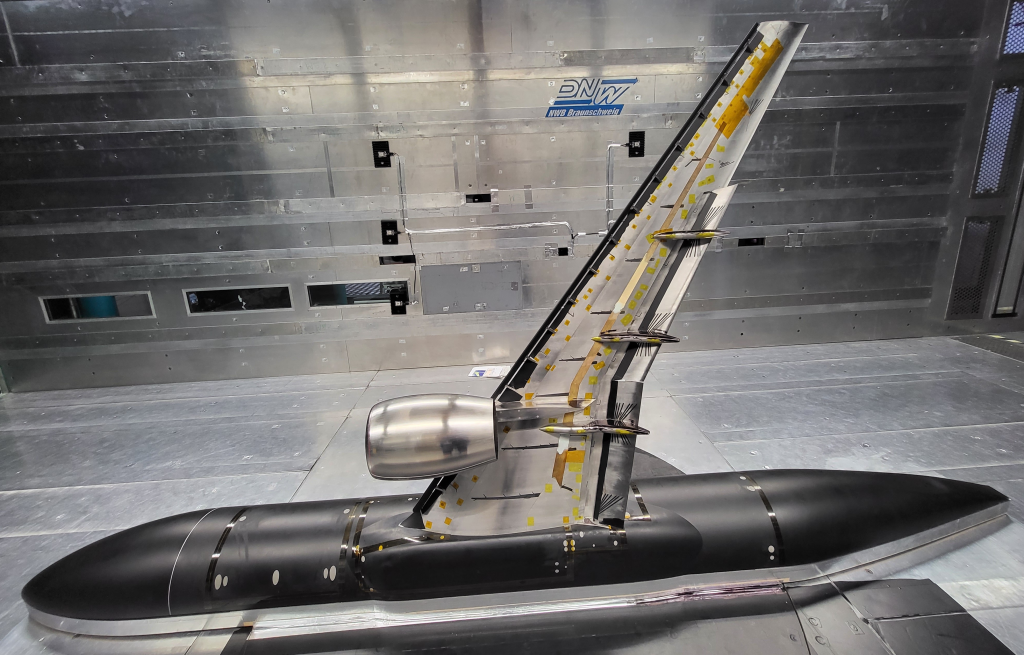
Globetrotting NASA Research Model Increases Accuracy

Augmented Reality Speeds Spacecraft Construction at NASA Goddard
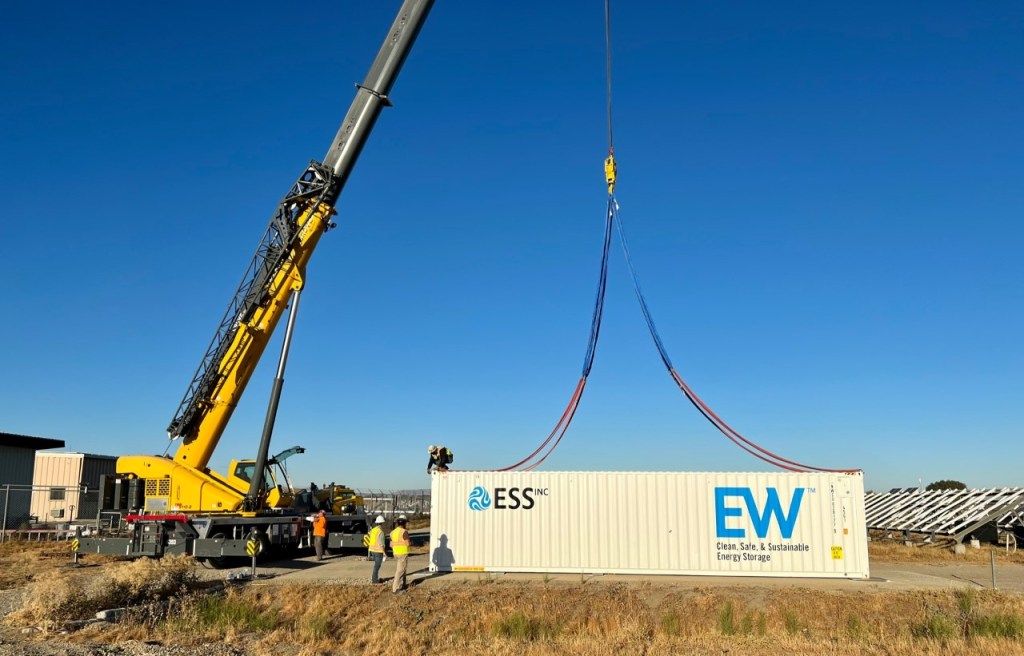
Giant Batteries Deliver Renewable Energy When It’s Needed
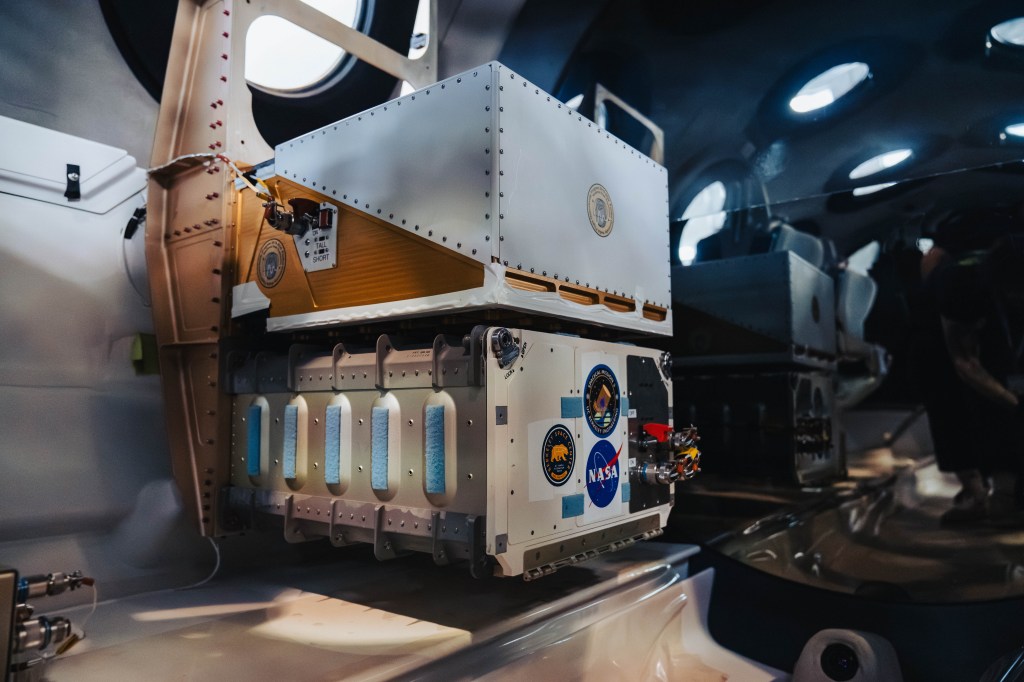
Flight Test Sheds New Light on In-Space 3D Printing, Propellant Slosh

Slow Your Student’s ‘Summer Slide’ and Beat Boredom With NASA STEM
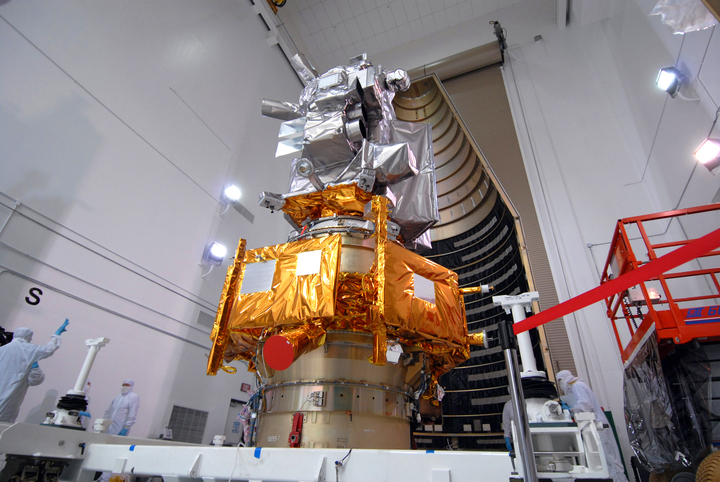
15 Years Ago: Lunar Reconnaissance Orbiter Begins Moon Mapping Mission
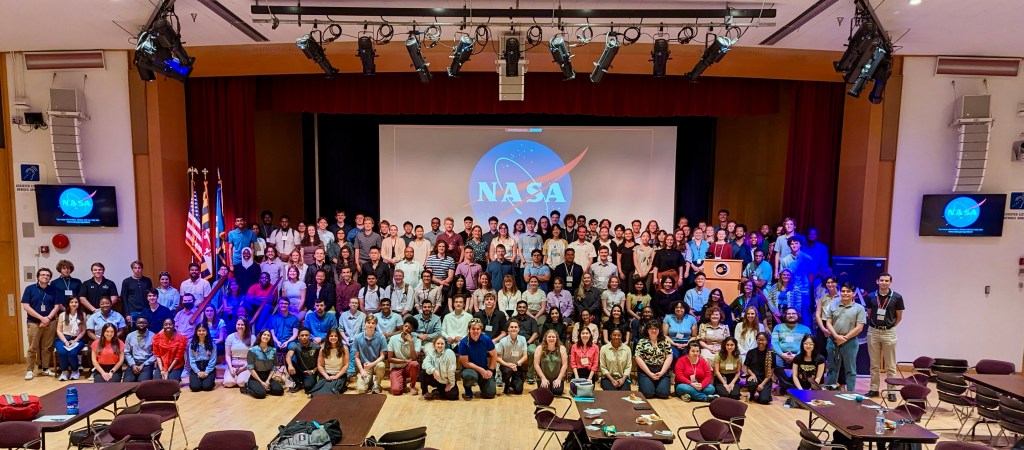
NASA Interns Blast Off for Their First Week at Goddard
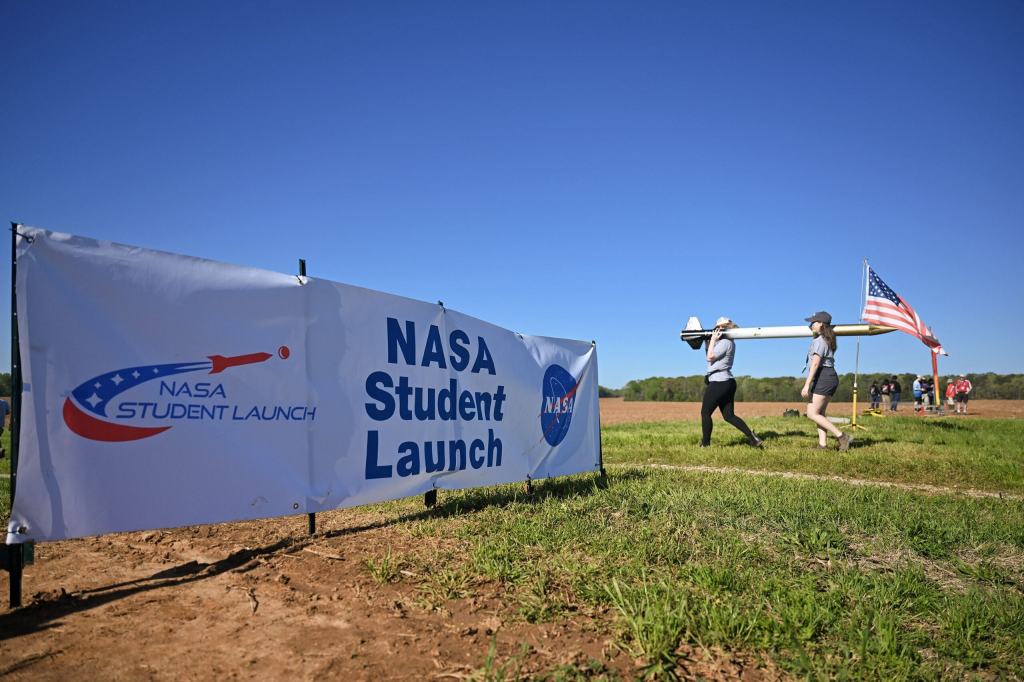
NASA Announces Winners of 2024 Student Launch Competition
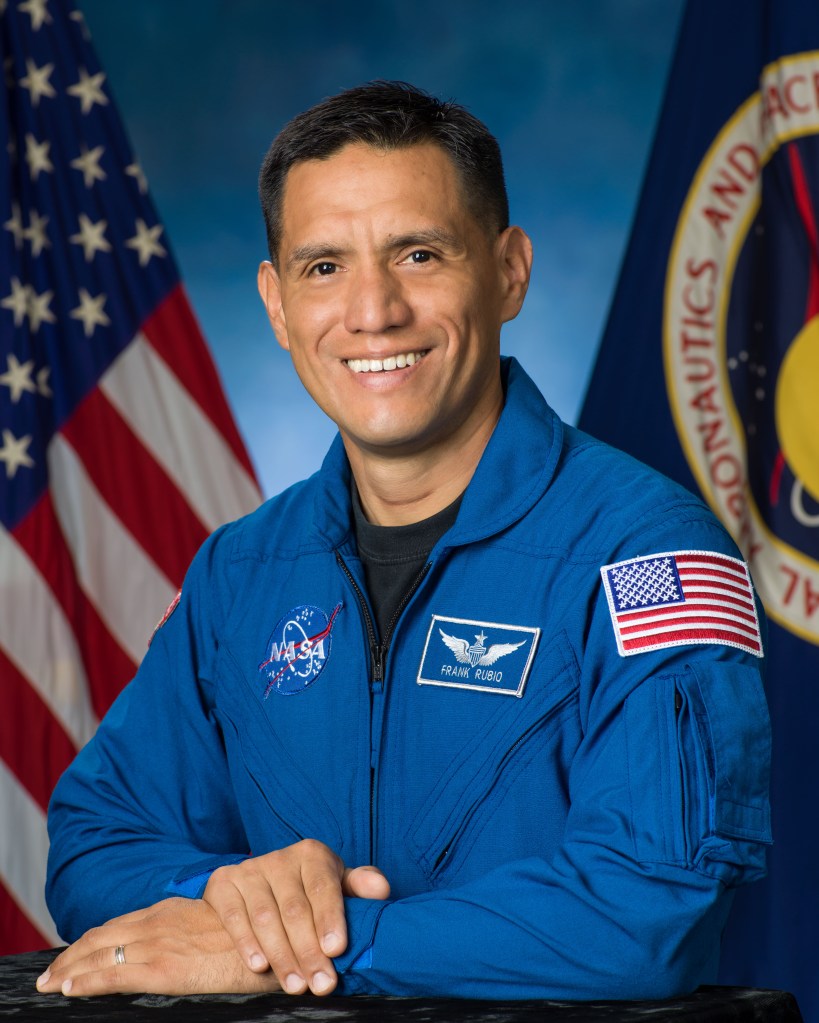
Astronauta de la NASA Frank Rubio
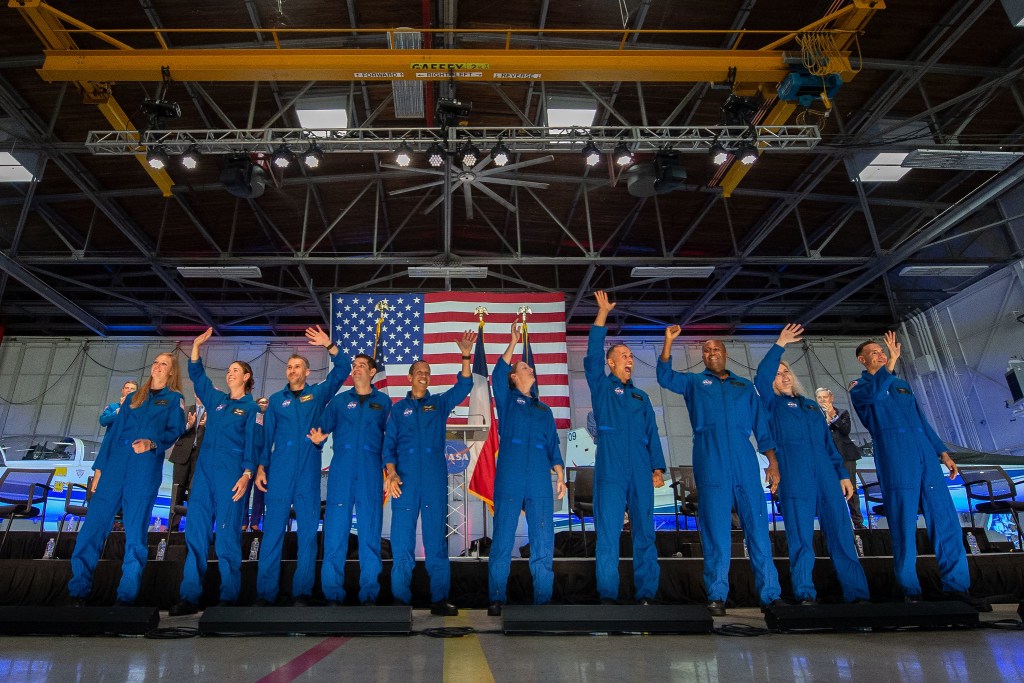
Diez maneras en que los estudiantes pueden prepararse para ser astronautas

Astronauta de la NASA Marcos Berríos
Nasa, global astronomers await rare nova explosion.
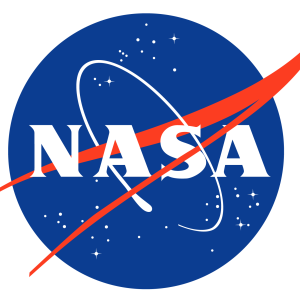
Beth Ridgeway
Finding t coronae borealis, a coordinated scientific approach.
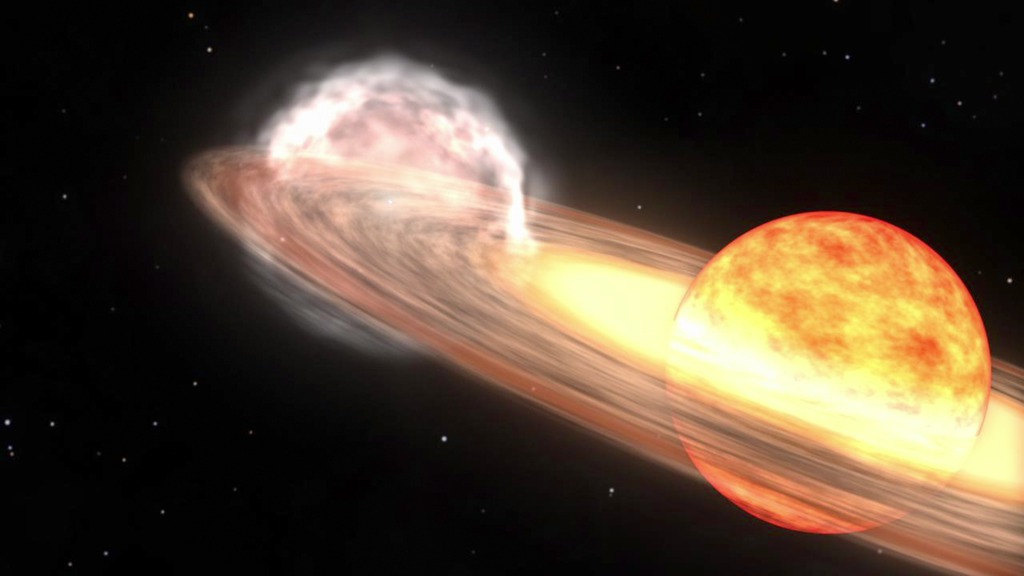
Around the world this summer, professional and amateur astronomers alike will be fixed on one small constellation deep in the night sky. But it’s not the seven stars of Corona Borealis, the “Northern Crown,” that have sparked such fascination.
It’s a dark spot among them where an impending nova event – so bright it will be visible on Earth with the naked eye – is poised to occur.
“It’s a once-in-a-lifetime event that will create a lot of new astronomers out there, giving young people a cosmic event they can observe for themselves, ask their own questions, and collect their own data,” said Dr. Rebekah Hounsell, an assistant research scientist specializing in nova events at NASA’s Goddard Space Flight Center in Greenbelt, Maryland. “It’ll fuel the next generation of scientists.”
T Coronae Borealis, dubbed the “Blaze Star” and known to astronomers simply as “T CrB,” is a binary system nestled in the Northern Crown some 3,000 light-years from Earth. The system is comprised of a white dwarf – an Earth-sized remnant of a dead star with a mass comparable to that of our Sun – and an ancient red giant slowly being stripped of hydrogen by the relentless gravitational pull of its hungry neighbor.
The hydrogen from the red giant accretes on the surface of the white dwarf, causing a buildup of pressure and heat. Eventually, it triggers a thermonuclear explosion big enough to blast away that accreted material. For T CrB, that event appears to reoccur, on average, every 80 years.
Don’t confuse a nova with a supernova, a final, titanic explosion that destroys some dying stars, Hounsell said. In a nova event, the dwarf star remains intact, sending the accumulated material hurtling into space in a blinding flash. The cycle typically repeats itself over time, a process which can carry on for tens or hundreds of thousands of years.
“There are a few recurrent novae with very short cycles, but typically, we don’t often see a repeated outburst in a human lifetime, and rarely one so relatively close to our own system,” Hounsell said. “It’s incredibly exciting to have this front-row seat.”
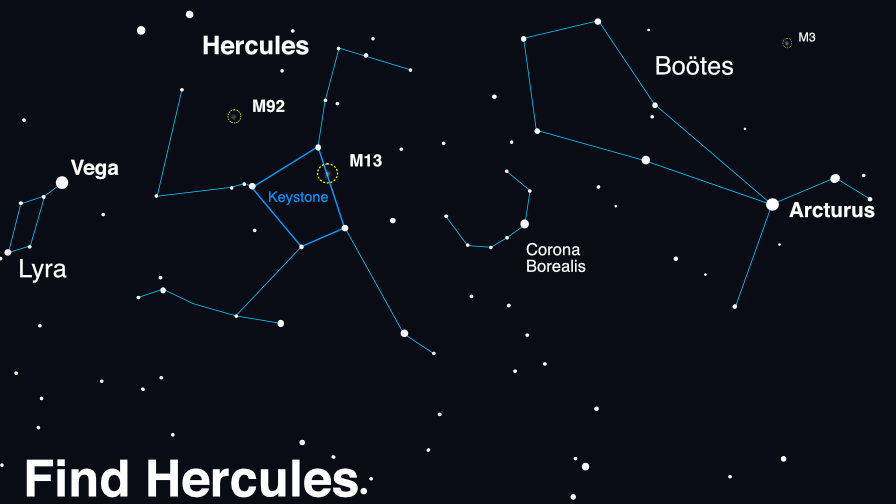
The first recorded sighting of the T CrB nova was more than 800 years ago, in autumn 1217, when a man named Burchard, abbot of Ursberg, Germany, noted his observance of “a faint star that for a time shone with great light.”
The T CrB nova was last seen from Earth in 1946. Its behavior over the past decade appears strikingly similar to observed behavior in a similar timeframe leading up to the 1946 eruption. If the pattern continues, some researchers say, the nova event could occur by September 2024.
What should stargazers look for? The Northern Crown is a horseshoe-shaped curve of stars west of the Hercules constellation, ideally spotted on clear nights. It can be identified by locating the two brightest stars in the Northern Hemisphere – Arcturus and Vega – and tracking a straight line from one to the other, which will lead skywatchers to Hercules and the Corona Borealis.
The outburst will be brief. Once it erupts, it will be visible to the naked eye for a little less than a week – but Hounsell is confident it will be quite a sight to see.
To view this video please enable JavaScript, and consider upgrading to a web browser that supports HTML5 video
Dr. Elizabeth Hays, chief of the Astroparticle Physics Laboratory at NASA Goddard, agreed. She said part of the fun in preparing to observe the event is seeing the enthusiasm among amateur stargazers, whose passion for extreme space phenomena has helped sustain a long and mutually rewarding partnership with NASA.
“ Citizen scientists and space enthusiasts are always looking for those strong, bright signals that identify nova events and other phenomena,” Hays said. “Using social media and email, they’ll send out instant alerts, and the flag goes up. We’re counting on that global community interaction again with T CrB.”
Hays is the project scientist for NASA’s Fermi Gamma-ray Space Telescope , which has made gamma-ray observations from low Earth orbit since 2008. Fermi is poised to observe T CrB when the nova eruption is detected, along with other space-based missions including NASA’s James Webb Space Telescope , Neil Gehrels Swift Observatory , IXPE ( Imaging X-ray Polarimetry Explorer ), NuSTAR ( Nuclear Spectroscopic Telescope Array ), NICER ( Neutron star Interior Composition Explorer ), and the European Space Agency’s INTEGRAL ( Extreme Universe Surveyor ). Numerous ground-based radio telescopes and optical imagers, including the National Radio Astronomy Observatory’s Very Large Array in New Mexico, also will take part. Collectively, the various telescopes and instruments will capture data across the visible and non-visible light spectrum.
“We’ll observe the nova event at its peak and through its decline, as the visible energy of the outburst fades,” Hounsell said. “But it’s equally critical to obtain data during the early rise to eruption – so the data collected by those avid citizen scientists on the lookout now for the nova will contribute dramatically to our findings.”
For astrophysics researchers, that promises a rare opportunity to shed new light on the structure and dynamics of recurring stellar explosions like this one.
“Typically, nova events are so faint and far away that it’s hard to clearly identify where the erupting energy is concentrated,” Hays said. “This one will be really close, with a lot of eyes on it, studying the various wavelengths and hopefully giving us data to start unlocking the structure and specific processes involved. We can’t wait to get the full picture of what’s going on.”
Some of those eyes will be very new. Gamma-ray imagers didn’t exist the last time T CrB erupted in 1946, and IXPE’s polarization capability – which identifies the organization and alignment of electromagnetic waves to determine the structure and internal processes of high-energy phenomena – is also a brand-new tool in X-ray astronomy. Combining their data could offer unprecedented insight into the lifecycles of binary systems and the waning but powerful stellar processes that fuel them.
Is there a chance September will come and go without the anticipated nova outburst from T CrB? Experts agree there are no guarantees – but hope abides.
“Recurrent novae are unpredictable and contrarian,” said Dr. Koji Mukai, a fellow astrophysics researcher at NASA Goddard. “When you think there can’t possibly be a reason they follow a certain set pattern, they do – and as soon as you start to rely on them repeating the same pattern, they deviate from it completely. We’ll see how T CrB behaves.”
Learn more about NASA astrophysics at:
https://science.nasa.gov/astrophysics
Jonathan Deal Marshall Space Flight Center, Huntsville, Ala. 256-544-0034 [email protected]
Related Terms
- Marshall Space Flight Center
- Astrophysics
- Goddard Space Flight Center
Explore More

Coordinating an Airborne Lab Across the Globe with NASA’s Earth Science Project Office

This NASA/ESA Hubble Space Telescope image presents a visually striking collection of interstellar gas and…
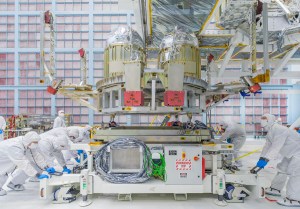
Discover More Topics From NASA
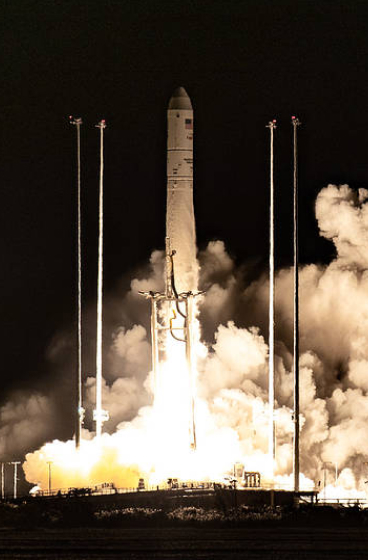
Solar System
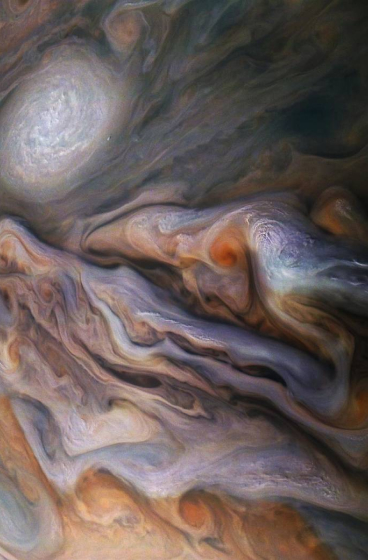
State of the Consumer 2024: What’s now and what’s next
If you think you know consumer behavior, think again. Middle-income consumers are feeling the squeeze and worrying about inflation but aren’t holding back on splurges. Rather than sticking to tight budgets in retirement, aging consumers are splurging too. Speaking of older shoppers, it turns out that the brand loyalty they’ve long been known for is a thing of the past. And young consumers in Asia and the Middle East are more likely than those in Western markets to switch to higher-priced brands.
These are just some of the large-scale shifts taking place in the global consumer landscape. Consumers have continued to defy expectations and behave in atypical ways , keeping consumer goods manufacturers and retailers on their toes. More than ever, companies that cultivate a detailed, up-to-date understanding of today’s and tomorrow’s consumers—who they are, what they want, and where and how they shop—will be best positioned to succeed.

You’re invited
Join us for a discussion of our report, Rescuing the decade: A dual agenda for the consumer goods industry , on June 26 at 10:00 a.m. ET | 4:00 p.m. CET.
In this article, we draw on our ConsumerWise research to delve into nine trends shaping the global consumer sector and four imperatives to help consumer businesses move from “now” to “next.”
Nine trends defining the global consumer market
To forecast where the global consumer landscape is heading, we surveyed more than 15,000 consumers in 18 markets that together make up 90 percent of global GDP. Their answers revealed surprising nuances about demographic groups, seemingly contradictory consumer behaviors, and categories poised for growth.

Who is the future consumer?
Consumers no longer fit into traditional archetypes. Some of the most influential consumers of tomorrow are currently underserved.
1. Young people in emerging markets. By 2030, 75 percent of consumers in emerging markets will be between the ages of 15 and 34. Our data indicates these consumers may be optimistic about the economy and willing to spend.
Among this group, young consumers aged 18 to 24 in Asian and Middle Eastern nations, such as India and Saudi Arabia, will be particularly important to consumer businesses, given their pent-up demand and willingness to spend. These consumers indicate a strong desire to spend on premium products, so much so that they are up to two times more likely to trade up—meaning opt for higher-priced brands and retailers—than young consumers in advanced economies. They are also up to three times more optimistic about their respective economies (Exhibit 1). This optimism could translate into higher levels of future consumption. It’s worth noting that young consumers in Latin America are actually less likely to trade up than young consumers in other emerging economies.
2. Retired and ready to spend. Longer life expectancies and declining birth rates, particularly in advanced economies, are pushing the global population of people older than 65 to increase at a quicker rate than the population of people younger than that age. 1 “Ageing,” United Nations, accessed May 29, 2024. Yet for all the data relating to aging populations, older consumers are often misunderstood.
Despite the financial constraints that may accompany retirement, aging consumers across all income levels are willing to spend on discretionary items. In experiential categories such as travel, older consumers’ intent to splurge is even higher than that of millennials, who have historically been big travel spenders. High-income baby boomer and Silent Generation consumers (those whose household incomes exceed $100,000) are a sizable cohort in the United States, making up 30 percent of the market—and they’re more likely to spend on discretionary purchases, such as home improvement and gardening, compared with lower-income consumers their age.
In emerging markets, it’s not just younger consumers who are ready to spend but their parents, too. Wealthy aging consumers in emerging markets are more optimistic, expect to spend more on discretionary items, and plan on treating themselves more than wealthy aging consumers in advanced markets. In one of the starkest examples, 42 percent of wealthy aging consumers in emerging markets 2 Forty-two percent of consumers in Brazil, China, India, Mexico, and Saudi Arabia. said they expect to spend more on entertainment, compared with 7 percent of comparable consumers in Europe 3 Throughout this article, we will refer to “Europe” to indicate France, Germany, Italy, Spain, and the United Kingdom. and 11 percent in the United States. We see a similar willingness to spend in categories such as home improvement, airline flights, and hotel stays. Consumer businesses that market exclusively to younger consumers are thus missing out; they ignore wealthy aging consumers at their own risk.
3. The squeezed-but-splurging middle. We expect that cost-of-living increases in advanced economies will continue to put pressure on middle-income consumers. While conventional wisdom would suggest that these consumers will clamp down on discretionary spending as a result, our data reveals something different: instead, middle-income consumers in Europe and the United States say they plan to splurge on discretionary items at a rate that is comparable with that of high-income consumers.
This intent to splurge appears across various categories, including experience-based categories such as travel and dining out, as well as groceries and discretionary goods. Middle-income consumers might typically be expected to delay purchases during economically challenging times, but our research shows that they’re only slightly more inclined to delay purchases than wealthier consumers. They’re also not much more likely to trade down than higher-income consumers.
What will consumers want?
What consumers want is changing too. Weakened brand loyalty, affordability over sustainability, and heightened interest in wellness products and services reflect the preferences and priorities of consumers across ages and geographies.
4. Brand exploration. When they couldn’t find exactly what they needed because of pandemic-era supply chain disruptions, roughly half of consumers switched products or brands. That behavioral change has proved quite sticky: consumers continue to be open to exploring alternatives, and brand loyalty is fading across demographic groups.
In advanced markets, over a third of consumers have tried different brands, and approximately 40 percent have switched retailers in search of better prices and discounts (Exhibit 2). Inflation and economic uncertainty are almost certainly inducing this behavior.
This weakening of brand loyalty is not limited to a specific age group. In the past, older consumers remained consistently loyal to their preferred brands, but today, they’re just as likely to embrace new brands and retailers. In Europe and the United States, Gen Zers and millennials are only slightly more likely than older consumers to trade down to lower-priced brands and retailers.
One beneficiary of this rampant downtrading is private labels. Thirty-six percent of consumers plan to purchase private-label products more frequently, and 60 percent believe private brands offer equal or better quality.
5. Sustainability: Value upstages values. In recent years, young consumers in our survey data said they prioritized sustainability considerations when making purchases. It wasn’t all talk: in the United States, sales of products with sustainability-related claims outpaced sales of products without such claims.
While young consumers still say they care about sustainability, they are now making clear trade-offs in the face of economic uncertainty and inflation. In Europe and the United States, fewer Gen Zers and millennials ranked sustainability claims as an important purchasing factor at the beginning of 2024 than in 2023 (Exhibit 3).
Younger consumers aren’t just deprioritizing sustainability in their purchase decisions; they’ve also become less willing to pay a premium for sustainable products. In Europe and the United States, the percentage of young consumers willing to pay a premium for products with sustainability claims declined by up to four percentage points across product categories. Among these consumers, only a very small percentage were willing to pay a premium for personal care and apparel products with sustainability claims.
6. The worldwide wellness wave. We estimate the global wellness market to be worth more than $1.8 trillion , growing 5 to 10 percent annually. 4 “ The trends defining the $1.8 trillion global wellness market in 2024 ,” McKinsey, January 16, 2024. In advanced economies, health and wellness products and services have been in high demand over the past several years. Today, these categories are also growing quickly in emerging markets, and in some cases, growth in intent to spend on health and wellness products in emerging markets is outpacing growth in advanced markets.
In emerging markets such as China, India, and the Middle East, the percentage of consumers who intend to increase their spending on wellness products and services is two to three times higher than in advanced markets such as Canada and the United States (Exhibit 4).
It’s not only Gen Zers and millennials who are propelling growth in this space, but also Gen Xers and baby boomers. To be sure, regional variations appear. According to our research, for example, 63 percent of baby boomers in China intend to spend more on fitness in the near future, while only 4 percent of the same cohort in India plan to do so.
Weight management products and services, in particular, could help induce growth in the wellness sector over the next several years.
By 2035, just over half of the world’s population is projected to be overweight or obese. At the same time, the availability of weight management drugs is expected to grow as more health plans approve coverage, doctors are able to prescribe them for more uses, and doses are made available in pill form. Adoption of these drugs, compared with other weight management solutions (such as dieting or exercise), will depend on cultural norms and beliefs, too. Less than 30 percent of Chinese and UK consumers consider weight loss drugs to be very effective . 5 “ The trends defining the $1.8 trillion global wellness market in 2024 ,” McKinsey, January 16, 2024.
7. Wellness for women. Investments in women’s wellness are also growing . Consumers in both advanced and emerging markets are indicating a greater interest in spending on women’s wellness products and services, as well as on adjacent personal-care categories. We estimate that closing the women’s health gap could be worth $1 trillion annually by 2040. 6 Kweilin Ellingrud, Lucy Pérez, Anouk Petersen, and Valentina Sartori, Closing the women’s health gap: A $1 trillion opportunity to improve lives and economies , McKinsey Health Institute, January 17, 2024.
A higher percentage of women in emerging markets (48 percent), in fact, indicate an intent to splurge on beauty and personal-care products and fitness, compared with women in advanced markets (27 percent). And young women are especially interested in wellness: Gen Z women across both emerging and advanced markets said they expect to spend more on personal-care goods and services, compared with Gen Xers and baby boomers. As innovation in women’s health continues to push the sector forward, we expect spending to increase as well.

Where will consumers shop?
Knowing what consumers want means little if businesses do not meet consumers where they are. Global migration patterns—both to and from major urban hubs—are changing where consumers spend their time and money in the physical world, while growth in social commerce accounts for new movement in the digital world.
8. The new urban hot spots. In both advanced and emerging markets, people are moving to seek out new opportunities and a better quality of life. In advanced markets like the United States, consumers are moving away from larger cities in the Pacific Northwest and the Northeast to “secondary cities,” or those with populations between 50,000 and 500,000 people. Two-thirds of the fastest-growing US cities are in the South and West. In these cities, the cost of living is lower than in larger cities, and remote work opportunities are plentiful. Millennials, Gen Xers, and boomers are propelling this trend.
Just because US consumers are moving to scaled-down versions of metropolises does not mean they are curtailing their spending: just as many consumers in secondary cities say they plan to splurge as do consumers in the largest American cities. Meanwhile, 1.3 times more consumers in secondary cities say they plan to splurge, compared with US consumers in rural areas.
Emerging markets will continue to see urban-population growth in both megacities and secondary cities as consumers move in search of better economic opportunities and improved well-being. By 2035, for example, 43 percent of the Indian population may reside in urban areas, up from 35 percent in 2018. In China, the percentage of middle-class households is expected to increase in both tier-one and tier-two cities as well as in tier-three and tier-four cities by 2030. And by 2040, there will be 537 million people in African urban centers, making the African urban population the largest in the world.
9. Social commerce takes flight. For several years, China has led the world in the adoption of social commerce, in which consumers browse and buy directly through social media and content creation platforms. Today, social-commerce markets in both China and India continue to mature, while those in other emerging-market countries—such as Brazil, Saudi Arabia, and the United Arab Emirates—are close behind (Exhibit 5). Consumers in these countries consistently spend more on purchases made through social media platforms, compared with consumers in Europe and the United States.
Attempts to grow the social-commerce market in the West have had limited success. Companies simply may have been too early to embrace this opportunity. We expect social commerce in the United States to expand to $145 billion by 2027, up from $67 billion today. 7 “ Social commerce: The future of how consumers interact with brands ,” McKinsey, October 19, 2022. Gen Zers and millennials are propelling this growth: they make purchases on social media four times more often than older generations do. More than a third of Gen Z and millennial survey respondents said they had made a purchase on social media in the prior three months.
Four imperatives to win the consumer of the future
In light of these nine forward-looking themes, what should consumer companies do? The most successful ones will be those that act on four imperatives:
Build microtargeting capabilities
About quantumblack, ai by mckinsey.
QuantumBlack, McKinsey’s AI arm, helps companies transform using the power of technology, technical expertise, and industry experts. With thousands of practitioners at QuantumBlack (data engineers, data scientists, product managers, designers, and software engineers) and McKinsey (industry and domain experts), we are working to solve the world’s most important AI challenges. QuantumBlack Labs is our center of technology development and client innovation, which has been driving cutting-edge advancements and developments in AI through locations across the globe.
Rather than putting consumers in predefined—and often outdated—boxes, companies should focus on microtargeting to build a richer understanding of consumer preferences. This involves taking a “smart reach” approach , whereby consumer businesses use their consumer data to target specific microsegments of consumers who may demonstrate particular shopping behaviors or preferences. Generative AI can help consumer businesses reach these microsegments at scale by increasing creative output and automating marketing outreach. Through microtargeting, companies can engage high-potential consumer groups—for example, younger people in emerging markets or wealthy aging individuals—and provide personalized experiences that build brand love and loyalty and propel future purchases.
Invest in wellness
A rise in both consumer interest and purchasing power presents tremendous opportunities in the $1.8 trillion global-consumer-wellness space. Consumer goods leaders have a chance to reevaluate their product development road maps and consider whether they have more opportunities to introduce personalized-wellness products to priority consumer groups. Consumers across the globe want data- and science-backed health and wellness solutions. Best-in-class companies should evaluate opportunities to lean into these offerings and other wellness growth areas (such as women’s health and healthy aging).
Propel the social–digital experience
Companies should take steps to engage with consumers on social media and other digital platforms. This involves identifying the right channels and platforms, creating attractive content, and tailoring strategies to meet evolving consumer needs. This is especially important as industry lines blur (for example, as consumer companies enter the healthcare space and vice versa) and as ecosystems (networks or partnerships that cut across different industries) become more important.
We see innovative, international companies testing new approaches to social commerce to connect with consumers on a local level. Some are mobilizing local key opinion leaders to precisely target consumers and create viral digital campaigns that resonate with them. Social media and private chats through platforms such as WeChat help to continually engage consumers.
Offer premium products where they matter
Offering premium products in relevant categories can help improve brand loyalty. Consumer brands should identify which categories are ripe for this, such as experiential travel—where splurge activity is common even across middle-income and aging consumers. Conversely, some categories are more suitable for value plays based on trade-down behavior or frequent brand exploration. Integrating loyalty and pricing strategies , instituting pricing tiers, and tailoring product assortments at the local and channel levels are ways that consumer businesses can provide value to consumers, while also managing economic pressures.
In this consumer landscape—one in which standards, complexity, and stakes are all higher—leaders should understand the new nuances that define who the “next” shoppers are, what they care about, and how they shop. These insights, which should then inform strategic category and channel investments, can lead to long-term, profitable growth and sustained competitive advantage.

The authors wish to thank Cait Pearson, Heather Gouinlock, and Keir Sullivan for their contributions to this article.
This article was edited by Alexandra Mondalek, an editor in the New York office.
Explore a career with us
Related articles.

The world of ‘ands’: Consumers set the tone

Winning in loyalty

Catering to Asian consumers

IMAGES
VIDEO
COMMENTS
Research topics about space are relatively easy to find considering the broad research areas, which include: Earth observations, Geodesy, Atmospheric Sciences, Space physics, Planetology, Astronomy, Materials sciences, Life sciences, and Physics. Space research paper topics must stimulate and birth inquiry and answer compelling questions.
Here are some tips to help you write space research papers: Choose a Narrow Topic: Space is a vast field with numerous sub-disciplines. Narrow down your topic to something specific and manageable, ensuring that it aligns with your interests and expertise. Conduct Thorough Research: Before you start writing, immerse yourself in the existing ...
A review of the recent space exploration breakthroughs. The moon landing. The Mars landing of space rovers. A deeper look at the history of astronomy. Reviewing the heliocentric model of the galaxy. Analyzing the lifecycle of a star.
Type at least 3 characters. Reach for the stars: Research Topics on space exploration. With recent advances in commercial space exploration, we have curated a list of our best Research Topics on outer space. Explore collections edited by experts from NASA, The Goddard Space Flight Center, Space Science Institute, German Aerospace Center ...
Astronomical Spectroscopy: Decoding Light From Distant Stars. Interplanetary Dust: Studying the Smallest Particles in Our Solar System. Neutrinos From Space: Detecting Subatomic Particles From Beyond our Galaxy. Exoplanet Hunting: Techniques and Discoveries. 185 astronomy research topics explore celestial objects, phenomena, and processes in ...
Our article explores ten key astronomy research topics, each offering a gateway to understanding the complex phenomena that govern the stars, planets, and galaxies, inviting readers to dive deep into the wonders of space. Gain insights into the complex forces shaping the cosmos, from the smallest particles to the largest structures.
Research Topics. Scientists and engineers at the Center for Astrophysics | Harvard & Smithsonian collaborate across a broad variety of scientific disciplines, from astronomy and astrophysics to related areas of physics and geophysics, in advancing humanity's understanding of the universe. Learn more about the full spectrum of research covered ...
Research Topics List. JPL's charter is to conduct robotic space missions for NASA, to explore our own and neighboring planetary systems, understand the origin and evolution of the universe and make critical measurements to understand our home planet and help protect it. We do this by developing integrated capabilities in engineering, science ...
Research at KIPAC is revealing the lifecycle of galaxies: how galaxies were born in the darkness of the early universe, how their different components interact as they live and grow, and how they die. KIPAC scientists are studying early galaxies with computer simulations to understand the formation of the first galaxies and stars, and use a ...
Space physics is the study of the natural phenomenon that occur in our solar system. Specifically, the sun, the particles and radiation it creates and how these affect the planets. This includes ...
Here are great astronomy research topics to consider for your school or university paper: Gravitational waves and their impact on Astronomy. Stellar evolution and life cycle of stars. The role of magnetic fields in shaping celestial objects. The role of magnetic fields in star formation. Origin and evolution of supermassive black holes.
Space Exploration Accidents: Challenger and Columbia. The failure in the joint of the elements of the rocket motor caused the Challenger catastrophe. The analysis of the accidents led to the development of a number of recommendations. A Trip to Mars: Approximate Time, Attaining Synchrony & Parking Orbit.
Ideally, it should capture the main message of the paper, the 'narrative', or story, in around 15 words. The title needs to be accurate and needs to match the abstract and the rest of the ...
Astronomy Research Topics. There are a wide variety of astronomy research topics that can confuse you on which is the best for your schoolwork. This collection of topics is based on planets, gravity, and sub-physics. Evidence and assumptions based on Pluto planet. How does the space race have an impact on the cold war.
Recent Research. Scientists around the world make use of the observations collected from NASA's heliophysics missions to study space around Earth, around the Sun and throughout the solar system. Read on for a dive into recent papers published on a wide variety of topics: from the way material in the Sun roils to create a constantly-dancing and ...
To perform descriptive analysis of the income allocated to the space tourism and the current occupation of a potential space tourists. Geometry, Space, Manipulative, and Technology. In this research report, the focus of the study will be centered on the topic of geometry, space, manipulative, and technology.
HERMES (Heliophysics Environmental and Radiation Measurement Experiment Suite) Herschel Space Observatory. HETE-1 (High Energy Transient Explorer 1) HETE-2 (High Energy Transient Explorer 2) High-Tech Computing. Hinode (Solar B) Hipparcos. Hi-Rate Composite Aircraft Manufacturing. Hispanic Heritage Month.
Technologies for Sustainable Space Exploration and Terrestrial Sustainability. Parag Vaishampayan. Jared Broddrick. John Hogan. 9,539 views. 4 articles. An exciting journal which advances our understanding of space technologies and their commercialization - from weather forecasting to satellite navigation.
The Space topic features the latest news in astronomy, cosmology, planetary science, exoplanets, astrobiology and more. ... membership organization dedicated to public engagement in scientific ...
Explore the latest full-text research PDFs, articles, conference papers, preprints and more on SPACE EXPLORATION. Find methods information, sources, references or conduct a literature review on ...
Astronomy is a branch of natural science that deals with celestial objects, space, and the physical universe as a whole. Students use a combination of mathematics, physics, and chemistry to explain the origins and evolution of planets, stars, nebulae, galaxies, and comets. Ancient civilizations made observations and measurements of the night ...
Includes over 2,000 journals and 35,000 books published by Elsevier Science and its subsidiary publishers, including Academic Press, Cell Press, Pergamon, Mosby, and Saunders journals. Coverage is particularly strong for the life and physical sciences, medicine, and technical fields, but also includes some social sciences and humanities.
Tucked away with each rock and soil sample collected by the agency's Perseverance rover is a potential boon for atmospheric scientists.. Atmospheric scientists get a little more excited with every rock core NASA's Perseverance Mars rover seals in its titanium sample tubes, which are being gathered for eventual delivery to Earth as part of the Mars Sample Return campaign.
Hayley Arceneaux had plenty to worry about before journeying into space for the first time. Her health history was unusual for a space traveller: she would be the first childhood cancer survivor ...
Space Exploration Science Projects. (41 results) Space exploration is an exciting and wide-ranging area. Getting into space (and back down) is hard, involving rockets and launch vehicles, satellites, spacecraft, re-entry systems, landers and rovers, robots, and orbital mechanics, not to mention hypothetical technologies like space elevators and ...
"Earth and space are an interconnected system that reaches from the heart of our solar system, the Sun, to the lowest reaches of the atmosphere where we live and extends to the edge of our heliosphere - the boundary of interstellar space," said Nicola Fox, associate administrator, Science Mission Directorate at NASA Headquarters in ...
Scientists probe a space mystery: Why do people age faster during space travel? Research finds bodies in space were stressed and showed dramatic signs of aging during the journey.
"It's a once-in-a-lifetime event that will create a lot of new astronomers out there, giving young people a cosmic event they can observe for themselves, ask their own questions, and collect their own data," said Dr. Rebekah Hounsell, an assistant research scientist specializing in nova events at NASA's Goddard Space Flight Center in ...
The structure and function of the kidneys is altered by space flight, with galactic radiation causing permanent damage that would jeopardise any mission to Mars, according to a new study led by ...
In this article, we draw on our ConsumerWise research to delve into nine trends shaping the global consumer sector and four imperatives to help consumer businesses move from "now" to "next.". Nine trends defining the global consumer market. To forecast where the global consumer landscape is heading, we surveyed more than 15,000 consumers in 18 markets that together make up 90 percent ...